#get that many moments with her. So there’s ambiguous scenes up to interpretation addressing a layered topic and like. Save me. Save me
Explore tagged Tumblr posts
Text
Falin who cares too much and too little - analysis
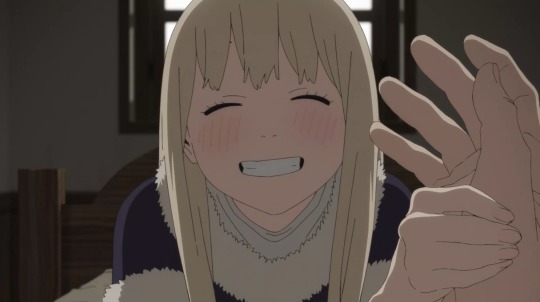
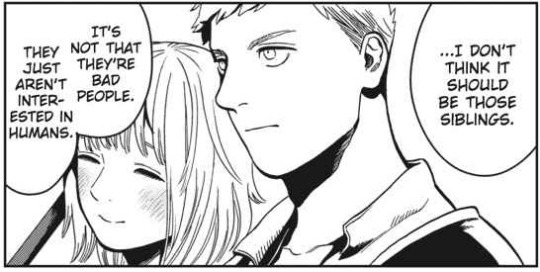
Been stewing on Falin thoughts for a while, I know I have an interpetation on her that differs from many but I’m jumping into the fray. I think there’s a lot to be said about what we do see of Falin. This shorter Falin analysis I made is heavily encouraged prior reading. This analysis mainly explores her complex relationship with caring and so it’s sort of structured in two halves, with Faligon at the crux of it all.
Falin cares too little :
A lot of people assign Falin a people pleasing mindset and I… Don’t agree. We never see her care at all about people in her town or at the academy not liking her.
We do see her worrying about what people think of her… ONCE. And Laios comforted her, told her they didn’t matter and she should be proud of herself. She latched onto that hard. That’s why this scene was so important to be included during the dragon fight, relationship-defining; it’s always been them against the world. She grew to not care what others thought, to only focus on her close loved ones. No one else matters.
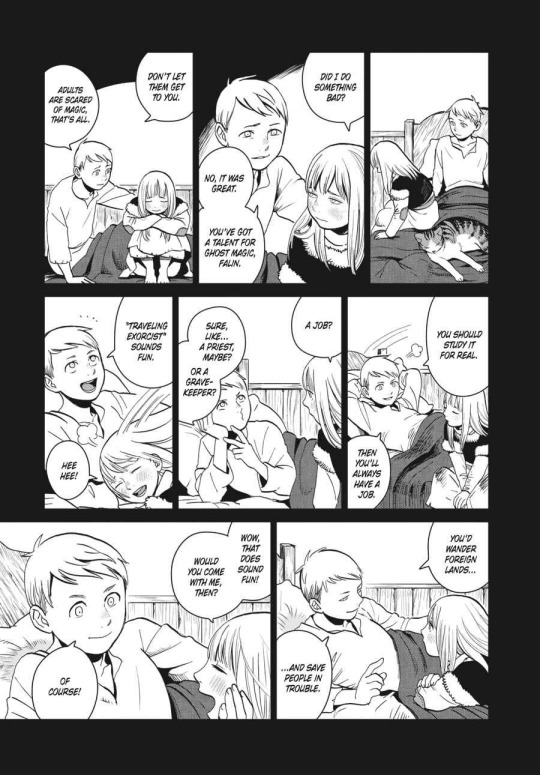
Laios’ words were her world. Her older brother who taught her how to feel comfortable with herself, who told her, you’re great, others are the ones in the wrong to not see that, I’ll always be with you, always be there for you. Older brother who always made great plans, who always knew more, who was better at wrestling to name the dogs, who she has always idolized. Laios who always spoke of traveling the world, to which she always said she wanted to follow. And she would, she’d follow him even if it meant leaving the academy and all she knew behind, she’d follow him to the ends of the world, and that’s what she did.
She didn’t care about showing to her classes or keeping up such appearances, she doesn’t even think of toning down her jumping into bushes when Marcille recoils, etc. She acts like an obedient pawn often, to her parent’s directives and then following Laios around no matter what he decides to do, but I don’t think the motivation is people pleasing, rather it’s being with & caring for her loved ones, and her go-with-the-flow attitude enhances the impression. Not that it’s as simple as that, mind you, but let’s talk about this for now.
Falin is perceived as selfless because we, the audience, have our perspectives revolving around the main people in her life (Laios, Marcille). They’re the ones she’s devoted to and people who care about her back a lot too, but to people like her classmates or the towspeople she probably must have seemed like someone who didn’t care about the people around her or her surroundings a lot, who just went on alone and did her own thing.
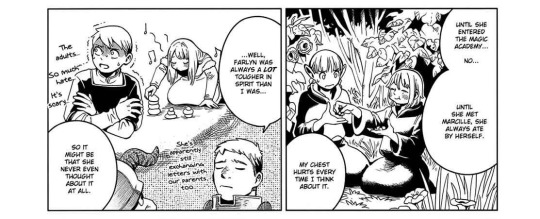
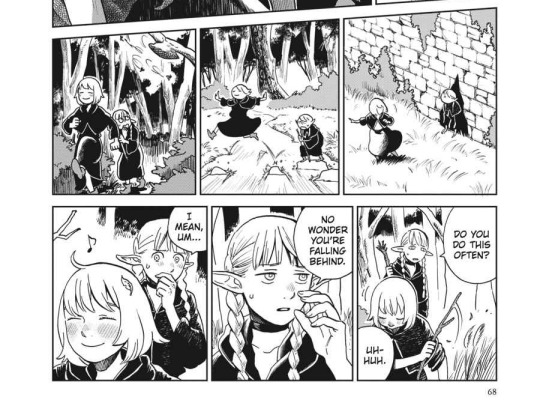
What matters to Falin? From what place does her kindness come from? Is a part of her keeping up appearances? And I think that’s the point, the horror of Faligon as well, that we can’t tell just how in control Falin the person is as the chimera (because we are shown that she’s in there, we just don’t know at what degree), that we don’t know her enough to be able to tell when she’s at her most genuine, her most raw. That even if you do settle on none of her being present as Faligon, we have to at least consider it, consider that she may be able to do something like this and have a part in it, brutal and uncaring. That even the lenses we see her through, the people who love her, may be unreliable.
And this is what’s very interesting about her too, she truly is so idealized by people around her as a saint. She’s so good and kind and caring to everyone etc etc etc. Laios, Toshiro and Marcille all see her as the paragon of goodness in the world. More cynical characters like Namari and Chilchuck have more layered opinions on her, the latter finding her somewhat unnerving because he can’t read her well. But then with that one flashback scene we see that… Her priorities are intensely focused on Laios and Marcille, she doesn’t care all that deeply about anyone other than them (+ maybe her parents). The rest of the party is in the same danger here but only Laios and Marcille who she’s speaking to get the special ,ention, and if they don’t cross her mind then of course she’d be ready to sacrifice strangers through a risky teleportation. That doesn’t make her not kind or caring!! Just that greater good isn’t exactly her priority. Any means is alright if the end result is her loved ones safe, it usually takes the form of healing and caring, but we see she’s ready to fight and make dangerous calls too. To me there’s this aspect to her that she isn’t as pure and magnanimous as everyone thinks she is, both in-world and interestingly enough meta wise as well, and there’s something interesting to that.
People pleasing implies a need to be liked, needs for the motivation to be that. A yes-man, etc. But if we analyze Falin, her general kind, smiling demeanor is more a matter of passivity I yhonk. Conflict avoidance is easier, so she’s friendly and hopefully things’ll be smooth sailing. It’s easy to be kind to classmates even if they act wary and rude if you don’t care about what they think either way. Of course she prefers good things happening to people over bad things, she is genuinely kind, but I think people tend to assign her a very grand altruistic way of life when to her the motivation is pretty self-centered. She doesn’t do what she does because she loves them, but because she loves them.
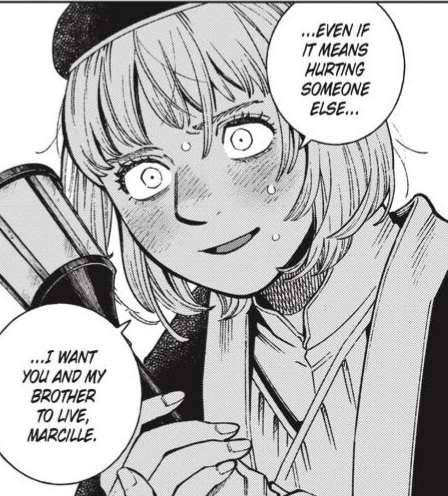
One situation that’s interesting to dig into for her way of thinking, and what I’m trying to get at, is Shuro’s proposal to her. I’ve seen people saying she hesitated because she didn’t feel comfortable saying no even though she wanted to, "I can’t say no, I don’t want to hurt him", something that sounds sensible and familiar, but it’s actually canon in the Adventurer’s Bible that the reverse was the case, that she didn’t feel comfortable saying yes. Because the offer was tempting, but it’d have been a loveless agreement on her end. And it makes sense she’d want to say yes too, like we see with the Toudens, marriage is very much a political strategical economical thing in their village, there’s even a bit on it on Laios’ Adventurer’s Bible profile about dowries, and both siblings were engaged very early. They lived poorly for a long time, it’s an enticing idea to marry rich, to have not only yours but your brother’s needs met forevermore easily, which at one point in their careers was their main worry and goal. Why shouldn’t she accept a life of leisure and wealth handed to her by a lovely friend?
So her hesitance was "yeah that’s convenient for me, but where it’s everything to him and heartfelt I’m able to be detached because I don’t care about it that much… Can I do that? I’m not reciprocating, not saying yes in the way that matters. Can I do that to him?" Very caring even though it’s not what you’d expect, isn’t it?
And central to my analysis, where I’m going with this is, I feel like that’s the thing with her character, that she doesn’t feel as strongly as she "should" sometimes, or feels a different way than she "should", or at least that she feels that way and others say she does. She didn’t mind suddenly leaving the academy, leaving Marcille behind and not seeing her for 4 years. She acted like it was no big deal that she sacrificed herself after getting resurrected after the red dragon fight. And in both those cases it upset the people around her greatly that she didn’t seem to get why it was such a big deal, didn’t seem to care about how they’d experienced her choices.
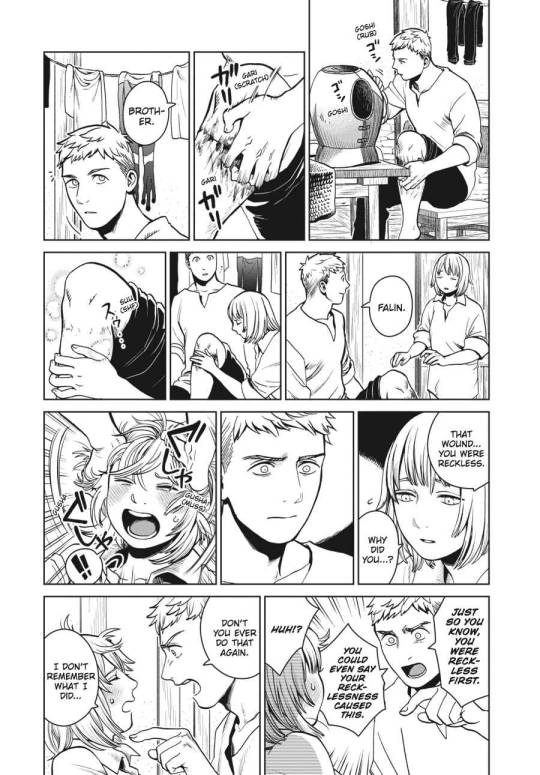
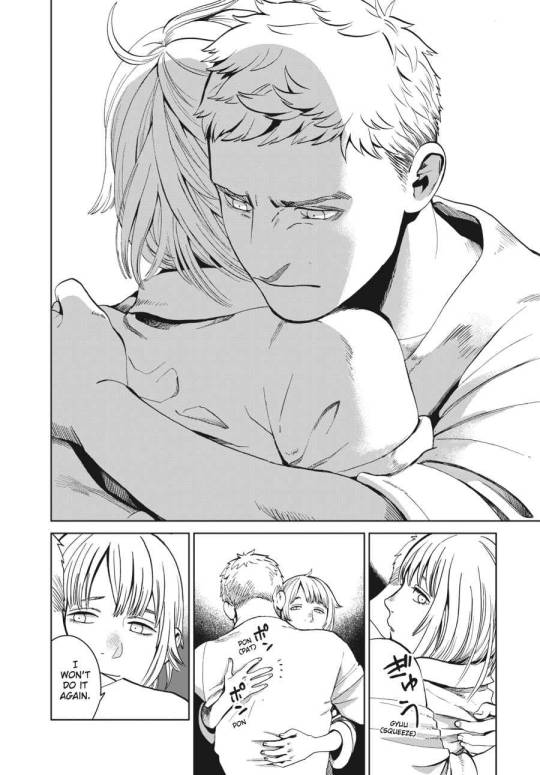
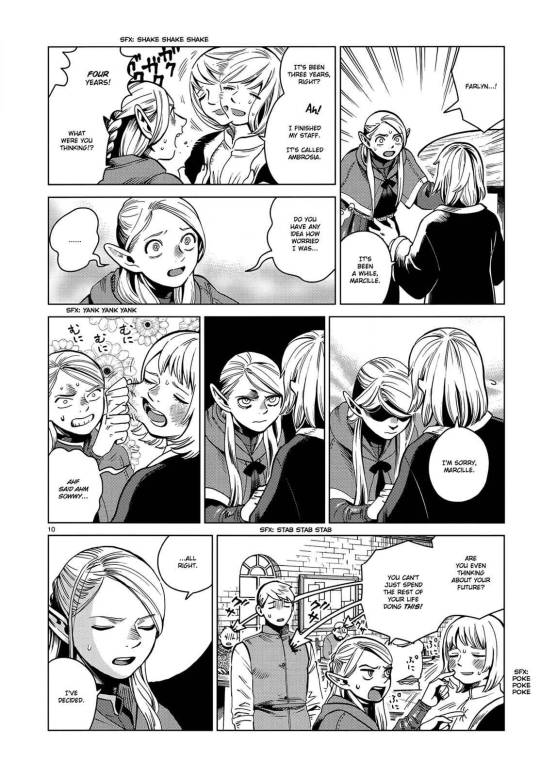
So it’s a tendency… And it’s not that she doesn’t care, it’s just that the way she measures what’s good for the ones she loves isn’t the same as what they themselves think it is (like Laios and Marcille not wanting to be apart from her). It’s an overt but quiet kind of care, it’s doing things like following them around and making sure they bathe and have a meal, even if that means she has to be dragged into misery too.
So yes she probably would know "not caring enough/the right way" is one of her perceived flaws, and that informs how she tries to handle her response to Shuro’s proposal. Her not wanting to accept like her first gut instinct, is because she’s thinking about reciprocity, about if it’d be right to go into this knowing that they have different priorities and she might not be able to keep up with the type and amount of emotions he wants/expects from her. And that’s a big part of her character isn’t it, having expectations pushed onto her. Her trying her best, but in her own way that may seem odd or even unfeeling. Not unlike when she exorcised the ghost as a kid too, unblinking and matter-of-factly, and not seeming to understand why people stared the way they did.
Even though she answered his proposal only post-canon, she’d been pondering it for a while even pre-canon and the Adventurer’s Bible explanation was released midstory, so I’m hesitant to assign her much growth about her hesitation and what I went on above, since she still didn’t react "right" with Laios after the red dragon fight (even if she apparently doesn’t remember sacrificing herself) and put herself in that situation in the first place. She hasn’t finished her arc on that flaw of hers is what I’m saying, she for sure still has it, but I certainly think her thoughts on Shuro’s proposal shows awareness, both of herself and social.
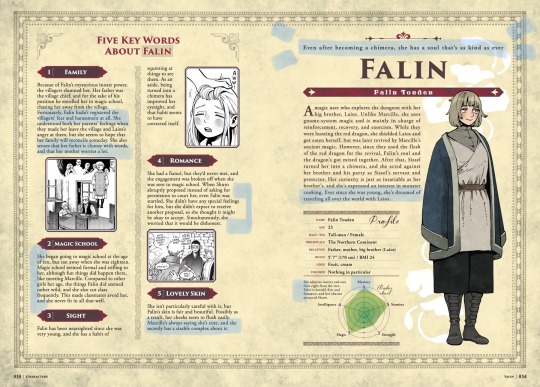
And awareness is a big analysis key word with Falin, especially here it can be hard not to conflate not caring with not knowing. How socially aware is she? It’s rather layered, because canonically she wasn’t aware of her ostracization in her hometown at all, and we’re not sure if she knew Shuro was interested in her before he proposed, but she generally seems more socially aware than Laios. She tags along on his caravan job to make sure he isn’t being mistreated (though doesn’t ask he get a salary), she catches social faux-pas more easily like in the genderbend magic mirror omake with Shuro, and interestingly enough she’s very good at empathizing with her parents and understanding their perspective. We see when she’s worried about Marcille coming that she does know about propriety and how appearances shape impressions. Being a chief’s daughter must at least have taught her a thing or two on that front.
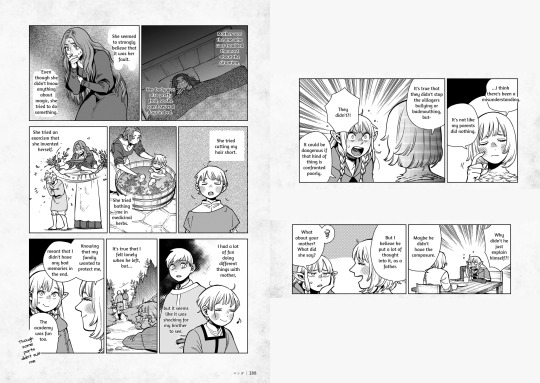
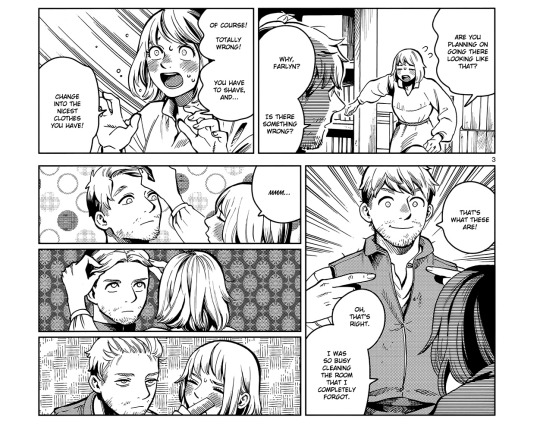
She never stands up for herself, but when it comes to defending others she worries, strategizes and explains.
And this sort of understanding is part of why I think she’d notice the expectations pushed onto her like I was saying earlier, notice how she makes people feel when she’s careless. But if she changes anything about herself in response to noticing is for her to choose, and generally I think it’s a sort of inbetween of yes and no: that she becomes more complacent but also more reserved, complying but by hiding more of herself passively. She’s not sure wether to accept or reject Shuro’s proposal, doesn’t want to lead him on? She’ll just be taking a while to silently consider it, try to keep things as they are for the time being. The third, less conflicting option. She doesn’t feel heard by Marcille who keeps infantilizing her? Just bear with it. Retract yourself emotionally. Settle for it.
We see that when she was young she had a tendency to not read a room, and I think that’s here too. She doesn’t get why her nonchalance upset others but that doesn’t change that she doesn’t want them upset or hurt, so she tries, albeit in maybe a roundabout way. She always had a hard time deeply connecting with people, often keeping herself some amount of emotionally distant: erasing herself from the equation, from the two-way trade that relationships are and making it a onesided thing instead, where all their needs and emotions are directed towards her but she only lets out a bit of her own show. She takes everything upon her and deals with it and tries not to give others this same burden, though not on a conscious level, it’s just that she’s learned growing up that she doesn’t have much agency.
Like I went into with my analysis linked at the beginning, I think Falin is used to just taking what she can get and not asking for more, when it comes to social bonds. She’ll take spending time with her mother no matter what it is they do, she’ll follow Laios to the graveyards and stick by him even when he’s pushing her away (because he doesn’t want her borrowing his book or "No copying!" or such). Her father was always distant, cold and uncommunicative, her mother was considered sick from anxiety and the exorcism attempts were the main way they spent time together, at dinner tables there were only her and Laios. The dogs picked on her too even if she loved them— And so did the townspeople, maybe that being normal to her at home is why she didn’t notice the ostracization she suffered.
She’s always been the last to be asked about decisions or what she wants, never asked to play with at recess, neither her father or Laios asked before sending her to the academy or leaving the village. At home, in the hierarchy she was considered to be below the dogs by the dogs themselves, as someone they can disrespect. Dogs learn from example and behavior, so this means Falin must have been pushed around a lot, and that the family didn’t try hard to rectify the dogs’ misconception, likely worsened by Laios regularly wrestling with her as a competition.
So for example when Falin showed Marcille food, it was her way to implicitly ask to have lunch with her without voicing that question, without daring to take up space. Someone’s presence isn’t something you ask for, it’s something that’s bestowed upon you, you can follow them around but you can’t ask them to stay or to come with.
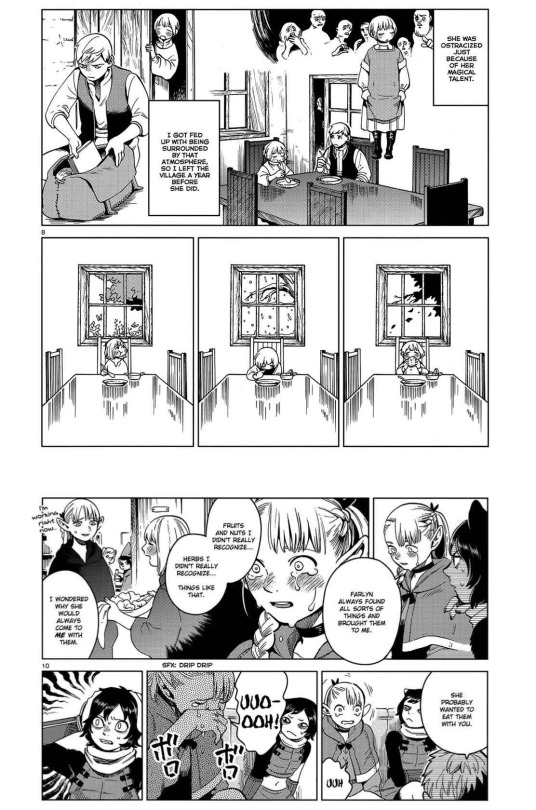
She’s used to her needs and wants not being listened to, so she’s learned to have less wants. Caring less about herself, caring less about other people beyond her safe zone, was a defense mechanism in part. She has a sense of learned helplessness too, like how when Marcille came to take her away from Laios, even though she didn’t want to leave with Marcille it felt so determined and unshakable to her that whatever Marcille decided Falin would have to comply with.
And still, it’s the "marrying you would be awfully convenient if it wasn’t that I’d feel guilty for not loving you back, the way you wanted me to when you proposed to me" and the "I don’t regret leaving the academy and leaving you behind without goodbyes but I’m sorry that you’re so much more upset about it than me". It’s the guilt of not loving people back the way they want to be, with the same intensity or fervor.
It’s the autism it’s the aroace of it all, it’s the emotional stunting and confusion but the pit in your stomach telling you you did something wrong again. The no object permanence even for people you love even for 4 years, it’s the feeling like you’re somehow at fault for someone having fallen for you and not knowing what to do with any of it. I’m not joking btw it isn’t uncommon for autistic people to not see their close friends for a long while, not having missed them all that much and for that to be really hurtful for the other if they notice/ask about it. "Hiii bestie! Oh umm you’re uh more emotional about this than I expected, hopefully you won’t feel alienated by me not feeling as intensely about it…"
So… Yeah. I think she thinks of things and relationships in a different way than most people, and beyond "good things happening to people is good" I don’t think she actually cares about people all that much. I’d argue that Laios shows more desire to connect with others and make relationships. And just like with Laios and his own issues with humans, that doesn’t mean her kindness is a lie or ungenuine or worthless! It just means that like, well it’s pretty straightforward really, she’s not all that social and doesn’t see casual bonds as meaning all that much and whatnot. She does want to see people happy, but it’s not as much like… A conviction or goal. She’s too laser focused on a select few people. "It’s not that they’re bad people, they just aren’t interested in humans."
And sometimes it feels like people get defensive about Falin in a meta way too, like if you ever so much as imply Marcille isn’t her whole world or that she isn’t the kindest soul out there then you’re saying she doesn’t care at all or she’s evil. And that’s actualy exactly the sort of vibe I wanted to get through with my analysis above here actually haha, that she does care and she is kind but it’s not in a way that’s quantified or understood in a way that makes people feel comfortable. In a way, that makes people feel insecure because they don’t have the same logic as her, don’t show love the same. And I think this is another stellar depiction of autism, of parts of it that feels unpalatable to many, if I’m making sense. The fandom idealizes her as well, which isn’t uncommon or surprising for the character embodying the trope of the perfect beloved to rescue.
And disclaimer, as I said in the tags I feel like the details of Falin are pretty vibe based when it comes to analysis, there’s absolutely a valid angle where she does super care about everyone always, feel free to disagree with me on the overarching angle of my analysis. There’s enough supporting evidence to tip the balance either way I think, and the reason I’ve chosen this angle is I feel it’s more compelling for the themes in Dunmeshi of idealization and being different, of desires vs wants, and because I think it neatly ties up Falin’s character arc as I’ll go over throughout the next section…
So.
Not feeling as much as she should. And……. Is this not Faligon pushed to the max?
You can’t tie down a dragon. As the chimera, she gets to just not care about everyone else and be on her merry way.
Part of it I think is finding comfort and freedom in the mindlessness, in not having the burden of feelings and connections and a consciousness (despite still ending up seeking those in a stranger, Thistle). Like when she’s dead in the purgatory as well, she gets to just… Hang around and do whatever. Similarly to when she played in the forest instead of going to class in her academy days. That’s what freedom and peace of mind looks like to her. Why she decides to roam post-canon, if only now with the goal to find herself instead, with her mind in tow and somewhere to go back home to.
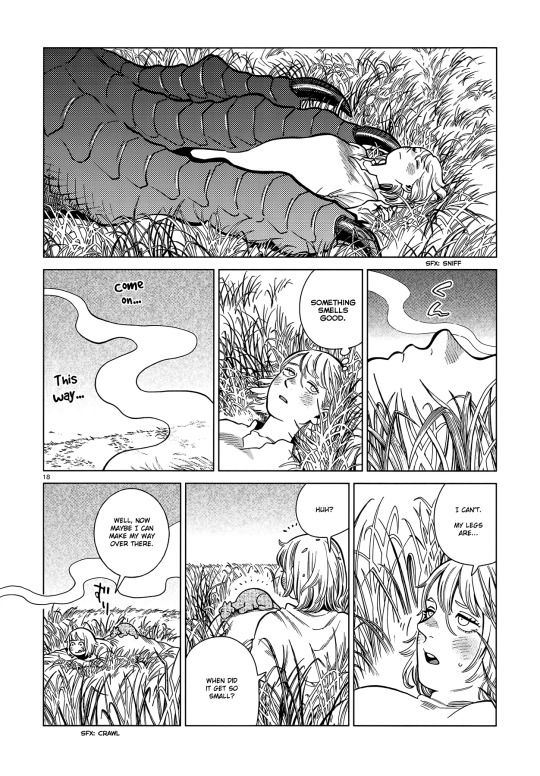
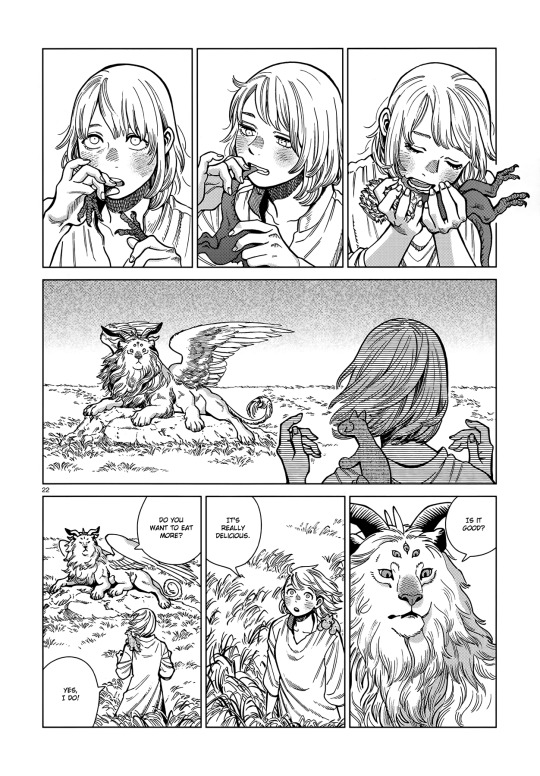
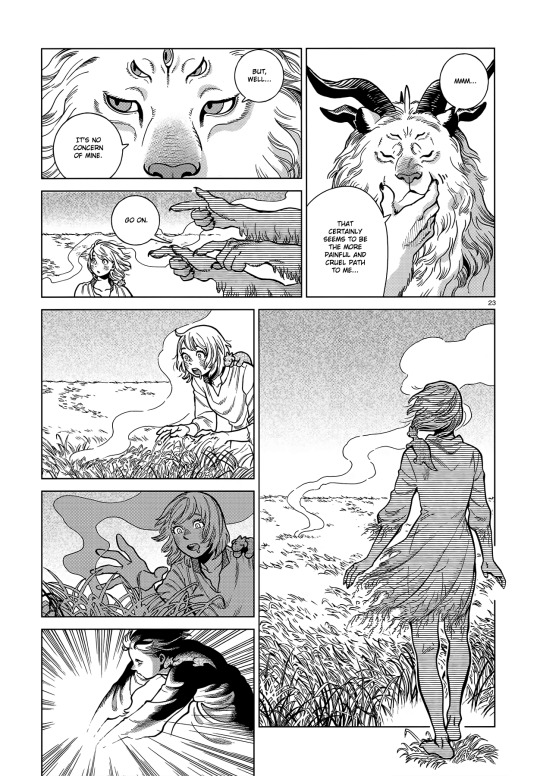
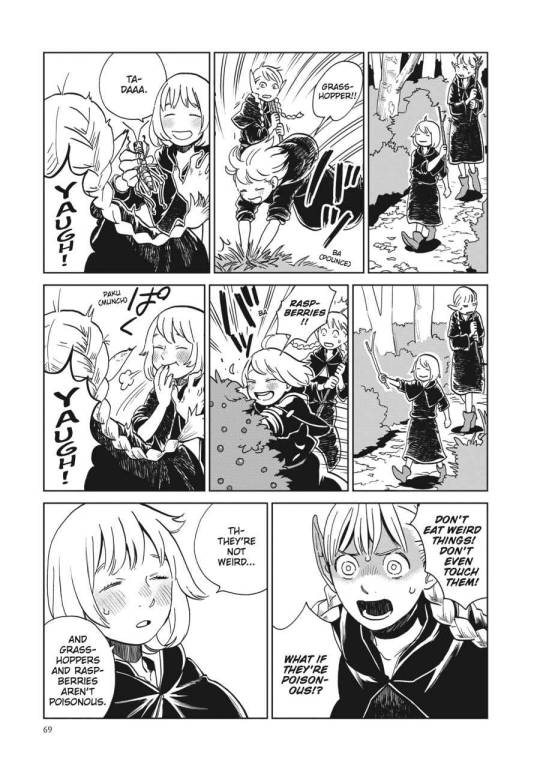
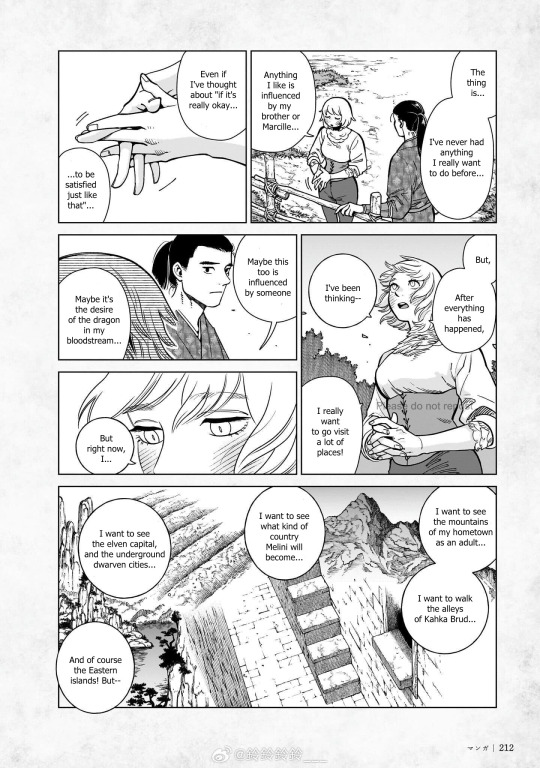
There’s excellent analytic framing out there about how of course, Dungeon Meshi has a big theme of grief and letting go, and… Falin was always a symbol narratively, idealized by characters and often underconsidered by them despite their love. It was Falin’s choice to sacrifice herself for Laios, she thought it was worth it, knowing that it would be her end. Her resurrection and the process of it intertwining her soul with a dragon’s wasn’t done with her consent, and the subsequent opening it gave her to become a chimera puppet. She’s stripped of her agency consistently, and so… It’s very noteworthy that the final choice, of wether to go back to life or to stay dead, in that purgatory scene, was up to her. And she chooses life, but I do think about her in those fields and how at home she seemed there. Peaceful, by herself in a vast calm expanse she could explore, free.
Personally, I think freedom is Falin’s own subconscious selfish desire. And though to us becoming the chimera is obviously a shackle, I think it felt like freedom to her somewhat, too.
And if you think I’m going wildly off the rails here I want to talk about Laios’ wish of becoming a monster. And to be clear before getting into it, being mentally a monster is absolutely a big part of the appeal for Laios, it’s something that’s consistently referred to, something especially pointed out in the werewolf monster tidbit with Lycion. Right panel is from that, but left panel is from the extra with Izutsumi where Lycion talks about suppressing souls in a beastkin body, the human or the beast soul.
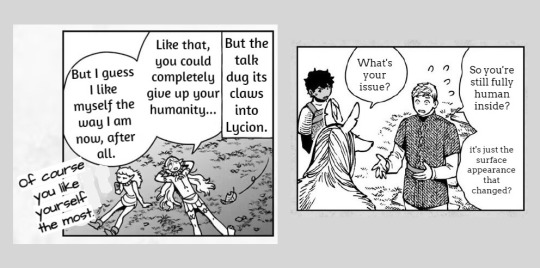
Finding comfort and freedom in being mindless, less sentient, less aware? While being unaware in her hometown might have saved Falin a lot of heartache although perhaps stunted her emotional growth, it’s always been Laios’ curse.
Actively, through his choices, he seeks to grow closer to people, to form deeper bonds, to understand and be undertood, but… On a deep seated level, what he desires is to leave humanity and civilization behind. He has an irrational hatred for humans, born from the trauma of ostracization, being different, being beaten up and rejected consistently through his life. Running away from problems is easier. He wants to be free from being a social animal from a social species who has deemed him the black sheep, he thinks it’d be simpler to just leave it all behind, people and his own humanity. At its core, to Laios becoming a monster is a power fantasy, a coping daydream of "if only I could be strong enough to never be hurt again, the power to destroy anything I want, the power to go somewhere better, if only it was possible for me to never feel hurt again. If only I could be someone, something, that can never be hurt". "If there’s someone you don’t like, you can gobble ‘em up in one bite. If you could fly, you’d be able to leave this village right now." It’s a childhood fantasy, from a deep sense of being misplaced and a desire to be able to stand fearless, thinly covering up resentment that Laios represses.
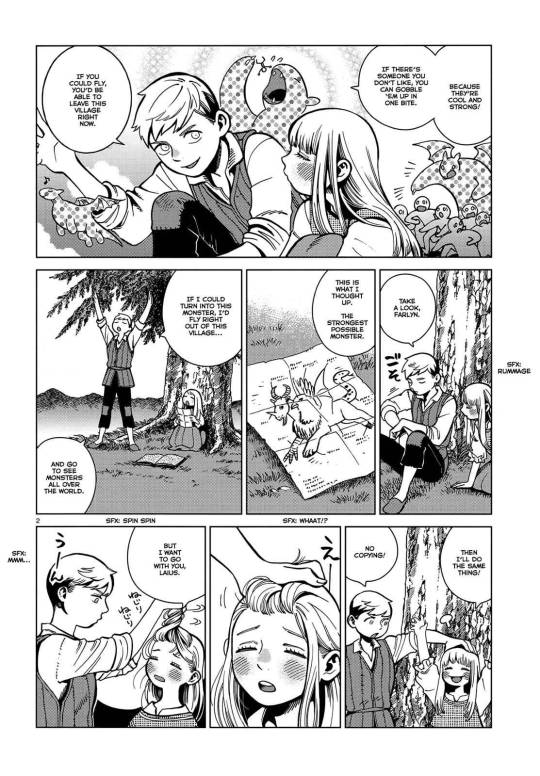
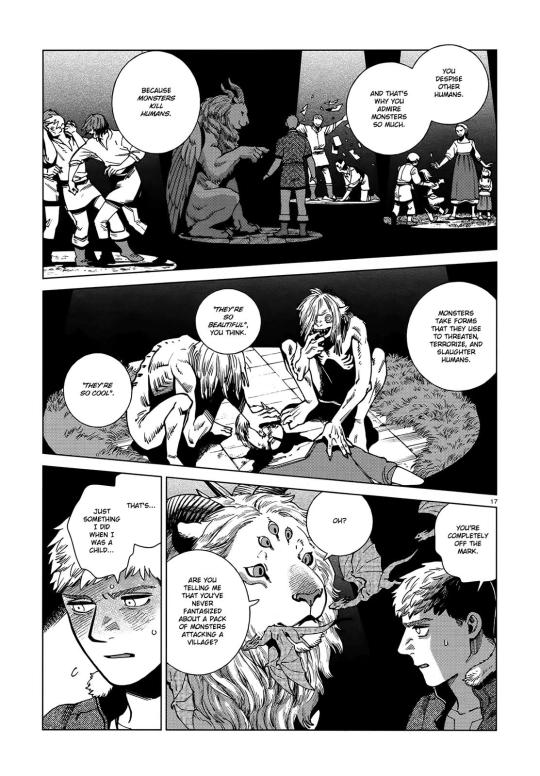
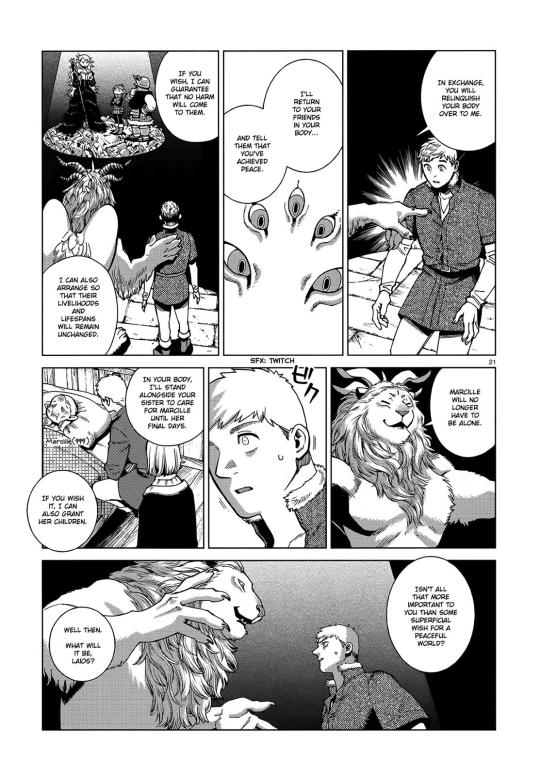
But you’ll notice, when the Winged Lion is enticing him in the last page, even now with his lifelong wish of becoming a monster on a silver plate, he still cares about his friends. He still has that sense of responsibility to his friends, doesn’t want to leave knowing they’ll be in danger and alone. The offer that his friends may be left unharmed is already good, but Laios also visibly flinches when the Winged Lion offers to specifically care after Marcille and rid her of her biggest fear. Laios’ care runs that deep. Not unlike with the succubus, he resists temptation until he gets reassured that everyone will be okay. But see, what he desires isn’t to stand alongside Marcille until her last days, it isn’t to stay and see how well his friends will live, it’s to go. It’s to leave. It’s to fly away, a monster both in body and mind. He wants to be free from caring here, wants to not have to worry about his friends, wants to just go do his own thing, but for that he needs to feel safe in the belief that said friends will be safe even without him being there to see it, because despite everything else he cares, he does. It’s again that dichotomy about caring and wishing you didn’t, or not caring and wishing you did.
In the end, it’s Falin who achieves that wish. Both by becoming a chimera during canon, and by going traveling post-canon. In the latter, being both free of human relationships as something chaining you while still being uplifted by them, by the knowledge that there are people out there you love and that love you. It’s a theme that can also be connected with Marcille, because she gets anxious over people she loves getting out of her sight, worrying they’ll get themselves killed, that time is passing while they’re away from her. But before she can get to the point where she can both have her freedom and being uplifted by her social bonds, regaining both her individuality and her connections, she has to get a taste of just one at a time. Before they can find balance in her life, she has to see what it’s like to have what she’s never had on its own. Unapologetic freedom, and power.
No one can blame you for not caring enough or caring right if you’re a fricking dragon!!!! You make the rules when you’re a beast and you can just… Fly away. From anywhere, from anything. And if a dog bites you you can just crush it. Instead of being pushed around by the dogs because you’re at the bottom of the hierarchy, you’re now at the top, the one with the power to be heard and do what you want without consequences.
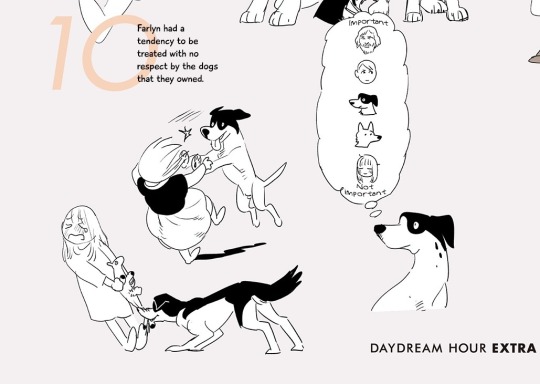
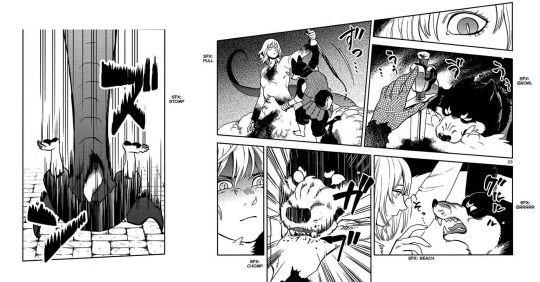
I think she’s on autopilot. I think she’s on autopilot a lot of the time, even before being a chimera, and it’s partly why her will is so weak compared to regular dragons. (Again, read my shorter analysis.) It’s familiar to slip back into the role of following someone around unquestioningly. And that’s what is weaponized when she’s a chimera, that instinct she’s been nursing all her life to unconditionally support, defend and follow someone. Only now, that someone doesn’t matter in itself, only the symbol of it. She doesn’t mind, either way is fine. Her will is weak after all, because she’s trained it to take as little place as it could.
Falin cares too much
She spends all her time caring for Laios and Marcille alternating that none of her care and emotional energy is left for others, including herself. So she had to get relieved of all of that for a bit, becoming the chimera so she could reset and recenter and remember that she, too, indeed, is there and an important part of her own life.
So you’re probably seeing the duality I’m talking about here, Falin is very self-sacrificial but for specific people in ways that they often don’t recognize or appreciate. She cares but selectively, both in people, putting all her eggs in the same baskets, and in the ways she cares after them. She doesn’t care a lot, but when she does she cares a lot. Falin doesn't have a lot of earthly attachments, but when she does, they're her world.
In canon her arc, especially post-canon, is to grow beyond Marcille and Laios. Her caring for her close loved ones held her back from looking after her own self-fulfillment needs. And this is what I mean when I say she cares too much; she could gain from caring more about the world besides Laios and Marcille, both lands wise and people wise. She cares too little, but her arc centers her flaw around caring too much instead. Her pitfalls that Kui highlight over the course of the story, while of course her selflessness is appreciated for how she saved Laios and everyone, on a personal level is shown to be self-effacing and damaging. She’s undermined by Marcille, without the courage to voice her thoughts and wants, she would dedicate her whole life to Laios. And I mean, it’s text, in the response to Shuro’s proposal extra no less. And she’s so laser focused on her most loved people that she’s fine with being callous and risking others’ lives, even.
Post-canon, she needs to leave to find herself, away from them.
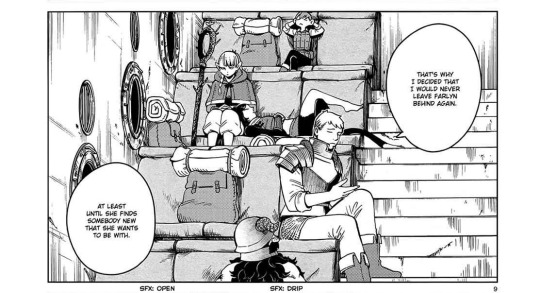
Herself. What if she wants to just be with herself for a while.
And this is me reaching but I feel like, not unlike Izutsumi who learns to feel this sense of never being alone, always having someone on your side what with having two souls, the dragon in her would make her consider herself more. She finds it easier to care after other people after all, and in the purgatory fields sequence she takes care to bring the bit of dragon left with her… Not unlike with Izutsumi, having two souls forces you to think about your identity and figure yourself out. Besides being this sort of duo now, where if she wants to care after herself she can channel it to that other side of her too… In meta dragons are symbols of greed, and I think the bit of dragon would push her to want more and listen more to her desires, primal and self-serving as they might be. The dragon soul which warped her human body with feathers and draconic features, her image of perfection marred, her weirdness externalized in a way that’s not palatable. But she doesn’t care, about if her appearance is palatable for most people, she hasn’t for a while now, and that’s great.
Notes & nuance
I’m struggling with the structure of this post, making my points organized, concise and strong at once. It’s difficult to make any statement without going "things are generally like this, but there’s this time that this contradicting thing happened too" or "it’s ambiguous enough that you should just follow my interpretation for the time of this analysis" haha, so this is the pit where I put all the stuff that wouldn’t fit well in other places but are interesting for Falin’s character. This section is pretty separate from the main thesis of the post, it’s just more Falin observations. The post has reached the 30 pics limit so I can’t just pull it up whenever it’s relevant but I really encourage scrolling up to read the stuff I highlighted in her Adventurer’s Bible profile if you haven’t already.
I think with the shy-looking loner type autistic kid archetype, and knowing she didn’t seem to mind others ostracizing her, it’s easy to lose sight of how she was by no means an unemotional child. In all the bits we see of her as a kid she’s bursting with energy and emotions. Canon confirms Laios leaving the village did affect her and make her lonely and she cried a lot, too. She may not be social in the traditional sense, but she was clingy with her brother, and she also never was all that shy about who she was, wearing her heart on her sleeve.And okay. Okay okay okay. Speaking of appearances. About what I said of her not caring about what people think of her, even seeming defiant with the caravan leader… There’s one istanxe of her caring actually, and it’s about how her face blushes easily. I remembered it as being because Laios’ said it and as I rambled Laios’ words are her world, but actually it’s ambiguous. It’s only Marcille imagining up this scenario where Laios says Falin looks weird because of it, there’s no evidence Laios said or thought that at any point. And on the other hand…
Her Adventurer’s Bible says: "5, Lovely Skin. She isn't particularly careful with it, but Falin's skin is fair and beautiful. Possibly as a result, her cheeks seem to flush easily. Marcille's always saying she's cute, and she secretly has a sizable complex about it." The phrasing makes me think the complex she has over her blushing might have developed because of Marcille more than Laios. "Marcille's always saying she's cute, and she secretly has a sizable complex about it." It could be related to how Marcille gets swept away and infantilizes her, calling her cute wanting her to wear cute feminine outfits etc. Again this feels like it relates to Falin’s struggle to be seen for who she is and what she wants to be seen as, her struggle to be recognized, having ideals and perspectives pushed onto her. Here Falin is insecure over her blushing implicitly because she doesn’t like being called cute over it, but that’s not how she wants people to see her. She doesn’t want Marcille to always see her as her 10 years old adorable friend. Like if your friend said you had puppy energy, it can be flattering, but it can also make you insecure.
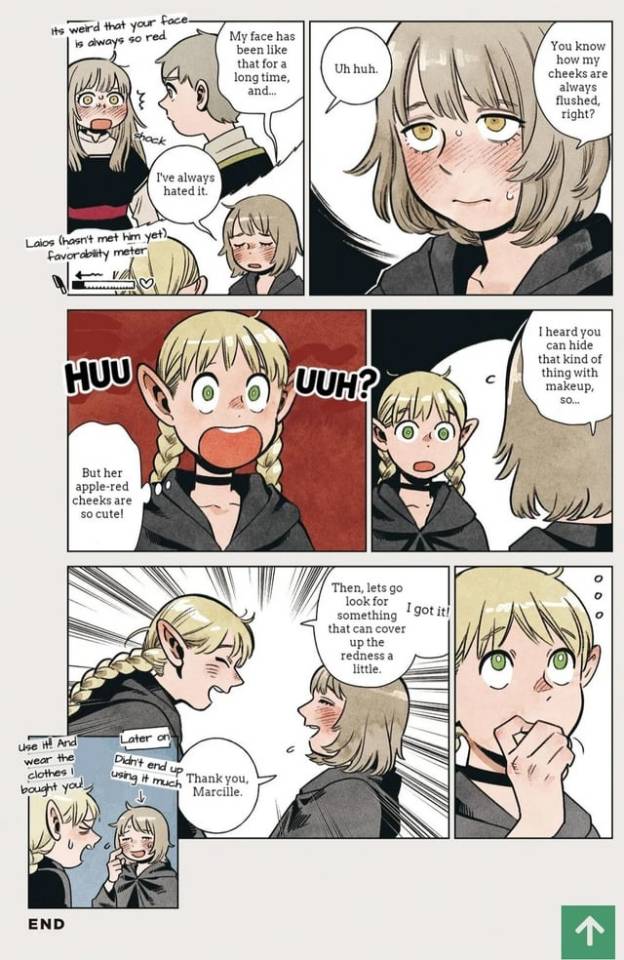
Here’s a link to what I mentioned about her being uncomfortable wearing feminine outfits. It does seem to be more about comfort than the aesthetic perse, to me. Interestingly the shirt & shorts don’t seem like they show much more skin than her beach outfit, so maybe it’s more about the shirt and shorts being tight-fitting. Like the skirts and heels they feel stifling. Again a bit with themes of freedom and not wanting an aesthetic pushed onto her. So yes just to reiterate, I think this is more about self-affirmation and how her identity and self-image gets shown to others, rather than wishing to hide parts of her body like her blushing etc for people pleasing reasons. Makeup was a way for her to appear how she wants to and feel more confident. It was a way to take control over her own image. She didn’t keep doing it, the narrator stating the process to be ‘troublesome’. Ultimately she still prioritizes her comfort, and it was a lot of recurring efforts to go through.
And on the topic of appearances… A friend once asked me: "Does she really hide herself or not? I keep thinking about "falin is herself first and foremost" (in her Adventurer’s Bible profile) it’s just so. Hmmmmmmmm... I just keep seeing people say she hides her real self from people when I feel like the issue is more about her charitable traits straying too far into becoming flaws but people around her dont realize that..."
Imo the thing is, I don’t think she hides her identity, but I do think she suppresses her individuality for others’ sakes if that makes sense. In the way that only post-canon does she allows herself to go see what the world is like, but that’s not personality wise it’s needs and wants wise. And I do feel like that’s the closest interpretation of canon, she says it herself she doesn’t know what she wants because everything she’s done was always about Laios or Marcille, but she doesn’t change her demeanor or personality for others. But she *will*, like, not ask for things she wants directly, like sharing lunches with Marcille at the academy, she suppresses her wants, doesn’t ask things from people and doesn’t hope for more, hope for better. I don’t think we ever see her actively repress her personality, except like what, being more laidback than enthusiastic but I do feel like unlike Laios with her it’s less ‘appearing stoic to fit in more’ and more ‘yeah i’ll just chill until I’m needed or something activates my enthusiasm’. To which said friend quoted: "to feel like you belong you need to be useful. when you can’t be useful the next best thing is being convenient."
And speaking of passivity… I want to speculate about Shuro’s proposal some more. Shuro and her got along well though we don’t know how much, or how often they hung out, she even saved him from a nightmare. Why did she take so long answering Shuro’s proposal? Was it an effort to preserve or was she really just that conflicted? Procrastination probably yes, but what is the core motivation of itl Considering she ended up saying no to travel the world instead, I don’t think it was as simple as ‘she wanted to say yes for convenience’. Logically it’s what would have been best, but it’s not what she wanted for herself, but it was and still is hard for her to even know what she wants. Probably, since like she states it was a great offer and she doesn’t think she’ll get proposed to again, it’s that self-effacing tendency that yes it’d be convenient and logical, and that makes her want to say yes even if her spirit isn’t in it, because if it’s convenient then that’s more important than her feelings on the matter. Man also… Obviously Marcille is very vocal about how she shouldn’t get with Shuro, but imagine how Falin’s whole perspective on marriage must have felt when her only friend ever is a Romantic with a capital R who gushes about idealized romances and grand gestures and True Love and doing things with fully pure feelings all the time.
AND speaking of passivity!!! How much Falin is "there" as the chimera, just how much she’s master of her actions, is left ambiguous and intentionally so imo, but she’s for sure there & influencing the dragon’s action to some degree. Having a dragon’s foot on her in purgatory that keeps her from moving for sure visualizes how it must have been like, but there’s Falin calling out to her brother Laios, there’s the kind attentions towards Thistle that are so Falin-like, and most explicitly there’s the Adventurer’s Bible stating "Even after becoming a chimera, she has a soul that's as kind as ever", which I honestly dislike, a fantranslation puts it as "Even as the chimera, her caring nature remains" and either way to me it feels like confirmation that it’s her giving those berries to Thistle. Now, wether or not she has the mental capacity of a chicken or something closer to human Falin, no clue, there has to at least be some kind of mind bond between monsters and the dungeon lord, compelling or forcing them to go along with orders, or calling her to him in distress like with the fight on the first floor. But yes, it’s interesting to wonder what it is that a Falin, with her kind soul but without her human mind, would willingly do. On her profile, she’s described as Thistle’s guardian and servant. The power dynamic between the two are very interesting, I already went into how it might have felt like freedom to her while being fake so I’ll reign myself in and just mention it again. She’s still at the heel of someone, only now it’s someone who doesn’t care about her back. Going from being cared for so strongly that it’s suffocating and they would defy death and the world for you, to being devoted to someone who has not one feeling about you besides your utility as a paw . She has all this care to give and to focus onto others and he has none to send back to her and I think that’s part of it. In a way, being left with only her own feelings and a void, without expectations or feelings or ideals pushed onto her, it might have been soothing in itself, and eye opening. But yes the way I think of it, her care for Thistle isn’t unlike the care she gives the ghosts.
Interestingly, the care she extends for the ghosts is sending their soul to a peaceful death, freeing them, of life and any earthly attachment. Take that as you will with the themes of freedom and burden of life and mind, immortality and becoming a warped version of who you were, and such and such.
But going back on the topic of connections and bonds for a bit, I think academy days Falin & Marcille is super interesting bc we’ve never really see Falin form a connection besides with Marcille and even that is kept pretty ambiguous. When was the point that Falin started seeing Marcille as a friend and seeking her out? When was the "I’ll lay down my life for you" point? I’m so fascinated by how she wanted to share lunches with Marcille but never truly asked, only made little "hey want this? I found it isn’t it cool?" gestures of showing things to her… It’s the only way she knows to ask, or maybe it’s the only way she feels comfortable to. In all the scenes of young Falin and Marcille Falin seems comfortable in her friendship with Marcille, but at the same time… I think we see Falin at her most insecure around Marcille, because she really does care about Marcille and what she thinks of her so much, and while Marcille is a bit of an unstoppable force tornado style (affectionate) Falin is something of a doormat. I’d usually say showing her berries was her earnest way to connect and be like "Hey bestie look at this! :]" , but there’s a real possibility that she was self-conscious and holding herself back.
Friendship and Marcille! Involving Laios into this too but, again with the autism thing of not showing you care in ways that others understand, Marcille being very overtly affectionate and clingy was so so soo important… Marcille keeping on hanging out with Falin and caring after her, and being undeterred/unbothered by Falin not always seeming like she cares all that much back in the conventional way, as in Falin acts nonchalant and a bit like she didn’t mind wether she was there with her or not during her outings to the cave dungeon. Caring and being clingy and so affectionate despite that in such a classic Marcille way is soo needed, because so often people will get discouraged by say, their friend not keeping in contact regularly/well, seeming disaffected or as happy-go-lucky as ever even if you haven’t seen each other in a while or when they’re alone, and yes there’s potential for a strong friendship there but someone like Falin won’t be committed enough to reciprocating attention the same way… I hope I’m making sense but yes this angle in particular strongly correlates to autism. And the way Marcille always initiates physical affection, both Toudens being awkward about initiating touch because they don’t know if that’s allowed, if they’re going about the social interaction the right way, if they’re allowed to ask that out of someone…
Another fun observation to make is about the 4 years Falin and Marcille spent apart. Marcille despite being of a long-lived race treated these 4 years of separation with more gravity than Falin did. Falin brushed it off very dismissively to say the least. But then you remember that the amount of time Falin and Laios didn’t see each other after he left the village was 8 years. Double the years, double the time. And that reminder makes Falin’s actions so starkingly understandable. Of course she wouldn’t see 4 years of separation as a long time if 8 years of separation with her beloved brother is her point of comparison. Of course she’d see it as worth it to leave Marcille for 4 years if it meant ending those 8 years instead, especially if she was worried about him (the reason why she followed him into his caravan job).
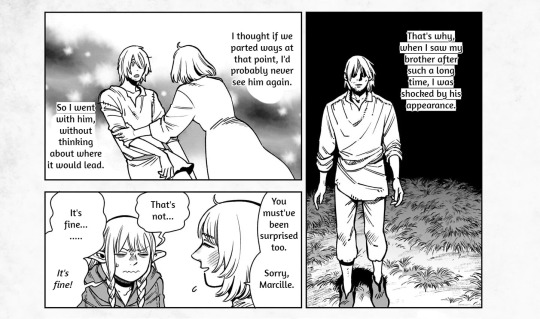
A friend always says that while Falin is the center of Marcille’s world, Laios’ is at the center of Falin’s, and I tend to agree.
It’s fun to think of how her career dreams had always been shaped by Laios, even when they were kids. Of course there’s how traveling the world began as a dream they talked about and shared, but there’s how he reassures her by listing cool jobs she could do like traveling exorcist, etc. And then of course, she gave up on her magic academy and career path to follow him and do odd jobs, etc etc.
I should go into the violence of Faligon more tbh, because I think there’s an interesting parallel to how she has no problem wacking things with a mace, wether a ghost when she was a kid or a walking mushroom as an adult. Something that often surprises fans when they remember, I don’t really want to get into the whole " Falin hates violence and hates seeing people in pain to an intense degree. ‘If you die do it somewhere where I can’t see’ style’ interpretation, it has some weight but on the whole I don’t vibe with the theory she has a particular aversion to violence, she seems to be fine resorting to it as much as any other adventurer as long as it isn’t needlessly against ghosts. And Falin’s sudden mace hits are fun to me too because it’s not her becoming a berserker when the need arises as much as her becoming active because something she cares about is threatened, and that brings her out of her passivity from 99% of the rest of the time. Thistle included. Falin always could be violent, she just dislikes senseless carnage. The Shuro party vs chimera fight is a bit ambiguous on it, because you can argue she only attached after being provoked, presumably offscreen as well while the ninjas went off to fight the harpies. Falin becomes the most active when she needs to protect someone, she has no qualms doing whatever’s needed for that, wether it be leaving the academy & Marcille without notice no matter the consequences or what her parents think, or teleporting the party, etc.
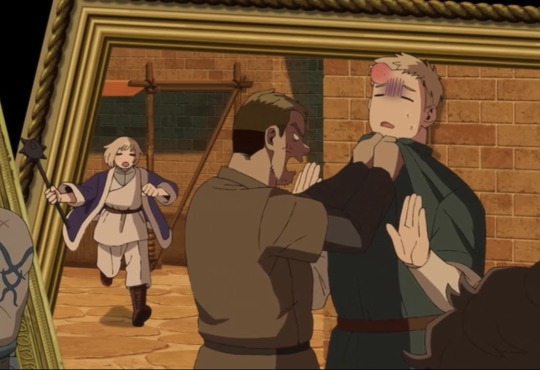
I’m working on a post specifically pointing out all the differences between Falin and Laios, but yes I think both of them selfishly desire freedom in different yet similar ways. Falin’s dark secret is "Ethics and risks are optional if it means I can protect those I love" like the teleportation, and Laios’ is "Ethics and risks are optional if I can be free of all this bullshit" aka humanity aka his wish with the winged lion.
Conclusion
Flighted birds have hollow bones. With freedom and wings there comes risks and sacrifices.
Tldr: Falin doesn’t care all that much, she’s very go with the flow. For example if someone hates her she doesn’t really care because that’d require her caring about what they think of her in the first place, and she only cares about her loved ones. She smiles, but it’s more a state of being rather than out of active goodness: she’s canonically very genuinely kind, but it’s more out of a general want for pleasantness than active care itself. She’s passive, and softspoken because that’s just how she seems, but she has no problem hopping into bushes or getting heated if something calls to her enthusiasm or calls for action and a hit of the ol’ mace. Her loved ones needing tending or protective is what makes her go from passive to active. That familiar autopilot mode of making someone the center of her world and following their every move is what made her so easy to be controlled as the chimera, even ferociously defending him with her life. Faligon is most interesting to me with the theme of freedom. She’s shackled to Thistle and out of her mind, but there’s also a sense of empowerment and freedom from expectations and society. She spends all her time caring for Laios and Marcille alternating that none of her care and emotional energy is left for others, including herself. So she had to get relieved of all of that for a bit, becoming the chimera so she could reset and recenter and remember that she, too, indeed, is there and an important part of her own life. There’s a way of caring after others that can be selfish, not unlike Marcille being overly coddling and not listening to Falin. In Falin’s case, I think it was so selfless that it ended up looping back around to erasing her sense of self. In losing sight of herself, that devotion becoming neither quite selfish or selfless but a fact of life and a state of nature, muddled by its lack of direction.
She’s sooo used to never being able to ask things out of others, you get the crumbs of affection and approval that others offer to you unprompted and that’s it don’t hope for more don’t ask for more. (Also reflected in how she follows her loved ones around without complain or personal opinions and how she’s not willing to rock the boat and affirm herself in her relationships like with Marcille during canon)
Falin cares so much, so much and so laser focused on her few loved ones that it blinds her and she loses sight of everything else, she ends up neglecting herself and the rest of the world. As Kui puts it, Falin is herself first and foremost. She just had to remember the importance of that.
-
I see her as an enneagram 9, which can be surprisingly accurate and fun to research through the lense of Falin. Excerpt below from this book, but like my god, good way to put it
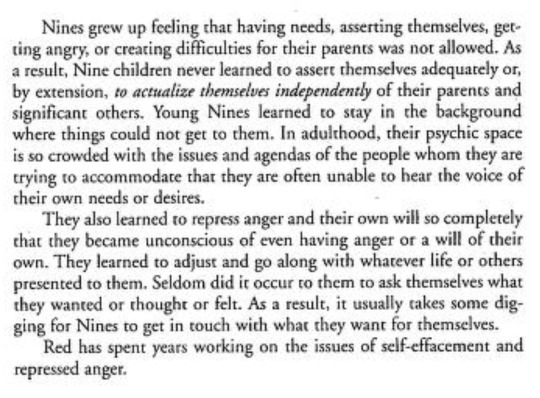
That’s it, ty for reading. Even if it’s a bit of a mess, hopefully you’ll have gained a thing or two from it. Falin is a character hard to pin down, but it is very gratifying when you find the way that the puzzle pieces fit together right for your own understanding of the story. Fantranslation of the shuro proposal comic by @/thatsmimi here.
Here’s my spotify playlist for her if you’d like
Sometimes love is about letting go, a lesson a lot of the cast needed to learn. Self-love’s important too, and just like with diets we need a healthy balance.
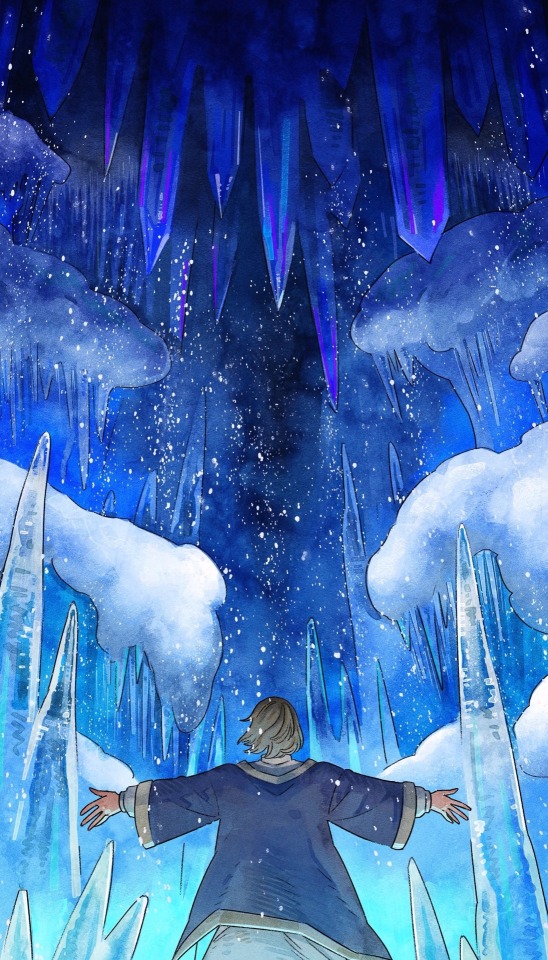
#I find it hard to express myself right on the topic of Falin. Both because the issue is pretty vibe based and because we don’t#get that many moments with her. So there’s ambiguous scenes up to interpretation addressing a layered topic and like. Save me. Save me#As always falling down the rabbithole of starting an analysis about a specific facet and then needing to explain everything else around it#I’m doomed. I’m getting lost in the sauce.#dungeon meshi#delicious in dungeon#falin touden#analysis#character analysis#meta#autistic reading#aroace reading as well. Sort of. It’s mentioned#The aroace autistic guilt of not caring back in the way/with the intensity you’re expected to#As always this is just my interpretation blablabla#Spoilers#dungeon meshi manga spoilers#She loves like a dog aka unconditionally and happy with eating scraps of affection and attention off the floor#Laios touden#he’s here too bc they are an unit#If you’re not capitalizing on the uncanny vibe autistic effect for Falin’s character u are missing an opportunity imo#Fairy’s child is written all over her. Her cryptic-ness is the point so why am I surprised she’s hard to fully pin down#Even with the graveyard scene it was Falin following Laios… Sob. Laios could feel responsible her powers were found out#I’d like to rework this at some point if i get better at structuring. I’m not satisfied by the level of clarity#Will 90% for sure edit stuff in if i find more to say.#Fumi rambles#Crazy style#I give a TLDR at the end if you’d prefer. It doesn’t have the like evidence/explanations alongside but it makes the main points i think
1K notes
·
View notes
Note
This is common knowledge that a lot of viewers don't understand the story for what it is, either it is an impossible situation of confusion between fiction and reality (which I am not addressing here) or about Will's darkness, Hannibal's motivations, failure to understand the point of view or freedom of conscience in the narrative. I am not even including anything about their relationship since there is a whole lot of text which people choose to ignore.
Now a little thought exercise - suppose if you were in a team of writers who created it, and had researched this probable issue and mandated to make changes, would you have added or changed anything - words/ dialogues/ scenes ?
For me, I am quite happy that things aren't set on a platter and I liked deriving meaning, that is a more satisfying and emotional experience. Still there are moments in season 3 specially second half which could have been made clearer for everyone ? Did you think the ambiguity is intentional ?
Would love to hear your thoughts, it keeps bugging me every time I see mindless interpretations, and they are abundant. Apart from the core fandom, no one seems to understand it !
I relate to this so much! I find it endlessly frustrating that 'Hannibal' is misunderstood by so many people, and on such a large scale, too. Random first-time viewers, people who write articles and make videos about this show - it's next to impossible to find someone who wouldn't make common mistakes.
On the one hand, like you, I appreciate the undertones and implications. They are often more impactful than outright statements and confirmations (unless we are taking about queerbaiting, of course). But knowing what I do now and being a part of the team, I would probably make some changes.
I would get Will to reply to more questions instead of staying silent. For example, as applied to S3b, it's clear that he asked to talk to Hannibal because he wanted to, not because he really needed his help, but when Hannibal and Bedelia call him out on it, Will says nothing. It's an obvious confirmation to me, but many would disagree, so I'd get him to give Bedelia a mocking and cryptic verbal answer.
I'd make Will's manipulation of Jack and Molly clearer. To this day, many people think Jack practically tricked Will into coming back, but I think the opposite is true. There is no way Will is so naive and malleable: he deliberately left Jack with Molly, knowing that Jack would disregard his wishes and show her photos, which would then encourage her to urge Will to return. I wish this was addressed or discussed more: perhaps Will could smile in a pleased way before scowling or he and Hannibal could talk about it.
I also wish it was more clear that Will set up all those officers to be killed by Francis just to stage Hannibal's escape. Hannibal could raise an eyebrow and ask something like, "Still hiding behind that gun?" There are many small examples like this.
I'm not sure how intentional the ambiguity is, though. Sometimes, based on Bryan's comments, I struggle to understand how exactly he sees Will and his motivations. Bryan contradicts himself so often that I'm not even certain if he thinks Will needs redemption or something in the future. I'm also unsure why he contradicts himself in the first place: does he not have very clear ideas and coherency in the show is an accident? Does he change his mind often? Do the ideas he had in mind before, during the making of the show, and now differ? Being a show-runner is difficult because you might have one thing in mind, but after all the edits, the result could be something else, and unless you re-watch the entire product, you won't even know it. So I don't have a clear answer here.
All in all, I think the show is pretty comprehensive despite its tendency to use shadows instead of solid shapes - I love it because of this, but yes, I do think some moments could be firmer.
23 notes
·
View notes
Video
youtube
Are you tired of Great Albums being about music people have actually heard of? Do you want me to just go ape shit, and review obscure minimal wave cassettes from the 80s? Admittedly, Oppenheimer Analysis’s New Mexico is one of the most famous weird minimal wave cassettes, and for good reason: it actually holds up quite well as an album! Come check out what all the fuss is about. Transcript below the break.
Welcome to Passionate Reply, and welcome to Great Albums! Today, I’ll be talking about a very cultish cult classic, and an album that’s one of the definitive works in the very underground scene of so-called “minimal wave”: New Mexico, the only full album released by the duo “Oppenheimer Analysis.” The band’s namesake was actually lead vocalist Andy Oppenheimer, who became acquainted with instrumentalist Martin Lloyd at the 1979 World Science Fiction Convention, where the pair bonded over speculative fiction, Midcentury graphic design and propaganda, and the work of early British electronic pioneers like the Human League. 1982’s New Mexico was these two’s first recording as a group, but Lloyd did go into it with one credit--the year prior, he and David Rome of Drinking Electricity released a double A-side, featuring the jumpy, playful instrumentals “Surface Tension'' and “Connections.” They referred to their act as “Analysis,” making it feel very much a part of the Oppenheimer Analysis story.
Music: “Surface Tension”
Oppenheimer, meanwhile, was a true outsider artist, making a living as a nuclear science writer without any substantive musical background. While not all minimal wave is “outsider music,” and not all electronic outsider music is minimal wave, there’s certainly a correlation there. Oppenheimer’s reedy, somewhat strained voice lends New Mexico the punkish charm that only utterly untrained vocalists can offer: a vessel that cracks and buckles as it fails to contain the raw emotion within.
Music: “Martyr”
The addition of a singer is one major distinction between New Mexico and Lloyd’s earlier compositions, but they’re also very different in tone. As I said earlier, the “Analysis” instrumentals are sort of light-hearted and sprightly, a bit reminiscent of the jazzy synth experiments of artists like Jean-Jacques Perrey and Gershon Kingsley. New Mexico is substantially darker and more gothic, as befitting an LP that’s at least partially a concept album about the nuclear age.
Music: “The Devil’s Dancers”
While nuclear anxiety is an indispensable theme of the album, it’s never a suffocating one that makes it feel horribly antiquated to modern ears. It’s a very aestheticized rumination on nuclear themes, that never jumps up and hollers, “bombs are bad!” Take, for example, the track “Radiance,” probably the best-known track on New Mexico...to the extent that any of them are that well-known. It’s one of the album’s most languorous, atmospheric moments, and paints a vividly desolate picture of ground zero after a detonation, with its fluttering, delicate, but ultimately frigid synth flourishes.
Music: “Radiance”
I think my favourite part of “Radiance” is actually its lyrical turn: an atomic blast isn’t like the radiance of a thousand suns, but rather, vice versa. The latter is the one that’s merely theoretical and dwells in the realm of poetic license, whereas the former is a historical fact that we all have to contend with. “Radiance” is quite solid, but in many ways it’s a pale imitation of the title track, a seven-minute sprawl that works exquisitely as a kind of musical landscape painting:
Music: “New Mexico”
Painfully evocative, with an eerie, almost yearning undercurrent, “New Mexico” is easily the track that feels the most grand and epic. I would really have loved for it to be given more of a place of honour in the tracklisting, possibly as the closing track, but it’s wedged somewhat awkwardly in the middle of the second side. I suppose we can’t expect quite as much from a gonzo underground mail-order cassette release, though. At any rate, while “Radiance” and “New Mexico” are absolutely about atom bombs, they remain very emotionally intimate--almost torturously so. A lot of the other tracks are less about the bomb itself, and more about the rise of “Big Science” in the Midcentury consciousness in the wake of the Second World War--chiefly, “Men In White Coats.”
Music: “Men In White Coats”
As in “The Devil’s Dancers,” Oppenheimer happily accepts the role of an evil or insidious narrator here, and sells us this megalomaniacal perspective with aplomb. A lot of early 80s synth, minimal wave and otherwise, is characterized by more deadpan vocalists, but I can’t stress enough how much Oppenheimer’s piercing lead vocals bring to this album. It’s perhaps the most critical on the tracks that delve into more traditionally emotional topics--chiefly, the standard romantic love numbers. Take, for instance, the harrowing, neurotic “Scorpions”:
Music: “Scorpions”
I’m certainly a fan of the title “New Mexico,” which just ties together all the right connotations. First and foremost, New Mexico is a place--a place you can visit. And this is one of those albums that really wants to ground you in a narrow and specific sense of place, a sonic landscape. New Mexico is mostly empty desert, large tracts of which have been government land even before it started being used more intensively for military research in the 20th Century...most famously, of course, on nuclear weapons. I like to think that the name also suggests novelty and recency of place. We are, after all, entering a “new” world, defined by the advances of science, and the upending of earlier ideas about the world.
The representation of the album art for New Mexico that I’ve been showing you is actually the imagery of the 2010 reissue of the album, which I’ve chosen because I think it’s a bit better known, and I simply prefer it, personally. The most striking thing about it is this colour--a ghostly green, that instantly evokes the common imagery of atomic phenomena. Radiation doesn’t really glow green, of course, but, like everything else about the album, it’s clear that this choice is meant to be a reflection upon the greater cultural imaginings and social impact of the Atomic Age, so I think it’s a perfect fit. At the center of the composition, we see a figure, head bowed and face shaded to provide some sense of anonymity, reaching a hand towards the side of his face in a gesture that’s almost reminiscent of using a cell phone at first glance. What exactly he’s up to is as unclear as his identity. Between the modernist styling of the architecture to his left, and his antiquated attire, the image is quite suggestive of a Midcentury setting. But the real narrative angle here comes from the right side--several figures are approaching that central character, possibly in hostile pursuit. Espionage gone wrong? A desperate attempt to silence a whistle-blower? Much like the music, there’s an ambiguous, mysterious, but also menacing ambiance to this cover.
For historicity’s sake, I’ll also discuss the original cover of the homemade cassettes of New Mexico. As we might expect from the nature of this release, it’s a fairly simple graphic, featuring a nude woman whose full-figured body type, popular on pin-up models, and short hairstyle convey that Midcentury aesthetic almost as well as her clothed counterpart on the reissue. Our eyes are naturally drawn to her exposed breasts, where they meet a pair of radiation warning signs censoring her nipples. A simple image, but a deeply perverse or twisted one. Is it a kind of union between the vulgar, crass profanity of pornography, and the depravity of atomic weapons? Is it a visual representation of the way Oppenheimer Analysis have beautified the nuclear landscape, conflating man’s inhumanity to man with something voluptuous or pleasurable? This cover is at least as complex a symbol for the album as the reissue one is. And while it’s easy to dismiss it as lowbrow, I think it’s worth noting how the salacious or saucy aspect of it would have helped it fit in with other underground cassettes of its era, many of which had lurid or provocative imagery.
Of course, this discussion of the differing incarnations of the album is a natural segue to addressing the release history of New Mexico. The story of Oppenheimer Analysis is deeply entwined with that of New York-based Minimal Wave Records, founded in 2005 by Veronica Vasicka, a radio DJ fascinated by underground electronic music. The label specializes in making obscure, self-published works like New Mexico widely available in digital form, so that more music enthusiasts can get a chance to hear them. Without her, I myself might never have heard this album, and certainly wouldn’t be in a position to make a review like this! Vasicka felt strongly about the artistry of Oppenheimer Analysis, and gave the honour of her label’s first-ever release, “MW001,” to a self-titled EP compiling several of the tracks from New Mexico. Later, in 2010, when she was able to rerelease New Mexico in its entirety, she gave it the honourary designation of “MW001D.”
Vasicka is the one responsible for coining the term “minimal wave” to describe the subgenre she was interested in, and, fifteen years later, I think it’s safe to say it’s had some staying power. While it may be a bit vague and subject to individual interpretation, that’s a problem all genre labels contend with, and I think fans of minimal wave ought to be proud that this term was at least coined by a passionate and dedicated fan, who made her favourite music more accessible to everyone, as a labour of love. It’s also not the only genre term to come about much, much later than the music it seeks to describe. At any rate, New Mexico will always have a place in the minimal wave hall of fame, and it’s a genre-defining work, if in hindsight. The stylistic hallmarks of New Mexico are, for better or for worse, now also those of a whole movement: harsh, tinny rhythm machines, strident synth lines, anxious, unmannered vocals, and technological themes.
But what actually happened to Andy Oppenheimer and Martin Lloyd? In light of the renewed interest in their work in the 00s, they actually got back together for a bit, releasing some archival material from the 1980s and laying down a handful of new tracks, very similar in style to those on New Mexico. Lloyd passed away suddenly in 2013, but Oppenheimer has remained interested in keeping their ideas alive. He’s been performing live as well as putting out new music, first as “Touching the Void,” alongside Mark Warner of Sudeten Creche, and more recently as “Oppenheimer Mk II,” with Mahk Rumbae of Konstruktivists.
Music: “You Won’t Disarm Me”
Something that I think really stands out about New Mexico, especially when compared to a lot of other small-time minimal wave releases, is that it’s a very consistent quality throughout. As you might expect with an underground genre, a lot of the music to choose from is varying degrees of amateurish and clunky, and it’s arguably better to listen to Minimal Wave compilations than the LPs that exist. New Mexico is an exception, though, and doesn’t have any particularly weak tracks. The favourite tracks cited by fans of the album tend to vary pretty widely. My top pick, though, is the album’s opener, “Don’t Be Seen With Me.” It’s a perfect marriage of dizzying, spiraling synth runs, and one of Oppenheimer’s most frenetic vocal performances, that creates a masterful portrayal of being swept up in infatuation with somebody you really shouldn’t be fooling with. That’s all I’ve got--thanks for listening!
Music: “Don’t Be Seen With Me”
#music#great albums#album review#album reviews#minimal wave#minimalwave#coldwave#minimal synth#oppenheimer analysis
16 notes
·
View notes
Text
The real problem with the show.
Look: I’m not one of those idiots who is going to constantly shit on the show for this whole thing, nor am I one to blindly praise the show for doing the bare minimum.
But I am someone who is going to try to put this into perspective.
Our main issue that’s going to be talked about is the fact that this show doesn’t really address the issues from previous volumes.
Take Weiss’ racism for example. They didn’t want to have to address her developing. The whole issue with Weiss is that the whole thing got resolved off-screen. There’s no reason to have the conflict on-screen if the whole thing was going to be resolved off-screen. The big problem is that this show didn’t want to tackle heavy subjects that they weren’t comfortable or capable in tackling. And like, I get it. There are some subjects that people aren’t that well-versed in, and truth be told, there’s a hard way to determine if something that is wrong is worse than something that isn’t there at all. They didn’t want one of their main characters to be a racist.
But the problem here is that that’s okay. Especially when the characters grow and learn from that. I’m sure that everyone has pointed this out already, but Sokka was a sexist in the early episodes of A:tLA, but he learned his lesson and started regularly chugging his Respect Woman juice happily and regularly. Weiss’ whole racism thing was kinda… dropped. That’s not really interesting.
Your characters should have flaws. Real flaws. Ad real character traits. Character quirks that could make for some really interesting moments. I think I mentioned this somewhere on an earlier post, but Ruby being a weapon nut could have been a really good and natural way to explain everyone’s weapons. She could brag about hers, hype up Yang’s, pester Weiss about hers, or even ask about Blake’s, and boom! Everyone’s weapons are explained. Their names, what they can do, and how they work. And maybe even whether or not they made them (I imagine that Blake made hers with help from others, while Yang and Ruby made theirs on their own from scratch, and Weiss got a hers commissioned). This could have even extended to team JNPR too. We already know that Jaune’s is an heirloom, but what about Nora? What about Ren? How about Pyrrha? The thing about that quirk being dropped is that it takes away something from Ruby. HBomb talked about it in his video, but an arc where Ruby helps Jaune forge a new weapon or even add to his existing one would have been so awesome. But no. The upgrade comes from a never-will-be-seen-again blacksmith in Volume 4, and the best it can do is… Become a bigger sword. Then it gets another one in Volume 7 where it’s Penny’s creator that delivers the upgrade. These aren’t emotionally significant in any major way. Sure, the first upgrade is combining Pyrrha’s stuff with his, but it would have been more emotionally impactful if he had saved those things, did his damnedest to bring them to Pyrrha’s family, only for them to now say something like “Pyrrha sent us letters about you. She would want you to have them.” And then and only then, would he incorporate them into his weapons. Imagine how impactful that would have been! Imagine how heartwarming that moment would have been! I’m the resident Jaune hater of the rwde tag, and I’m pretty sure that I would love that scene. I might’ve even called it my favorite.
Like… These character moments get dropped for no real reason. A lot of character moments are just rendered insignificant because of them wanting to advance the story. But a story takes time. It takes setup. Let’s take Dragonball Z for example. There’s a lot of buildup to Gohan being Goku’s successor before he eventually gets upstaged again because the fanbase wanted Goku back. He had those bursts of power that made him stronger. It was built up to. It was hyped up. There was a lot of foreshadowing. Pyrrha’s death… Didn’t really have any of that. Outside of her name, she wasn’t really set up to die. Especially since she hardly had any interactions with the characters outside of Jaune. Because of this, Pyrrha’s death doesn’t hit as hard as it could. Why exactly is Ruby going ballistic? We never saw any major scenes that would indicate them as anything beyond classmates. Like… Moments where Ruby and Pyrrha bond over having high expectations for them. Ruby’s supposedly the daughter of a famous huntress, so everyone seeing her as basically another “Summer Clone” would be a really awesome move to go with. Ruby’s quest should not only to be to save the world, but to also prove that she isn’t a carbon copy of her mother. Have characters like Yang ad Qrow point out what Ruby does different. Maybe one of them is encouraging of being different, while the other doesn’t like it because they want Summer back. I guess Yang would encourage Ruby being different while Qrow would discourage it. A major theme in Volumes 6 ad 7 seems to be how the previous generation kinda screwed things over for the next one. Couple this with Oscar also trying to separate himself from Ozpin (and then immediately trying to talk down Ironwood in a way that Oz would try to do (seriously… WTF?)), Ruby could do something different.
Something that Ruby could do different is something in regards to her plan to stop the end of the world. Instead of trying to defeat Salem, she could try understanding her. I mentioned that Salem was effectively gaslit into being the villain, so the characters trying to help her recover would be an awesome moment. As of right now, everyone (even the fndm) wants to demonize Salem, and doesn’t want her to be redeemed. This is despite all the shit she went through. If anything, Salem was restraining herself when all she wanted was freedom and a life with Ozma. She could have very well have wanted to get back at the world that wronged her. Salem shares so many traits with the titular team that if anything, the fact that she is named after an event where women were killed for false prosecutions should be an indicator as to how much more sympathetic Salem is. Stopping Salem isn’t the answer. All that will do is delay the inevitable until an even worse and less sympathetic version of her comes along… Probably Cinder, but I think I’ve covered her already. The main point I’m trying to make here is that Ruby and her relationship with her mother is something that should be touched upon more. In fact, Ruby and Yang should have this subject brought up. The problem is that these writers don’t want to do anything that doesn’t lead to a fight scene because they’ve come to the conclusion that people are only here for the fight scenes.
And really, they should go to DEATH BATTLE or One Minute Melee if they just want a cool fight scene. People are ultimately here for the shipping and fight scenes. When it comes to character moments, that’s forgettable… Unless it’s something to mock the characters for like Yang’s singular burnt item in the comics automatically making her a bad cook. Why is that capitalized on, but Ruby’s “It’s also a gun” line hardly gets brought up anymore? Is it because people can mock Yang for it? Like… I know that I’m biased because I’m a Yang fan, but come on! COME ON! Yang had to take care of Ruby. This is something explicitly stated in the canon show. Unlike Raven’s up to interpretation line about her killing OG Spring, which has a lot of ambiguity to it, Yang’s whole taking care of Ruby thing is explicit. Ruby even states in Volume 1 that Yang read her fairytales when they were kids.
And this all ties back to the dropped character traits and/or moments. These are important moments for the character. Yang is a Mom Friend for a reason, and Blake is the Rebel Aunt friend for a reason too. Blake has shown that she has a lot of resolve when it comes to her beliefs. Weiss can be treated as the “Deprogrammed Karen” friend. The one that used to have some prejudices, but ultimately was able to move past that. Ruby could be the “Young and aspiring hero” type too. But these initial traits are forgotten because instead of them having their personality traits clash with the world around them, they are forgotten so that they don’t. These characters don’t grow on-screen. They don’t learn their lesson on-screen. They don’t even have it implied on-screen. We just have to assume that Weiss learned her lesson off-screen. We just have to assume that these characters worked and trained hard together off-screen. Like… Was a montage too expensive?
All I’m saying is that these characters are deep. But that deep characterization is never explored or used to its fullest extent because the writers don’t know how to keep having a character grow beyond that. Once a character is finished growing, instead of having said character help others grow, or show how that growth impacts others or themselves, they are forgotten.
Except for Jaune. Jaune’s more shallow than a puddle.
19 notes
·
View notes
Note
You said misepan 2 is one of ur favorite yuuram short stories, can u give an analysis of it please!
Hello anon!
Ok! But I would really recommend reading it. I have said this many times, there's something about Takabayashi-sensei style, the way she writes her stories, that I really, really like.
Misepan 2
Title: Misepan, means "Showing panties". So the first part (written 2 years prior and almost completely disconnected of part 2), was about a bet Murata thought for Yuuri. Yuuri said he was unpopular and Murata said he wasn't and bet Yuuri he could get someone to "show him their panties."
---------------------------------------------------
Summary of part 1: In part 1, some chick was looking for a ring her bf gave her in the river and Yuuri helped her. That and the bet is the entire story.
---------------------------------------------------
Intro: Misepan 2 starts in Shin Makoku. The topic of 'lost item' continues. This time it's Yuuri who has lost something very important. A hand made necklace that Greta gave him.
---------------------------------------------------
The first part shows Yuuri and Wolfram around the castle. Yuuri tells Wolf he's looking for the necklace because he lost it. They meet Cherie-sama, who is wearing a maid suit and bunny ears and tells Yuuri that she wants Wolf to wear the same to attract customers for her new shop (a bar to find love).
Wolfram says he will refuse because of the bunny ears, because Yuuri hates rabbits (the mascot of Seibu Lions opposite team is an orange rabbit). Cherie mentions Wolfram used to love rabbits as a kid, because cats grabbed the attention of Gwen, and that they need Wolfram's help to cure Yuuri's rabbit-hate. (Yuuri is thinking he doesn't hate rabbits just that mascot from that team).
Yuuri calls Wolfram 'Honey-chan', and Wolfram gets angry and tells him that because he's younger he doesn't have a right to call him that. (Yuuri monologues that 'it hurt him to have Wolf remind him he is younger’)
When Yuuri mentions the lost item made by Greta, Cherie-sama remembers the 'pig soap' that Wolfram made for her. To which Wolfram mentions that it wasn't a pig, it was, of course, Cherie-sama herself. XD Cherie sama goes speechless due to the shock and Yuuri pulls Wolfram by the hand, and trots away from that place; so that he wouldn't see them fight.
Wolfram and Yuuri are alone again, and when Yuuri reveals he needs the necklace because he's going with Greta to the zoo the next day, Wolfram starts unbuttoning his shirt.
Yuuri panics saying he shouldn't be exposing his skin , people could see him ! What if some younger girl saw his bare exposed chest! Yuuri is making a huge scene as if Wolfram were undressing. He seems jealous that someone might steal a glimpse of his beautiful chest.
At any rate, Wolfram shows him a necklace, just like Yuuri's. So it turns out that Greta made the same necklace for all 3 people in the family, Wolf, Yuuri and herself. Yuuri also notices that the stone used in all 3 are the color of Wolfram's eyes.
Wolfram says he will lend it to Yuuri for the zoo trip.
---------------------------------------------------
Important scene:
Yuuri holds Wolfram's necklace still around Wolf's neck with both hands, and then pushes it against Wolfram's chest.
And says he can't accept borrowing it.
Wolfram asks why, wouldn't you do the same for me, if I needed something and you had it.
Yuuri says: "Of course I would."
At this moment, Yuuri has both his hands on Wolfram's bare chest. He goes into a monologue about how anyone would get 'blood rushing' to their brain, if they had both hands on their partner's bare chest, feeling how their heartbeat is the same as their own, and were thinking about something serious. He's overwhelmed and needs to take a moment.
Then he says:" when it comes to things that I can give you, I would give you anything, Wolf. But this is different. Because it's a handmade item. I'm sure that the shape of the stone is slightly different."
--------------------------------------------------- Important scene analysis: This scene is huge. Let’s analyze:
Yuuri: 1) Has both hands on Wolfram's bare chest 2) Gets blood rushing to his brain (to be taken literal and/or a symbolism for arousal) 3) feels Wolfram's heartbeat beating at the same rhythm as his own (symbolism for being in sync, one person, in love) 4) is thinking about everything he would "do" 5) says he's thinking about "something serious"
He's overwhelmed. Can't function. He takes a while to calm down and when he does, he tells Wolfram that "When it comes to things he can 'give him' he would give him anything."
Do you remember the 5 last points? Touching Wolf, aroused, in love, thinking about Wolf, and a "serious matter".
The undertone here is that 'anything' is referring to his virginity.
There was a time in novel 2, when he thought he was going to 'lose " his virginity to Wolf. But here, he's very clear when he says, he would 'give' it to him. It's those little things in the stories that brings back a memory of past things that happened and wraps them up with a little bow.
It's such a good scene. And although it has this sexual undertone, I like to see it more for the theme of 'sacrifice'.
He loves Wolf so much there is nothing he wouldn't give to Wolf. His virginity is cool, but what about his life? Is he thinking about that? If he's thinking about everything he would give to him, and this overwhelmed him. Is he thinking about that too?
I mean, who hasn't thought of that? What would you do for a loved one? How far would you go? And here Yuuri says it clearly to Wolfram, he would give him anything.
-----------------
Second part Gwendal is trying to find Yuuri because he found out about the lost item and thinks it can cause an international problem. The rumors have exaggerated what happened. Conrad also shows up, and Wolfram tells Yuuri to escape. Conrad follows him and Wolf stays there to stop Gwendal.
Yuuri sees Wolf as the bravest man alive, then this scene happens:
---------------------- Interesting scene: Wolfram: "Don't worry! It is a husband's job to rub their henachoko wife's ass!"
Yuuri: "Wait isn't it, maybe, "It is a wife's job to wipe her husband's ass" ? Yeah, maybe. No, I mean, I'm sure."
Conrad: "Eh? You're letting him call you henachoko? How generous. Well, then let us rely on Lord von Bielefeld's words"
------------------------ Analysis of this scene: Preamble: Before we get into it-> Because Japan has like a 4000 year old culture, and the 'couples' terms are always 'female' and 'male', we see a lot of 'wife' and 'husband' even between two males. Some may read into it (the top/bottom stereotype from the 90s), and I will analyze it too, but there's also a lot about 'kanjis' having certain associations that don't really fit the gender of same sex partners.
Analysis:
1) Wolfram makes a joke about rubbing Yuuri's ass (and asserts he's the husband and it's his duty)
2) Yuuri says the proverb is incorrect and "Isn't it "it's the wife's duty to wipes her husband ass?" But then he says maybe I don't know, I'm not sure.
3) Conrad is only surprised at the lack of complain of "henachoko", and not all the other married couple/sexual innuendos they've been throwing at each other.
This is the Conrad I love. He's so supportive of Yuuri and Wolf. He could have said something like "Wait, how long have you been married?" and make them both self conscious, but he didn't. Conrad is great, and I love him and he deserves all the best. I'm a yuuram fan, but I love Conrad. He's an awesome character and a sweety. He's been through so much and I feel sorry for everything he's been put through, simply because the fans forced Takabayashi sensei to bring him back from the dead. (Additional info: Conrad was supposed to die in novel 5 and Takabayashi sensei spent many years trying to kill him after that, but the 'Conrad' fans didn't let her. This has lead to Conrad just 'floating around' in the novels... she was so angry she even made him the enemy for a while)
About the proverb: I couldn't find the actual proverb Wolf and Yuuri are talking about. The internet says two things: 1) it's a wife's duty to cut her husband's ear hair, and 2) it's a wife's duty to take care of her husband's arousal. Now I have no clue whether either of them are old sayings ... I simply couldn't find it.
But here's my interpretation. 1) Wolf says it's his duty to protect Yuuri as the husband 2) Yuuri says isn't that the wife's role? and in the end he's confused about the proverb. I think Takabayashi-sensei is 1, throwing sexual innuendos as usual here, and 2 is bringing ambiguity to the whole top/bottom stereotype. "Is he the top? Am I? I don't know", is what Yuuri says about this.
I think, as mentioned before, sensei addresses the top/bottom topic (because it's actually very uncommon not to bring it up), and says : yeah whatever, who cares.
----------------------------------------
Third part : Yuuri has a scene with Conrad, where he realizes that his necklace was shorter than Wolf’s so that both, the blue maseki and the emerald necklace Greta made, won’t become entangled. Yuuri is moved thinking that Greta even thought about that.
They find the necklace Yuuri lost, and this part ends with:
"Things will always return to the place they should be."
This makes me happy. It makes me think that Yuuri will always be back to Shin Makoku no matter what. I hope that Takabayashi-sensei sticks to her words.
And there’s another clear meaning: Conrad (blue maseki) and Wolf (the emerald necklace) will not entangle and cause problems. Conrad will continue to be the friend, and Wolf will continue to be the spouse, and the ‘necklaces’ won’t disturb one another. Another very important symbolism. Everyone has their place and role, and won’t mix, entangle or bother Yuuri.
----------------------------------------
Last part:
The end of the story goes back to the main story in Misepan 1. So Yuuri is there with the chick looking for her bf’s ring. An old dude sees them, then the three find a bag full of gold in the river and they appear on TV.
In the end, Yuuri gets shown panties "mise pan" by the old dude. And the story wraps itself with a joke.
In the afterword Takabayashi sensei admits she didn't know how to end the story. This means, for what I can understand, that she just wanted to talk about the royal family necklace and Yuuri and Wolf, while finishing up a story he had to finish for the DVD set.
---------------------------------------------------------------------------
The main reasons why I love this story :
1) There’s a new canon yuuram trope:" the family necklace”. This necklace is the color of Wolfram’s eyes. Greta was the one to chose it, too. She could have chosen ‘black’, the royal color and the color of Yuuri’s hair and eyes (that everyone loves in Shin Makoku), but instead she chose the color of Wolf’s eyes. I feel this is a symbolism Takabayashi sensei threw in there to make sure everyone understands it’s not Yuuri and Greta anymore, Wolfram is 100% part of that family, and it’s his color that binds the family together.
2) Yuuri’s line: “When it comes to things that I can give you I would give you anything Wolf”. As analyzed before, this is the ultimate expression of love, and he has said it clearly to Wolfram out in the open.
3) Yuuri and Wolf as established as a couple as they can be, not only between themselves, but also by others. Out in the open they’re calling each other husband and wife (in front of Dacascos and Conrad), and no one even questions this. Meaning it’s been a long time since people have known them as such.
4) Yuuri calling Wolfram Honey-chan (and Wolfram getting angry due to cultural misunderstandings)
Anyway, it’s a really great story! Please read it!
49 notes
·
View notes
Text
my 2 cents on carol and daryl under Angela Kang
So let me just start this by saying: I’ve just recently started watching this show again, like ACTUALLY watching it, because of Carol and Daryl
Yes, all this years I’ve been a shipper, and I’ve been constantly catching up w/ spoilers regarding them, but I hadn’t watched a full episode since Terminus I think. For real.
What changed? The scenes from the episode with Carol, Daryl and Henry in the woods. When I saw the awkwardness between them for the first time in the show (especially in the morning after? I love it)... I think that was the turning point to me where I went from “You know, I don’t think Carol and Daryl will ever get together” to “I think we might have a chance”. It was also the moment where I first noticed subtlety in their story, something beyond the ever-so-tiring-obviousness Gimple has always fed us with. That was the moment I decided to give the show another go because I realized a story’s being told. Properly.
And Carol and Daryl’s story... oh boy.
The way he dismissed his feelings for C*nnie lookin Carol right in her eyes? The way Carol brought up C*nnie right after he mentioned Ezekiel? And how she pressed him into admitting feelings for someone else because she doesn’t actually think he might feel something for her?
That scene is GOLD.
And so many others...
In conclusion: do I think we’ll finally go canon under Angela Kang? Yes. Am I sure of it? No way. At the end of the day, it’s impossible to know it for sure. And TWD it’s all about ambiguity, especially regarding Daryl Dixon and his love life. My point being - all we have left as viewers is our own interpretation of the story we’re given, meaning: there is no right or wrong until the show EXPLICITLY address shit. If some people think Daryl is in love with C*nnie and some other people think he’s in love with Carol, that means that the subject hasn’t been explicitly addressed. When it does, we will know for sure.
Me and my caryler heart will always hope that when that day comes, it will be Carol the one by his side :)
#caryl#carol x daryl#daryl x carol#twd#idk i just feel emotional and like talking#IMO there's no one else Daryl should be with other than Carol#that's just how I feel
59 notes
·
View notes
Text
Some Thoughts on Kevin, Sophie, Symbols, and the Mysterious Fiancée
Episode 4x12 was a really interesting addition to the Kevin/Sophie story because I think there are multiple ways to interpret it, and I think how you interpret it depends on which flashback and corresponding symbol you take to be most important.
In the present day, you have Kevin going to Sophie’s mom’s funeral. But the greater significance of this is left mostly ambiguous. Is this an episode about a rekindling romance? About finding closure? Something else? But then you also have three flashbacks: Kevin’s childhood looking for the mobile, Kevin and Sophie the night Jack died, and Kevin and Sophie visiting town for Rebecca’s birthday.
Young Kevin and the Sheep Mobile This plot line is seemingly the least connected. It’s all about a very young Kevin not being able to sheep without his sheep mobile, while the other three focus on the deaths of parents and on Kevin and Sophie’s relationship. The key point of connection seems to be Jack’s line to Kevin at the end of arc, about how the sheep are gone, but he can sleep with the stuffed tiger because “just because you loved something once doesn’t mean you can’t love something new”. Applied to the main story line, it seems that Sophie is sheep mobile, and the message is that even though Kevin loved her and that was real and important, he can’t have her back and he has to find someone new to love. If you interpret the episode by this flashback and symbol, it’s about how Kevin needs to move on and find a new love, saying that him falling for someone new does not diminish what he felt for Sophie.
Teen Kevin and Good Will Hunting This one, which shows Kevin and Sophie during the night leading up to Jack’s death (what Kevin calls the last night of his childhood) has the clear connection to the present story by being related to the death of his father, just as the present is about the death of Sophie’s mother. But all of it takes place before Kevin learns about Jack’s death. So even though that forms the point of connection, and it draws the parallel between them helping each other through those events, that’s not really what it’s about. It’s more about Good Will Hunting, which is teased early in the episode in the present and then ambiguously referenced several times throughout, before reaching a resolution back in the present. In this symbol, Kevin and Sophie watched Good Will Hunting together but left before the end of the movie, and they both agreed to never watch the ending, instead making it a game between them to come with different endings of their own because the real ending could never be better than what they come up with. So the game demonstrates their ongoing connection and their history together. But in the end of the episode they watch the ending together and agree that the actual ending is better than anything they could have come up with. So it could be that the ending of the movie symbolizes that, even though they both never really wanted to close the door on this picture of their relationship, when they do they discover something even better- moving on from each other could open them up to an ending better than what they could have imagined with each other. OR it might not be that straightforward of a symbol. Because the movie is also linked to as Kevin put it, the last day of his childhood, and they watch the ending in the place where he found out that Jack died. He uses that to talk to Sophie about her going back to the coffee shop where she learned about her mom. So it could be that watching the ending of the movie, represents not trying to stay locked in the past before the bad things happened, but being willing to take the scary step of healing and moving forward. If that is more of the interpretation, then it could be about Kevin and Sophie moving on from each other, or it could be about letting go of the old stages of who they were together in order to embrace a new ending together, different from the ones they imagined for so long, but maybe better.
Young Adult Kevin and the Ring Then there’s the story of Kevin asking Claire for her mother’s ring to give to Sophie. There are two main takeaways in this story. One is Claire’s relationship to Kevin. The point they emphasized was that Claire always believed in Kevin, always believed he’d make it, always told him to never settle. The second is the story of the ring, that Claire’s father bought it for her mother, but her mother refused to take it until he got back from the war, telling him to use it as a reason to come back to her, a symbol of hope. It’s a story about waiting. And a story about hope. But Claire won’t give Kevin the ring because the relationship is new and they’re young: they haven’t had to wait for each other, they haven’t had to persevere or hold on to hope. They haven’t been tested. Reflecting back from the present, Kevin believes that Claire wouldn’t give him the ring because she knew he’d mess things up with Sophie. And maybe she did, but overall that wasn’t the impression we were given of Claire’s relationship with Kevin. It was about her telling him to keep on going because one day he’d get there, and one day he’d have the thing he was aiming. It was about Claire believing in Kevin. So it would seem strange to end that arc on a note of “but she knew he’d mess up this thing and not be able to repair it”. So at the end of the flashback, Kevin does not get the ring, and at the end of the present story line Kevin and Sophie go their separate ways (as they should, her cheating on/leaving her fiance with him because of the way grief heightened her emotions would not have been good, no matter who you want to be together, and Kevin even warned her off any action with him by pointing out the effect grief can have on people). So Sophie is still with her fiance and Kevin slept with Madison. But, also we ended Sophie’s scenes with her staring at her grandmother’s ring. The ring she’s always wanted and never got. By my estimation, her fiance can’t be the one to give her the ring as resolution to that story. There’s a couple reasons for this. First, he’s not a character. He’s never even really had any lines. I can’t think of this name. If he were to give Sophie the ring, we would never see that happen. It would have to happen off screen and maybe be communicated to Kevin at some point after the fact. Second, a big point is made about how he didn’t really know Claire. And the emphasis with the ring was that it was Claire’s to give to someone for Sophie. So her intentions before dying could be honored in giving the ring, but she didn’t know the fiance and so he can’t be in keeping with Claire’s intentions and he can’t fully appreciate the import of the ring. Third, by all accounts that we’ve seen, Sophie and her fiance have never had to wait for each other in any real sense. They can’t live out what the ring represents. So if the fiance can’t give the ring to Sophie in a meaningful way, and this really is the end for Kevin and Sophie, then the ring was introduced and ends within the same episode with the point just being that this thing that meant so much to Sophie, she never gets. Which is not a satisfying conclusion, especially given that, Sophie didn’t do anything wrong to mess up her relationship with Kevin. But, the ring is about waiting and hope. So if the ring is meant to symbolize two people willing to wait for each other and have hope that they’ll find a way to be together again, then that would fit really well with a story line about Kevin and Sophie finding their way back together again. Sophie looking at the ring again would be a sign to the audience, that her story is not over. It would become about Kevin and Sophie waiting for many years in order for Kevin to finally be the person that she needs him to be. And Kevin even addresses that idea when he talks to Claire’s grave– that he feels like he’s finally ready to be with Sophie, he just missed his chance. It would contrast with the young impatient Kevin who married Sophie on an impulse. It would contrast with the version of Kevin he described to Madison, who’s never broken up with because he always cuts and runs first. And in making these contrasts would emphasize Kevin’s growth as he comes to deserve the ring. And it would fit with the overall theme of Claire’s relationship to Kevin– she believed that he would make it eventually, even if she thought he might mess up along the way, and she didn’t want him to settle, she just wanted him to wait. So the way I see it, the ring represents that all Kevin and Sophie need is a little bit of time and they will find their way back together.
The Other Love Interests If you lean more toward one of the first two symbols and towards an interpretation that this episode is about Kevin and Sophie finding closure and moving on to better endings and new loves, then that leaves the question: who is Kevin’s fiancee? Zoe seems pretty clearly out of the running, because she doesn’t want children (and I don’t think they should change that) and because Kevin’s child in the flashforward was not mixed race. Cassidy is still a possibility, but her story to this point has been directed toward her fixing her relationship with her husband, not finding new love. And some cast indications seem to mean that she’s not returning. Lizzy is married, made a really poor first impression, and the actress says that the character “won’t return anytime soon”. Of the characters we’ve already met, that leaves Madison, who of course is the most prominent at the moment because the episode ends with her and Kevin sleeping together. Does this action indicate that they are the new main pairing? I’m not convinced. For one thing, up until this point Madison’s primary role has always been comic relief. Though you’re meant to like her and at times sympathize with her highs and lows, and she has had some serious moments, she is still generally portrayed as a somewhat ridiculous character, a little clueless, a little over the top. Even some of her serious moments (like the points where she and Kate form a true connection) to some degree ask you to laugh at Madison (though not all do, as was pointed out to me in regards to a story line I forgot). This seems unlikely to be the character they choose as Kevin’s (presumably) endgame romance (For those of you thinking ‘well Toby is a comic character and Kate married him– in their comedic relief moments, you’re asked to laugh with Toby, you’re asked to laugh at Madison). It wouldn’t be impossible for them to shift Madison into being a character you could take more seriously, but I would expect that to come before pushing her and Kevin together, and no such lead up happened. Even if they were to do it now, there are only six episodes left in the season (and we’re supposed to have our fiancee answer by then), which isn’t a lot of time left to build up Madison’s character as well as her relationship with Kevin to the point where there could be a proposal (unless we’re looking at more of a… shotgun wedding). Then there’s the actual nature of Kevin and Madison’s interaction in 4x12. We do see Kevin and Madison share a nice moment of relating to and encouraging one another. But the actual progression of that into more than just a friendly interaction between a man and his sister’s friend into a hookup is completely skipped over. If this is the beginning of the next big romance, they would seem like a crucial progression. And then there’s Kevin’s reaction to the hookup. When he talks to Randall he talks about “being in the middle of a whole thing” and it being “a hell of a week” and when they get Kate on the call they end up chanting “Sad three” and all deciding to get away for a while and go to the cabin. Which overall doesn’t indicate a very positive reaction to what happened with Madison, especially given that it’s paralleled with Randall’s anxiety pushing him toward a panic attack, and Kate’s marriage falling apart. We can also apply Kevin’s words to Sophie to this situation. He warns her that she may have latched onto him at the funeral because grief makes you grab on to whatever’s near. Kevin at the end of the episode is grieving, partly for Claire who was important to him, and partly for his lost relationship with Sophie, which he feels is currently hopeless. So it seems, more than him and Madison forming a meaningful connection over their mostly innocuous break-ups conversation, that he was in pain and grabbed on to the first thing that was near.
Conclusion 4x12 was meant to leave Kevin’s future ambiguous, to send mixed signals and keep you guessing. However, I’m inclined to think that it did more to open doors with Sophie than to close them. I don’t see them leaving that character behind yet, especially because they just introduced Claire and the ring as a new aspect of it, and because the cheating and the divorce have still not been explored, which is one of the biggest holes left in the This Is Us timeline. I think that while they threw out some stories about closure and moving on, the most prominent symbol in the episode was the ring, and that was left unresolved, pointing more toward a reunion for Kevin and Sophie than away from it. What’s more, they’ve promised answers about who the fiancee is by the end of the season (or the very beginning of next season, but I think it was this season). They’re rapidly running out of time. The show has dedicated a lot of time to the Kevin/Sophie relationship. They dedicated a lot of time to the Kevin/Zoe relationship. Even Kevin/Cassidy and Kevin/Sloane got a fair amount of development. If Madison (or a new character) is Kevin’s fiancee then it seems strange to have Kevin end up married to and having a kid with someone whose relationship with him got significantly less development than any other relationship of his has gotten. The only way I see that making sense is if the relationship itself is short lived and is significant mainly for giving Kevin his son. That’s possible but a large part of Kevin’s motivations have been about him wanting to be in love and have a wife, so I don’t see them teasing a fiancee for half a season and then having him end up single. Not because a kid can’t be a satisfying family life on its own, but because for four seasons we’ve been shown that Kevin wants a wife. I could see the story going a number of ways, but if I had to guess, I’d say that 4x12 is the beginning of Sophie and Kevin getting back together.
69 notes
·
View notes
Text
Opera Streams I’ve Seen So Far Ranking March 20-May 20
I’ve been spending the lockdown watching operas! I haven’t talked about my love for opera on Tumblr before and I’d really like to start doing that more! I’ve loved opera since I was 9 and I’ve been taking professional voice lessons to sing classical art song (since 14) & then also opera (since 17) (not pursuing music as a career though, more for personal joy). I’m a soprano but I also sing some mezzo material. So here’s a list of the 8.5 opera streams I’ve seen up to May 21! 1 (tie) Met La fille du regiment w/ Natalie Dessay & Juan Diego Florez: AH. AH. AH. My absolute favorite romance. The love between Marie (the canteen girl/mascot of a French regiment) & Tonio (young man from the other side) is so wholesome and good, and Natalie & Juan just have wonderful chemistry together. I was invested in their story from beginning to end. Definitely one of two of the most hilarious operas I’ve ever seen. I was practically dying of laughter from the interactions between Marie & her main father figure Sulpice to the music lesson scene. My heart broke when Marie was forced to leave the regiment BUT HAPPY ENDING DID HAPPEN YES YES YES. I loved how Natalie portrayed Marie as a “tomboy.” Natalie as Marie gives me a lot of gender euphoria feelings for my non-binary soul; her freedom in her army outfit & her discomfort in her dress really got me. Most importantly, this is the opera where I heard Juan for the first time. I’m in love w/ his voice. It was how he sang Tonio’s “Pour me rapprocher de Marie” aria where he pours out all his love for Marie that did it for me. I was totally transported by his voice. When he hit the high C sharp at the end, I felt my breath leave my body for a moment and I was suspended in time for a brief moment & all there was in the world was the bliss of that note. & when the note ended, I came back to my body w/ a lasting sense of awe. It’s so hard to discover such a moment & I did.
1 (tie) Met Le Comte Ory w/ Florez, Diana Damrau, & Joyce DiDonato: The other most hilarious opera I’ve ever seen. OH MY FUCKING GOD I WAS ABSOLUTELY LOSING IT. By far the most wild experience watching opera I’ve had. I actually really liked that there wasn’t much plot b/c I could focus on the hilarity & music. Diana looked like a queen in all of her dresses & I may have loudly sighed “DIANA!” for the whole house to hear when she hit her first high E flat. My friends & I also screamed Joyce’s name a few times whenever she did an amazing run. God they’re the best trio. Juan playing Ory in disguise as a nun killed me. THE THREESOME SCENE MY GOD. My jaw was on the floor. I bet I could watch a million times & the joy of watching it would never get old. 2 Met La Cenerentola w/ DiDonato, Florez, Luca Pisaroni, Alessandro Corbelli, & Pietro Spagnoli: Officially my favorite version of the Cinderella story. I enjoyed the plot of Don Ramiro (the prince) & Dandini (the valet) switching identities & getting to be in on it. I wish there were way more women though. I could listen to Joyce do the coloratura runs in Angelina/Cenerentola’s final aria for days. Angelina just deserves the world & the portrayal of her as an abuse survivor felt very real to me. While scenes exploring that were at times difficult to watch, I appreciated seeing a production that to me actually addressed that part of the Cinderella story that I haven’t seen in other depictions of Cinderella so far. I’m intrigued by Angelina’s decision to forgive her abusive family b/c I’d struggle w/ that if I was in her position & I love that she makes her own choice. My fave aspect of La Cenerentola was that Ramiro was a fully fledged passionate character. I could write a whole post about him about the way he eschews social norms in some ways & how this makes him & Angelina’s love a more equal relationship. Ramiro throwing a chair at Angelina’s abusive family in rage over how they treated her made me feel a lot. Love this opera so much. 3 Met Un Ballo in Maschera w/ Marcelo Alvarez, Dmitri Hvorostovsky, Sondra Radvanovsky, & Kathleen Kim: ALL THE MUSIC IN THIS JUST WOW. Dmitri & Sondra both took my breath away w/ their voices in their duet. I was in awe of Sondra’s sound during her big aria. W/ Dmitri especially I just adored his vocal color & the way he completely embodied Renato in such a heart shattering way that I felt so much for Renato even when I was angry at him. Kim as Oscar is officially my 2nd fave trouser role (next to Le Comte Ory’s Isolier); Oscar was so adorable. I enjoyed watching Alvarez’s infectious overconfident energy as Riccardo & then his character development in the final act. 4 Met Werther w/ Jonas Kaufmann, Sophie Koch, & Lisette Oropesa: Most visually stunning opera production I’ve seen so far. A review I read described this production as more Charlotte’s story than Werther’s story, & I really loved how that centered Charlotte’s perspective. I really like that the opera allows characters’ actions & intentions to be ambiguous & open to interpretation. However, I do feel that the production didn’t explore enough certain aspects of Werther’s character such as his yearning for family. Jonas & Sophie have incredible chemistry & I could feel the tension every moment of their scenes. I must give a special mention to Jonas being incredible at singing soft. YES. & he’s a wonderful actor. 5 Zurich Werther w/ Florez & Anna Stephany: Very different production & I’d say it emphasizes Werther’s story. My absolute favorite thing about this production was that it centered how Werther’s search for love w/ Charlotte is also very much a search for the family he may not had experienced before. In that way, Werther singing “O Nature” looking at Charlotte’s family instead of literal nature made so much sense to me. While I think that some of the production’s concepts could’ve been executed better, the production’s attention to family as a theme & Juan’s portrayal of Werther were wonderful. I won’t compare Juan & Jonas’ vocals to each other b/c their voices are completely different from each other in terms of tenor voice type & thus what they each bring to Werther vocally is so different. I love both of them as Werther very much. Juan brings a lot of fiery passion to Werther that is intense & amazing to experience. 6 Met L’Elisir D’Amore w/ Matthew Polenzani, Pretty Yende, Ildebrando D’Arcangelo, & Davide Luciano: While not my favorite opera comedy, there were many funny scenes. Ildebrando as Dulcamara & Pretty as Adina were my favorites vocally & dramatically. I was very gay for Adina in her dress & top hat combo. I especially love that she still wore the top hat while in her wedding dress! Matthew was a great fit for Nemorino & the way he sung on “Una furtiva lagrima” was beautiful. 7 Met Macbeth w/ Anna Netrebko, Zeljko Lucic, Rene Pape, & Joseph Calleja: This was very good, but I personally didn’t feel emotionally connected to the action & characters. I love how Lady Macbeth is centered & Anna is a good actor. Rene as Banquo was my absolute favorite in this. OH GOD I LOVE HIM. MY FAVORITE BASS. I am in love w/ his vocal color & that he can sing w/ great power but also heartbreakingly soft. AH RENE. 8 1st hour & a half Met Idomeneo w/ Polenzani, Alice Coote, Nadine Sierra, & Elza van den Heever: I really wanted to like this one, especially as I’ve sung Mozart before plus I’d heard that Matthew is great in Mozart. Matthew & Elza were my favorites and I could not take my eyes off of them when they were on stage. Matthew as Idomeneo is absolutely up there among the best acting I’ve seen in opera. Elza as Elettra was incredible vocally & dramatically & I loved her chaos. Personally, I could only get the 1st hour & a half b/c the plot for me needed more forward momentum & this is mainly a production staging & libretto issue. So that’s the operas I’ve watched so far! Thank you for reading & I look forward to watching more!
9 notes
·
View notes
Text
The Not-So-Amazing Mary Jane Part 6: AMJ #1
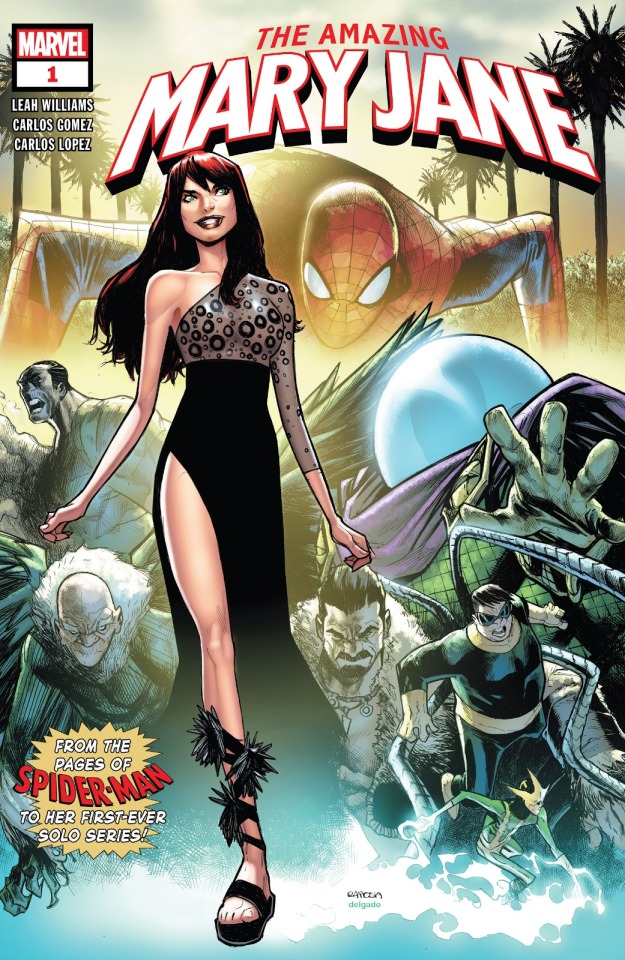
Previous Part
Next Part
Master Post
Now we’ve finally established all necessary contexts we can begin diving into the AMJ series proper. My intent is to break down each issue page by page.
Let’s get started.
We open with Mary Jane shooting a sizzle reel for the film’s investors. Evidently she is playing Mysterio’s super powered love interest.
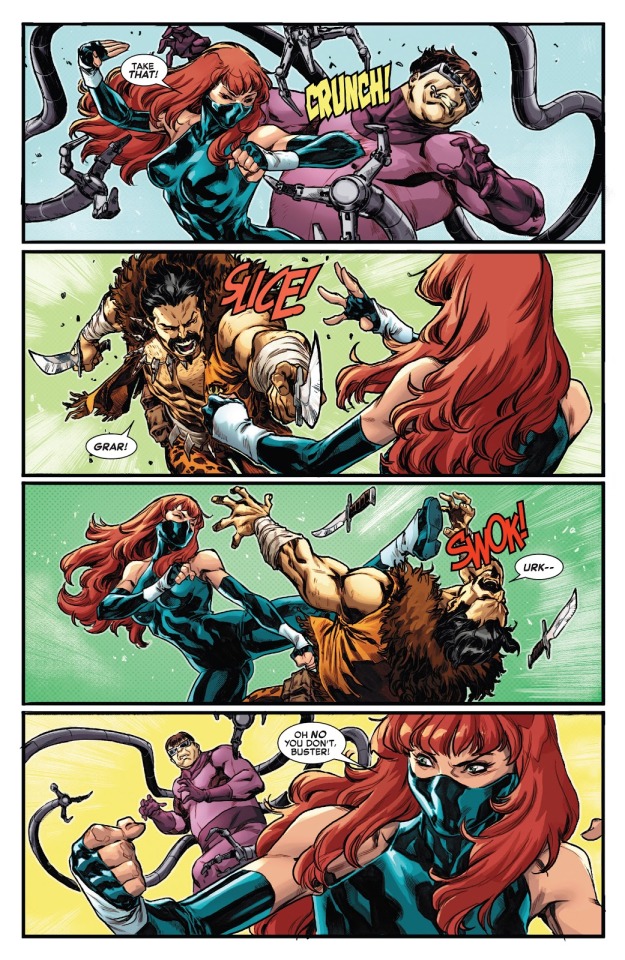
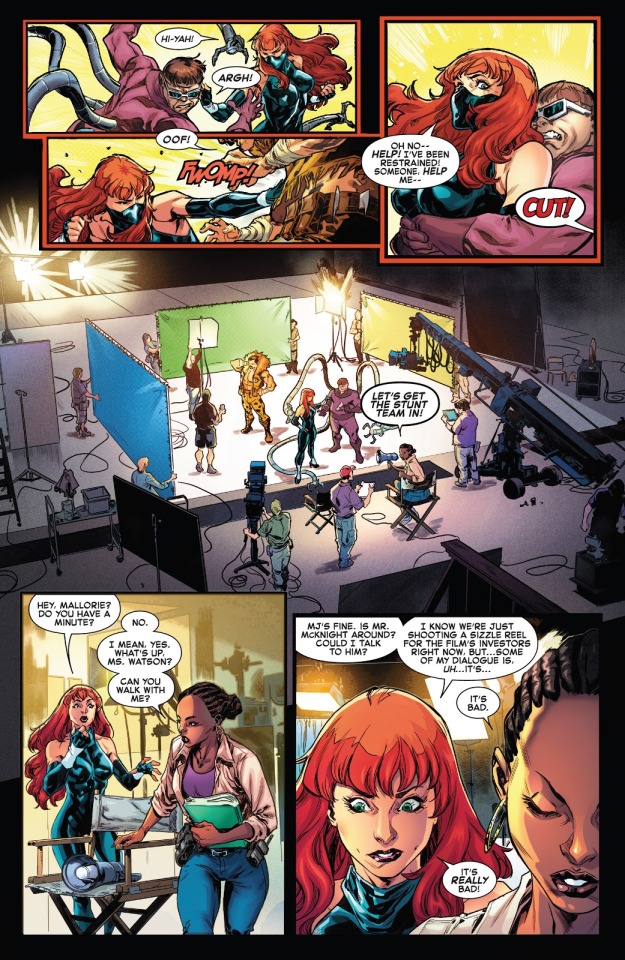
Here we get into our first few problem but I admit it might not actually be a problem.
See, ASM v5 #29 established that MJ has already seen McKnight’s ‘reel’ so why are they filming another sizzle reel?
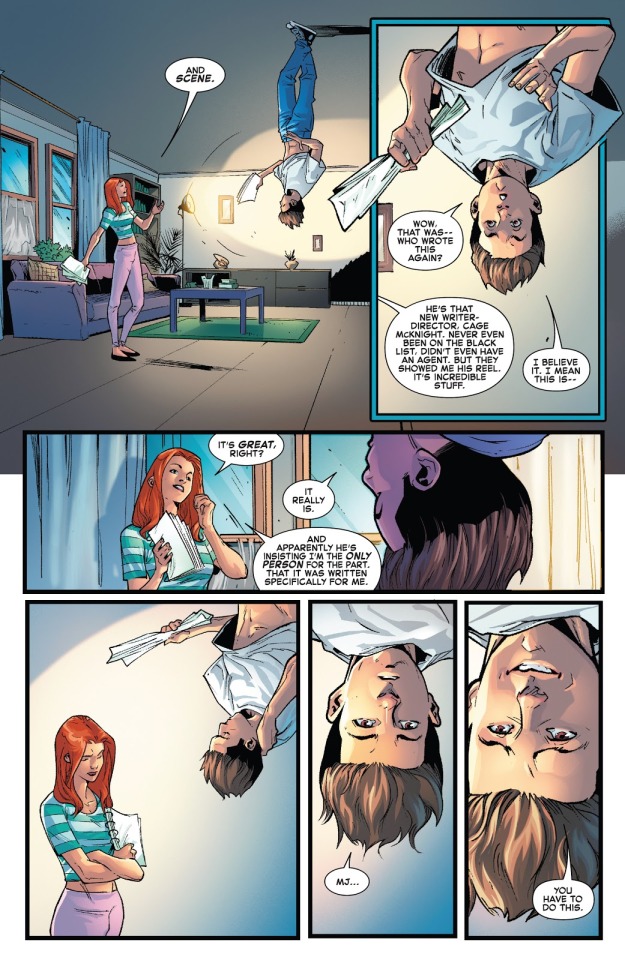
I admit to being in the dark about Hollywood practices so this might be perfectly normal and therefore not a contradiction. Let me know if that is the case.
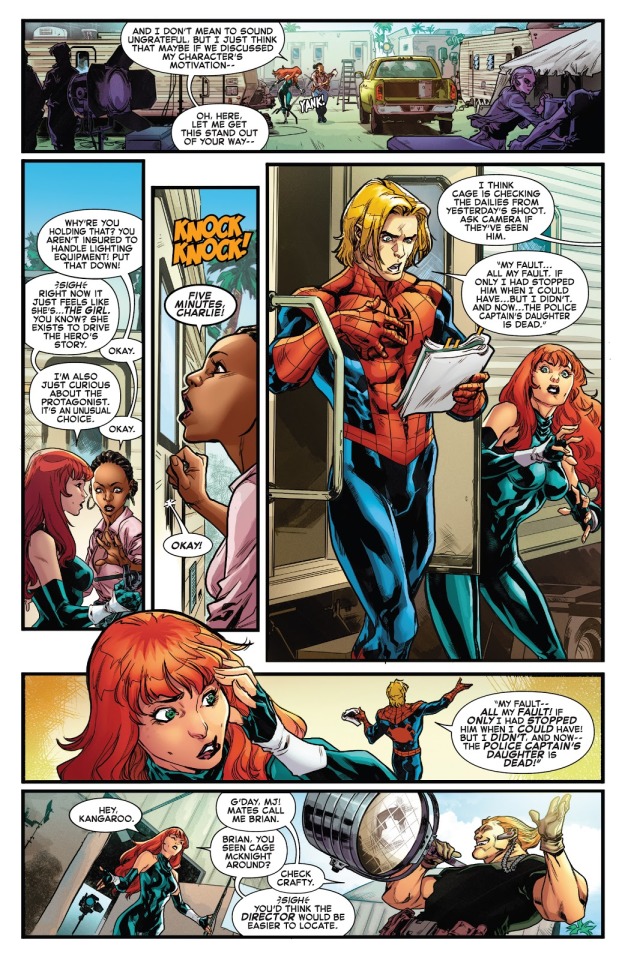
This page introduces yet more problems though they too are rather minor.
The smallest of these is depicting Kangaroo as Australian. Last I checked (and I admit I might be mistaken about this) the Kangaroo was in fact NOT Australian. Or at least this version of the character isn’t as he is the second Kangaroo merely inspired by the original.
That’s a tiny nitpick but I thought I’d mention it. And it’s one that’s easily explained away. He could be emulating an Australian accent for effect or something like that.
The more notable problem is that MJ is deriding the script. This contradicts MJ’s statements in ASM v5 #29/830 where she is praiseworthy of the writing after immediately reading through some of it with Peter.
You could argue that perhaps MJ was commenting upon the script in general and not specifically her own part. As in her starring in this movie would be great for her career because the movie in general was looking to be great. Or alternatively the script for the sizzle reel was bad.
But consider that the script is directly based upon Webspinners #1-3, which (again I might be mistaken about this too) I do not recall ever featuring Mysterio’s would be lover as anything like a super heroine.
Again, this is reconcilable. Rewrites happen. Embellishments on the truth happen.
But to me the reality seems be that either Williams was unaware of the movie being based upon Webspinners (which is entirely possible) or that she wanted to go in another direction for the story.
Either way, it’s a weakness of the comic book but not a deal breaker of a problem.
This page also represents one of the problems from an analytical standpoint with this series.
There is a certain amount of ambiguity through the writing and art in regards to what Mary Jane (and other characters) might be thinking and feeling.
Look at MJ’s baffled face when looking at the Spider-Man actor on the above page.
My initial impression was that she could be simply weirded out by seeing an overdramatised version of her lover. In particular when he’s going over a tragic event in his and her own life (Gwen’s death).
It could just be bafflement over why that’d even be in the movie. After all what has Gwen’s death got to do with the life of Mysterio. I guess Spidey’s implication in Gwen’s death was public knowledge but it still has nothing to do with Beck.
Alternatively that facial expression might (and I emphasis this as speculation) represent MJ’s confusion and concern about that being included in a film. That is to say that’s something of a personal cut for Spider-Man and Mary Jane’s life. She could be wondering if someone knows the truth about Peter’s identity?
If the latter is the case it might go some way into alleviating and explaining other problems I have.
But I just don’t know, because the comic is not making it clear-cut. To my eyes that look says ‘this is so surreal’ and doesn’t say ‘This is concerning. Could Peter and I be in danger?’
However if that was the intention it might’ve been intended to then organically transition into the acknowledgment that there are literal super villains on set and the consequent page in which MJ comments that Cage McKnight fleeing is suspicious.
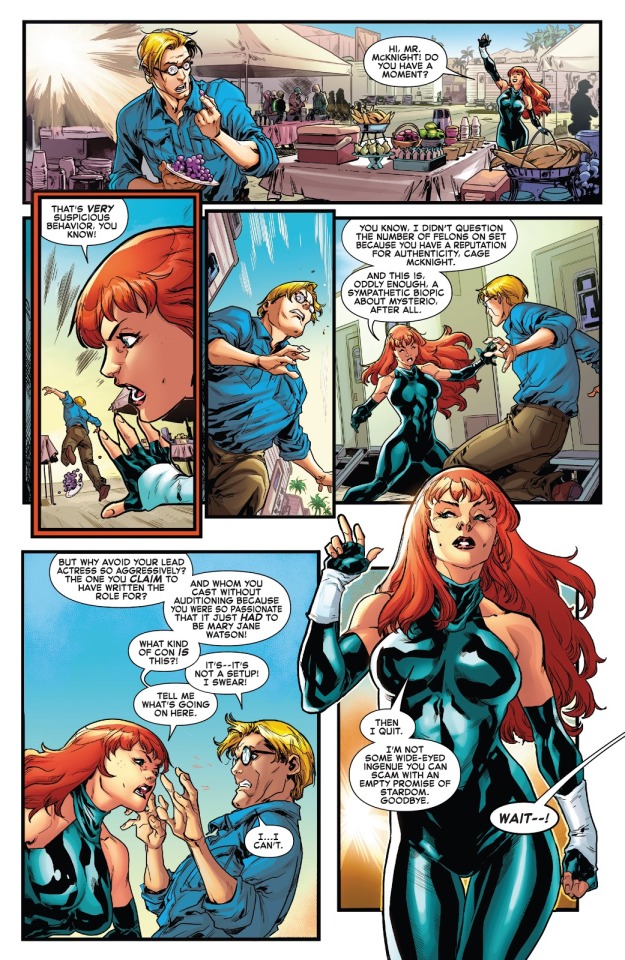
Here is where we’re starting to get into the bigger problems, but let’s start with a smaller one.
The scene implies that McKnight is a an actual person and a respected filmmaker. This is again contradictory to ASM v5 #29. There MJ referred to McKnight as very new, as someone who lacked an agent until very recently. The implication by Spencer was clearly that McKnight was a false identity that Beck invented. Williams/the editors is clearly ignoring that. That’s not a good sign, although it’s not irreconcilable. It’s entirely possible that MJ’s dialogue in ASm v5 #29 in-story was actually true.
Mary Jane comments that there are felons on set. She didn’t question this because Cage McKnight has a reputation for authenticity.
This line can be interpreted one of two ways.
a) MJ didn’t question actual criminals on set and didn’t do anything about it.
Or
b) She phrased herself badly and what she meant was former felons, or that she presumed they were reformed/reforming felons.
The latter is a-okay, the former though....wtf?
MJ’s lived with a man who she knows spent most of his life torturing himself over allowing ONE criminal to walk free. She’s on set with a whole crew of criminals, including super villains and she’s shrugging it off? She’s not even questioning it?
‘Authenticity’ be damned, it’s illegal and potentially dangerous to knowingly harbour criminals, let alone super powered ones.*
But again, I’m willing to give the benefit of the doubt on that line. Between Cage’s reputation and the fact that so many criminals are working out in the open its not unreasonable for MJ to take it on faith that everything was on the up and up (even with the presence of super villains). After all the only confirmed super villain on set is the D (or Z) lister the Kangaroo who has at times been one of the good guys.
Mary Jane though is smart, socially savvy, can get a decent read of people and did study psychology for a time (she never completed the course but still). So she can tell something weird is up and it’s clear the intention is that she’s been growing suspicious for a while now.
In this essay series I don’t plan on praising the issues as that’s not the point. Besides I do that in other posts anyway. Nevertheless it’s worth pointing out that Williams really hits the mark on MJ’s personality here.
Her statements about Cage ‘claiming’ to have written this role for her (where she conveniently plays the love interest to a super person) and simply handing it to her imply MJ is detecting a trap. This touches on what I said above about her facial expression. About how it’s possibly intended to float the idea that she’s concerned that someone’s figured out Peter’s secret.
However, she could just as easily be thinking this is a trap specifically for her. After all, she’s been targeted by stalkers before (like Jonathan Caesar). That interpretation is arguably supported by MJ’s line about being scammed with an empty promise of stardom. Even if she doesn’t think this is some kind of super villain grand scheme of any kind it’d likely ring alarm bells for any young and (by stereotypical standards) attractive person in Hollywood; at least it would nowadays.
As we move onto the next page Cage reveals himself as in fact Mysterio and confesses he engineered this con in order to tell his life story.
He proceeds to inform MJ what is and isn’t real about the film and explain where the real Cage McKnight is. In doing so he admits that the film is happening through fraud, identity theft (sorry I don’t know the correct legal terminology) and the hiring of former felons and active criminals.
More specifically he produces (what he claims to be) a live video feed of the real Cage McKnight’s location on the Falkland Islands where he will be spending around a year on a film project that doesn’t actually exist. He also claims that this project is his last chance to do something good with the ‘time he has left’ (implying he is dying) and that he wanted to give the felons and criminals a similar chance to make something good and meaningful.
After being honest with her, MJ admits this situation is insane, but then agrees to go along with it.
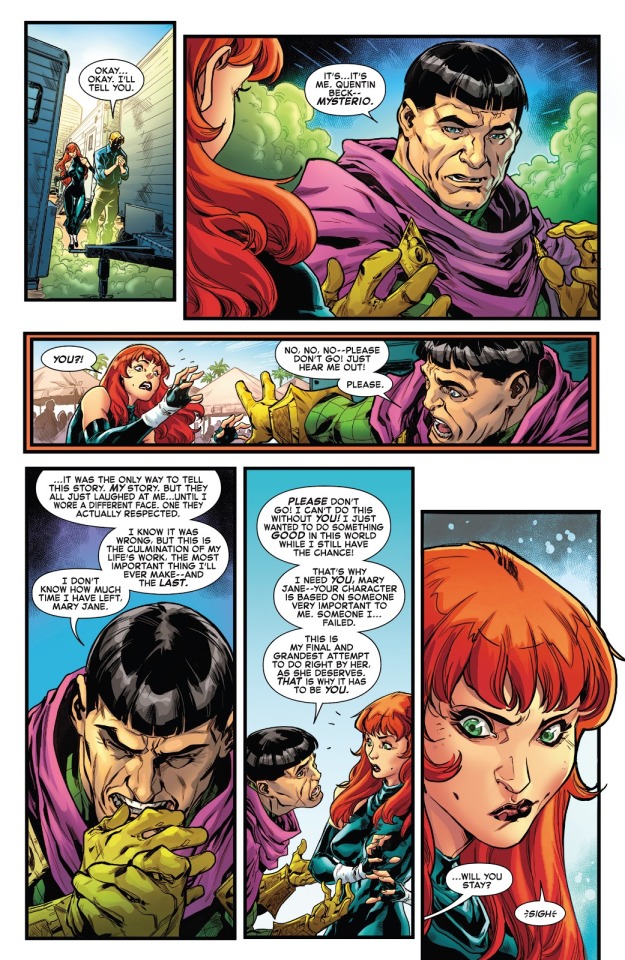
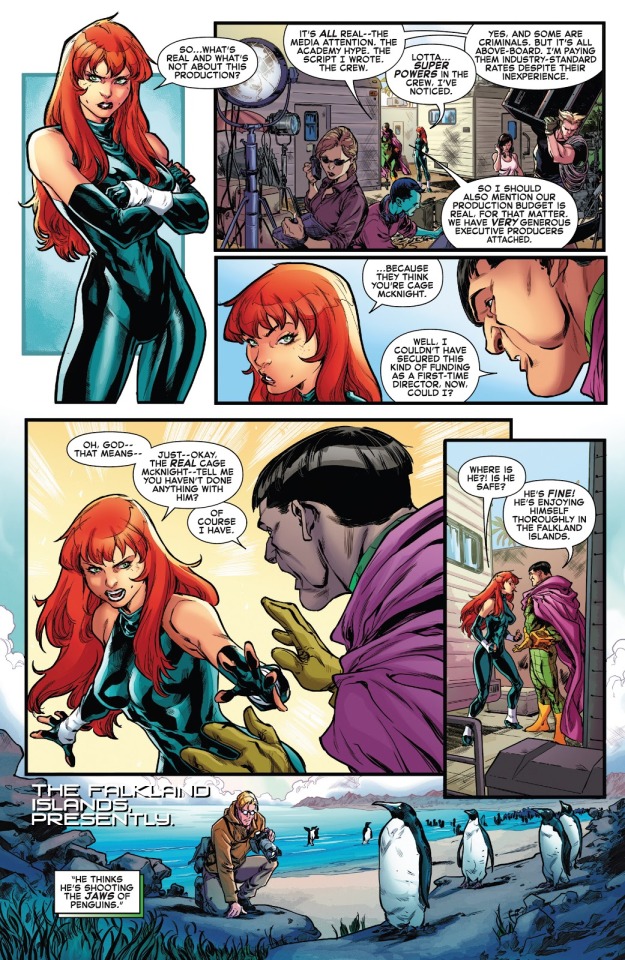
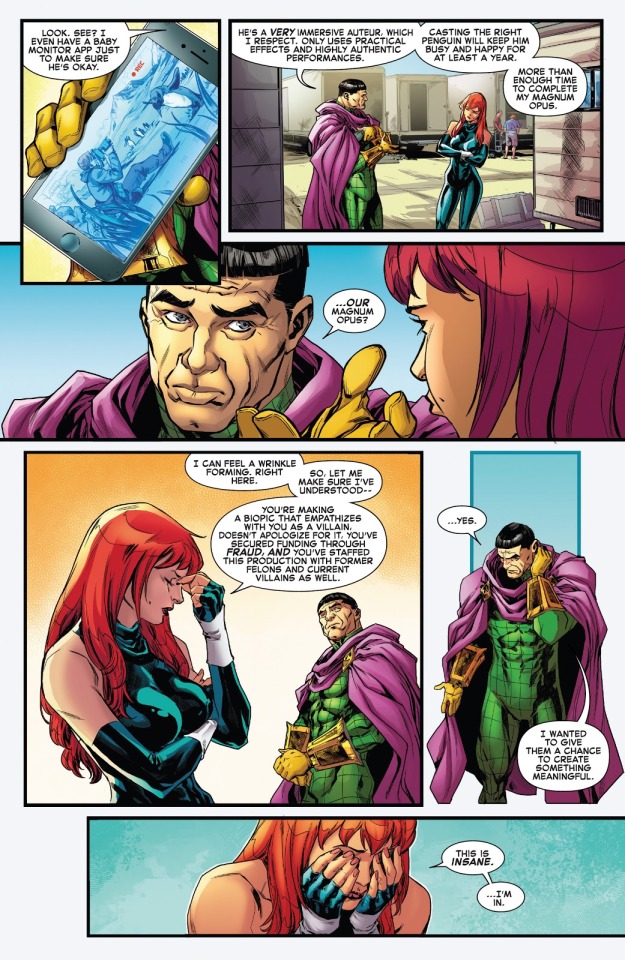
First of all let me get this out of the way. Mysterio has actual active criminals on set but he also wants media attention. Isn’t that counter productive? The media are going to report that (some of the crew are obvious more than human, with green skin no less) and it’s going to cause both unwanted attention from the authorities and problems in general.
With that said let’s talk about the bigger issues with these pages.
Part of the problem in analysing them is that it we have to consider things from the POVs of MJ, Mysterio and our own (which is semi-omniscient).
We know Mysterio:
Is in the employ of the demonic Kindred who’s working a vendetta against Spider-Man.
Faked his own death again back in ASM v5 #24-25
Is doing this movie to make the most out of his time before he is dragged back to Hell
Is aware of Peter’s identity and that it’s highly likely he demanded MJ’s inclusion in the movie (whether of his own volition or on Kindred’s orders) specifically because of her connection to Spider-Man
Essentially we know Mysterio’s reasons for making the movie (including his limited time) are true…but they also omit certain important facts.
In other words…he’s acting.
He has legally (and more often illegally) worked as an actor. He was able to fool executives who literally work in the film industry where actors are basically a prerequisite. He is a massively skilled manipulator.
And here, the context the audience are aware of, conveys that he’s using the truth to get what he wants but is nevertheless withholding the real truth. Maybe this will be addressed later but at the moment it is beyond unlikely that Mysterio truly felt MJ was simply the only person to play his love interest. She is obviously there because of her connection to Peter.
Me personally though, I am not exactly certain Williams wrote this moment with the idea that Beck was being actively deceptive. My personal impression is that she was writing Beck as sincere and simply vulnerable because he knows he'll be returned to Hell soon. This vulnerability would be the reason for his opting for honesty. Now I don’t have any evidence to back that up I will admit, we will have to see as the series progresses.
But the most important thing about this scene isn’t our POV nor Beck’s, but MJ’s.
She is the lead character the person the story revolves around, her actions, decisions and agency is what is paramount in the context of this series.
From that perspective these three pages alone put us several layers into serious mischaracterization.
MJ wouldn’t help Beck because he’s hurt her loved ones
Even if he hadn’t she wouldn’t trust him because of the other horrible things he has done that she knows about
Even if she didn’t know about those things she knows his M.O. and abilities and thus wouldn’t trust him
Even if she sensed sincerity she’d not help him because he’s committed and still committing several serious crimes and unethical actions in this very story
Even if she believed those crimes weren’t so bad and that he was sincere she’d be smart enough to consider the possibility that he’s tricking her and double check what he’s told her
If she presumed (not that there is any evidence of this in the comic) that Beck was out legally and she ignored him obviously engaging in identity theft, she’d still double check those fact and learn that he has in fact escaped.
No matter how you slice this Mysterio is very much in the wrong here and so is Mary Jane. She even admits it’s insane and then agrees to go along with it.
Not only is she out of character to nuclear levels but even if this was a completely new villain MJ had never heard of before the mere fact that he’s clearly committed serious crimes to get to this point and is going to continue to do so (chiefly by impersonating McKnight) should be enough to make her her to bow out.
There is soooooooooo much more I could write about this because it cuts to the heart of the problematic premise as presented by the issue. However I will dive more deeply into that in numerous future instalments once we are done with issue #1.
Moving onto the next few pages, MJ predicates her agreement on the condition that her role be rewritten to improve her character.
This is a fact that she explains will actually improve the film over all. Their discussion occurs as Mysterio gives her a tour of the set and they chat about rewriting her character.**
During the course of this tour Mysterio unveils some of his film techniques and (at least seemingly) confirms what is and is not real about the production. Among the techniques he is using are his incredible holographic technology and his robot duplicates of the X-Men from ASM Annual #1.
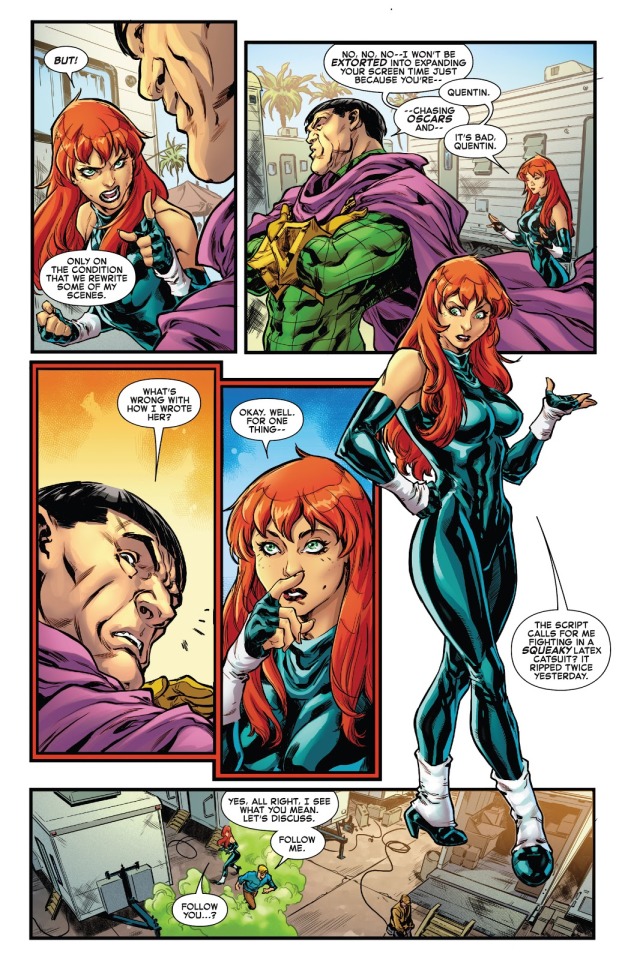
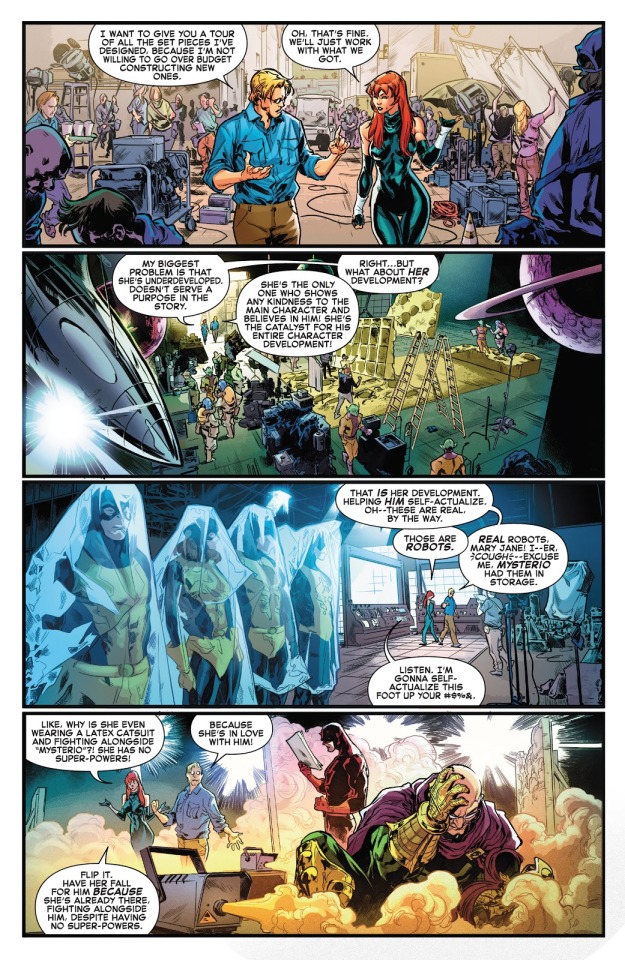
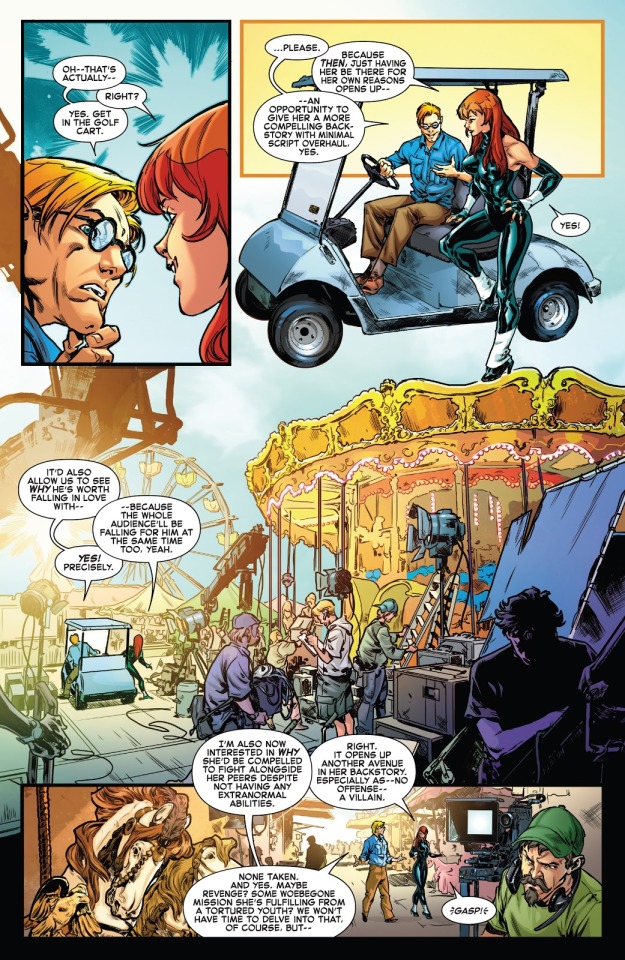
This tour also includes a direct reference to Mysterio’s suicide from ‘Guardian Devil’, implying the artist and editor at least are aware of the events of that story. I’d like to imagine Williams is too. Regardless it’s problematic for the comic to acknowledge those events but treat Mysterio sympathetically in light of what he did in that story. And needless to say it’s problematic to write MJ as so chill around Beck in this scene/comic given how she knows about those events because she was in the story!
Anyway, MJ gets excited by the prospect of a spin off sequel. That in turn prompts one of the crewmen to imply she got her job through ���womanly wiles’.
This enrages ‘Cage’ who assaults the man, an event witnessed and recorded by the surrounding crew. As she witnesses these events her self MJ has a curious facial expression.
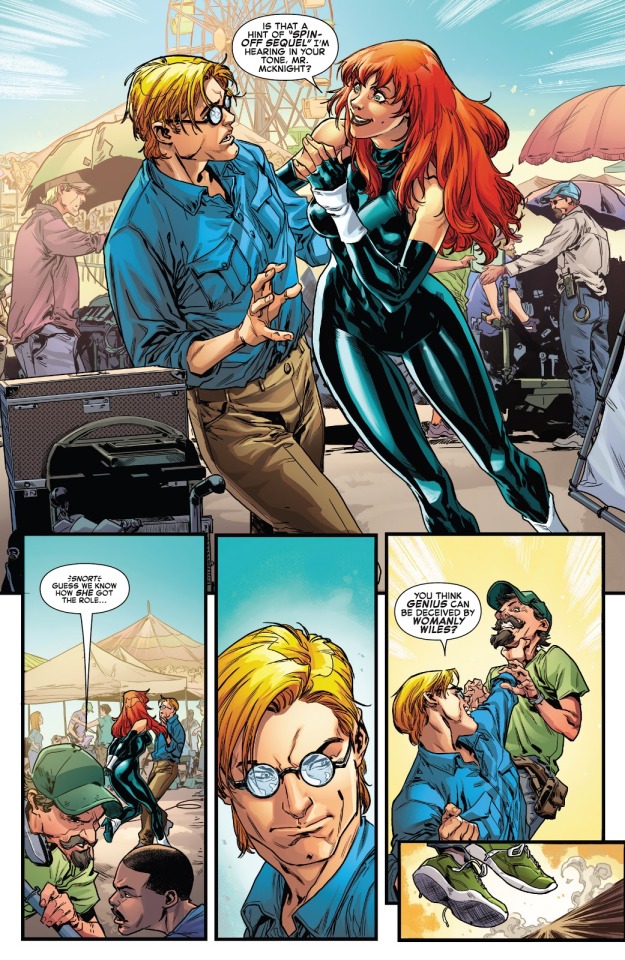
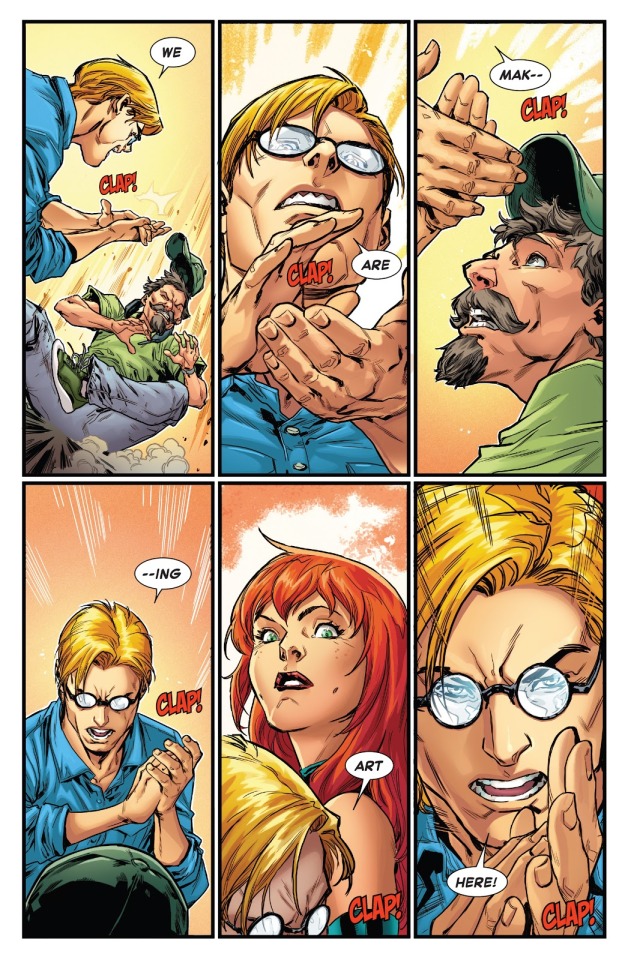
Much like her expression seeing the actor playing Spider-Man, MJ’s face here is difficult to interpret.
It could mean any number of things.
Could she be viewing Mysterio as someone she’ll have to play carefully?
Is she thinking she’ll have to do her best to ensure he doesn’t get out of hand, whether it’s for her own protection or others’?
I do not know. It’s kind of vague. Hopefully it’s meaning will become clear in consequent issues, but if I’m supposed to understand clearly what it means in this issue then Williams or Gomez dropped the ball.
Something they didn’t drop the ball on though is Mysterio’s characterization. It’s worth mentioning out of fairness that this emphasis upon Mysterio as a passionate artist is extremely in keeping with his character and Williams handles him expertly on this front.
Beck finishes up his tour with a recreation of a scene from ASM #66-67 and MJ is delighted by the fun she and Mysterio are going to have in making the movie.
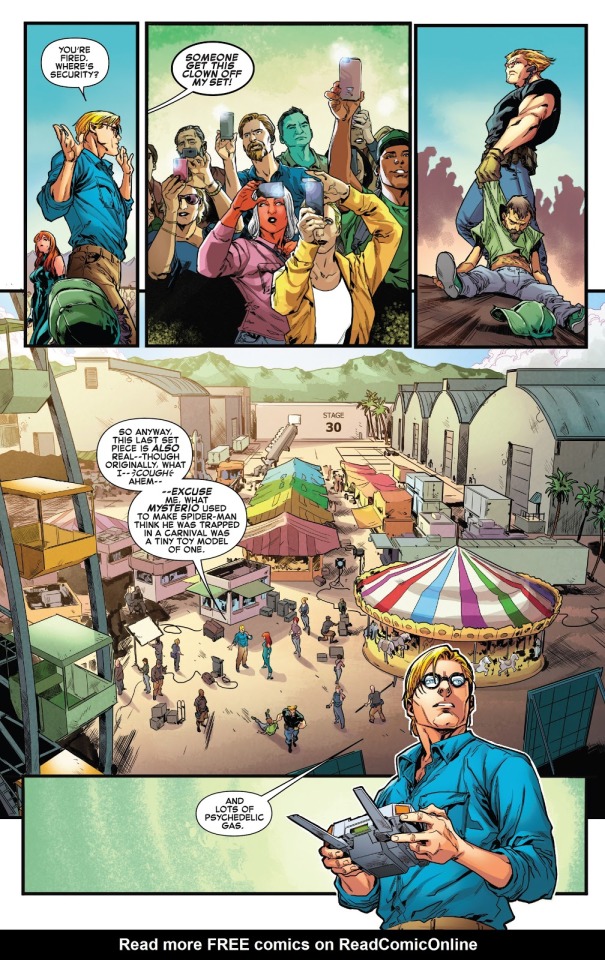
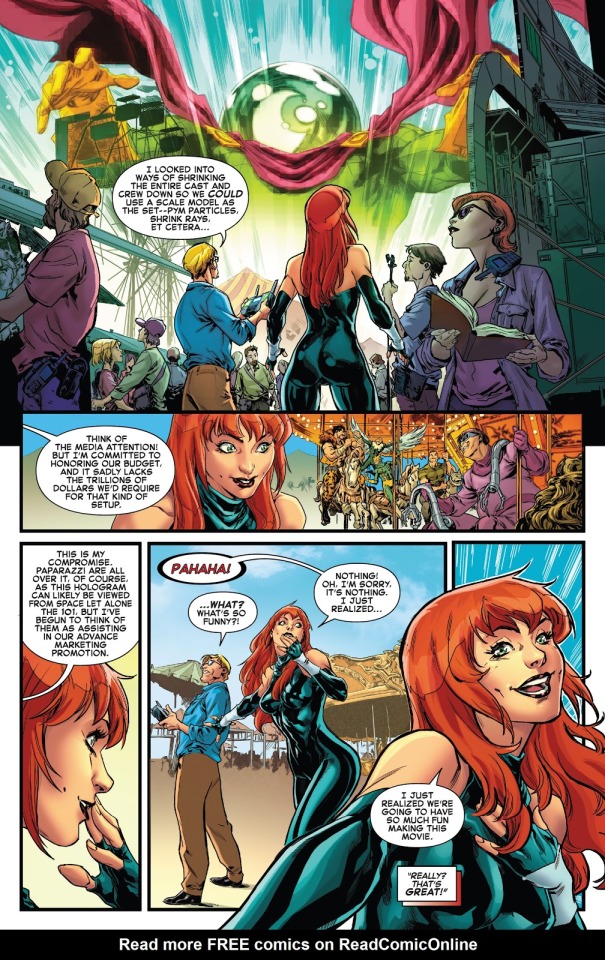
Notice that Beck directly references how this set piece is recreating a trap he laid for Spider-Man, how he used psychedelic gas to trick his mind.
In essence this is Mysterio simply stating outright to Mary Jane that he once tried to harm her boyfriend and even drugged him to that effect.
And MJ’s reaction to this is…to giggle with glee.
Really?
She doesn’t even show any hint of apprehension over that? We the readers aren’t even made privy to an internal tensing or recoiling on MJ’s part to this man just casually mentioning a time he sought to end the life of the man she is in love with?
Seriously, what the fuck. You better believe we’ll be talking more about this too.
Even from Mysterio’s point of view it muddies the waters of his motivations. As we extensively examined in prior instalments, it’s very likely that Beck knows Peter is Spider-Man, and thus by extension probably knows that Mary Jane is his lover. So it’s incredibly stupid on his part to blithely mention to MJ a time he drugged Spider-Man and tried to kill him.
Alternatively let’s say Beck’s hiring of MJ was in Kindred’s orders and he is unaware of the exact connection between her and Spider-Man/Peter. It’s still stupid because he’d still be able to deduce she very probably has something to do with Spider-Man because he knows Kindred wants her out of the way as he wages war on the wall-crawler.
The fact that Beck is written this way indicates Williams is unaware of the Spencer ASM issues which set up AMJ and/or doesn’t care and/or the editors aren’t doing their due diligence . Regardless it’s a major weak spot of the story. It either breaks the larger narrative that exists between the two titles or it renders Beck out of character via his stupidity.
The latter would be true even if Beck simply wanted MJ in his movie just because he liked her as an actress. He’d still be throwing out the fact he drugged and tried to kill someone (a former Avenger no less) in his past.
As the story progresses MJ and Peter have a chat on the phone where she makes a point of alleviating any discomfort he might have over making a sympathetic Mysterio biopic, claiming it is the Breaking Bad of super hero films. She continues by pointing out the career opportunities the role presents.
Peter raises concerns for MJ’s safety, suggesting she might find herself surrounded by villains; ironically unaware that Mary Jane is in that exact situation.
MJ assuages his concerns by reminding him of the time she defeated an actual super villain (the Chameleon, though he goes unnamed) with just a baseball bat.
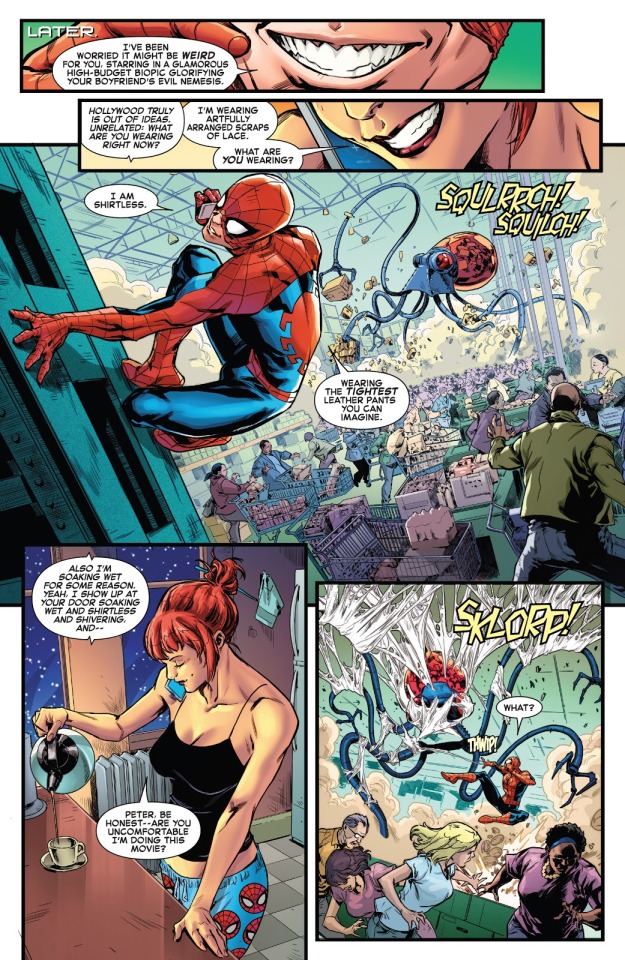
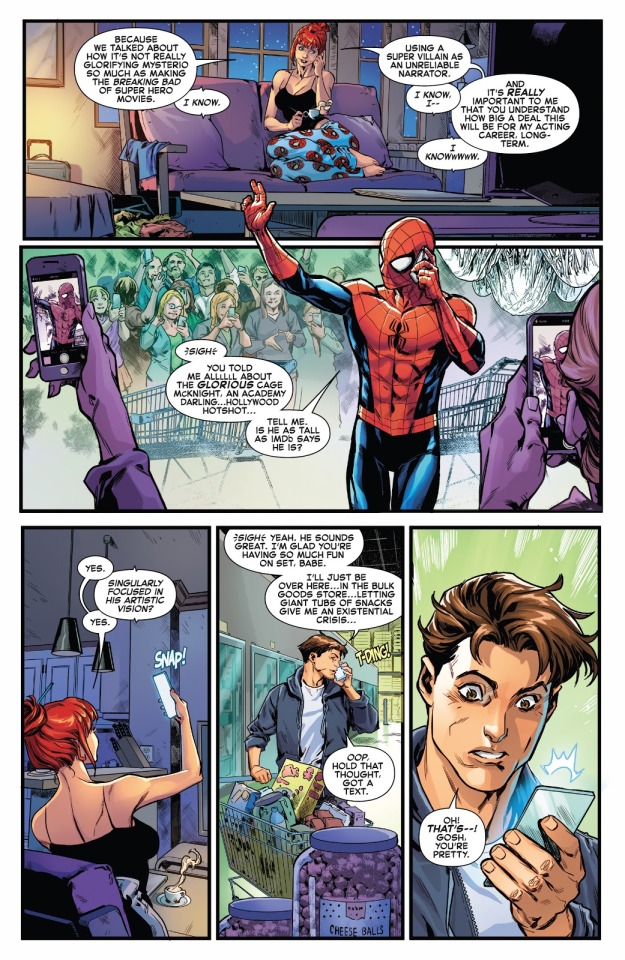
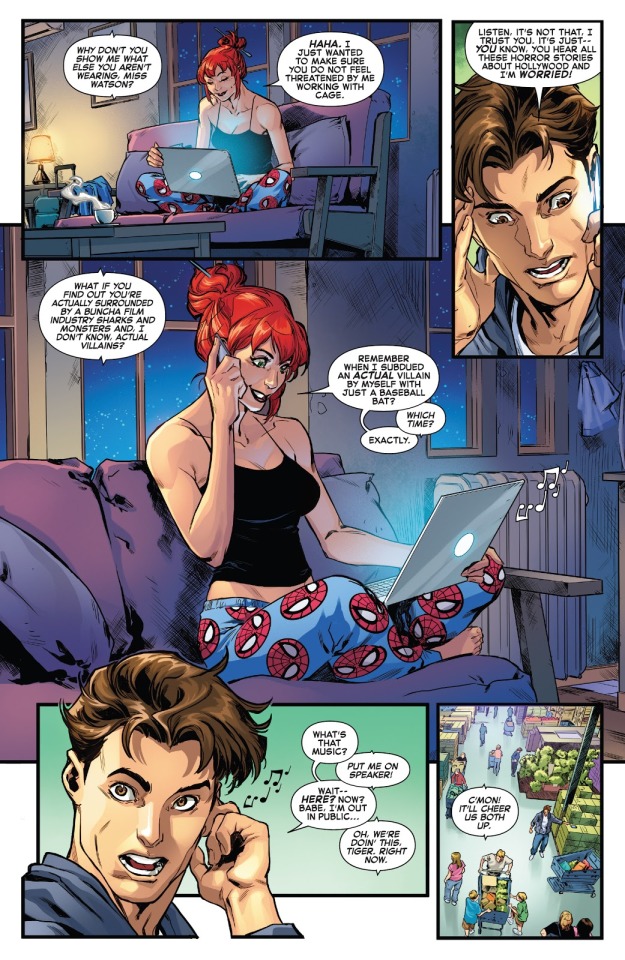
MJ’s statements regarding the movie are arguably contradictory.
Earlier in her conversation with Beck MJ stated that the film empathizes with Mysterio and doesn’t apologise for it.
But then at the end of the story she tells Peter that the film actually isn’t glorifying Mysterio. Rather, it is making the Breaking Bad of super hero movies with an unreliable narrator.
This isn’t necessarily irreconcilable, but it is somewhat poorly communicated on Williams’ part. Breaking Bad’s defining message was that you shouldn’t be like Walter White. That he was in the wrong, even from the very start.
Why would Mysterio ever write a film about himself in that light? It doesn’t make sense and it would contradict MJ’s dialogue about how the movie empathises with Mysterio as a villain and doesn’t apologise for that. Breaking Bad wasn’t empathetic towards Walter White, it showed him very clearly as a monster and its final episode had him admit that fact.
Moreover if the film empathises but never apologises for Beck (and is directed by him personally) then isn’t that tantamount to glorifying him?
Because of this the issue leaves us with three possible interpretations of Mary Jane in this moment.
She is either:
Blinded by the prospect of fame and/or fortune and/or excitement and as such cannot see that the film obviously is glorifying Beck. To an extent we’ll talk more about this in a future instalment. Suffice it to say that’s very out of character
She is outright stupid, which is also out of character
She is deliberately lying to Peter about the artistic nature of the film project. There is a strong case (that we will get to) for MJ lying to Peter about Beck being out of character for her. However, were this a regular film production it might not be an OOC move for her. She wants to make the movie and alleviate her boyfriend’s feelings for the moment. Fibbing to keep their long distance relationship healthy and happy and hopefully being more straight with him when it’s over is not an unreasonable thing to do.
Options 1)-2) don’t exactly paint Mary Jane in a positive light, nor does option 3) necessarily.
MJ just isn’t this stupid, isn’t this capable of being star struck (she’s seen too much serious shit in her time for that) and lying to the love of her life about something like this is questionable. On the latter point it can be argued that there’d be no advantage of her lying to Peter about the project because he’s obviously going to find out when the movie is released.
Personally I suspect Williams never intended to imply any of the above interpretations.
I think she or the editors just didn’t catch that the dialogue at the end of the issue contradicts the dialogue from earlier. Which would be bad writing/editing but not demonstrative of Williams not fundamentally understanding the character. On occasion Stan Lee himself mischaracterized Spider-Man by accident.
Nevertheless a moment that reflects badly upon MJ.
The last moment from this scene involves a ’20 second dance party’ between MJ and Peter.
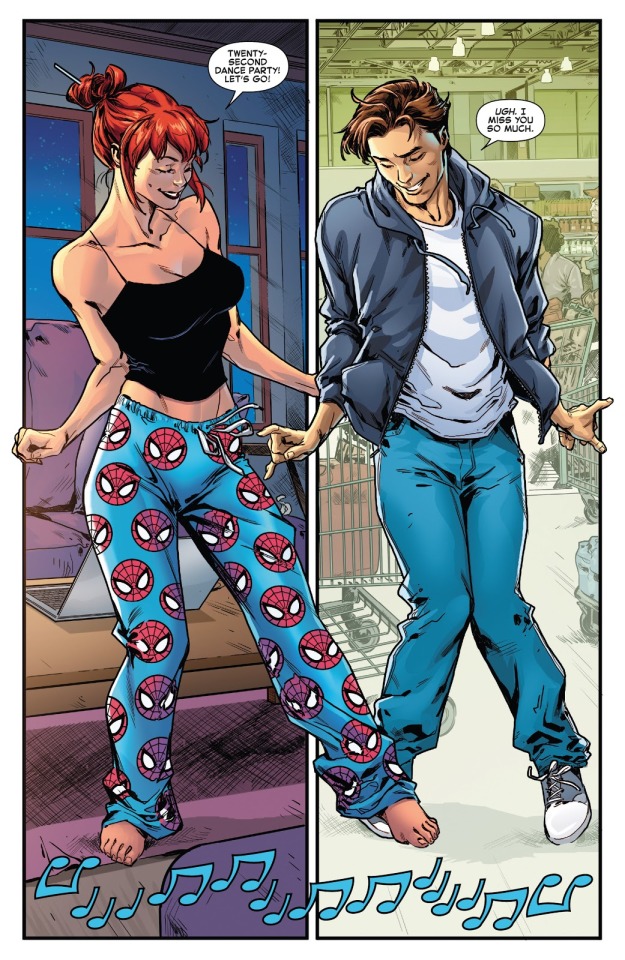
Its only relevance to this analysis is to exemplify some ways in which Williams nails Mary Jane’s character.
She’s flirtatious, she’s vibrant, she loves to dance, she loves to party, she can get the overly serious and often angst ridden Peter to emerge from his shell. Combined with MJ’s savvy earlier in the story, her tenaciousness and references to old continuity I can absolutely understand why Williams seemed like a good pick for the project.
But it’s moments like these that frustrate me about this comic (and I suspect the series going forward). It’s not that Williams fundamentally misunderstands Mary Jane but she drops the ball in a few places. Unfortunately those include drops that are so huge that they break the entire story. At least that will be the case if she doesn’t fill in the holes in her narrative.
The end result though is an extremely mixed bag wherein you have logic holes and mischaracterization so bad it debatably counts as (unintentional) character assassination but at the same time some of the absolute best Mary Jane or Mysterio moments ever! The 20-second dance party is going to be fondly remembered by every Mary Jane fan and MJ/Peter shipper forevermore, and rightly so.
But equally, unless properly justified in the future, MJ knowingly teaming up with Mysterio deserves to go down as one of the all time worst out of character moments for her ever.
The final relevant thing from the issue to talk about is the last page. It entails the Vulture’s gang of villains (the Savage Six) reading an article about the Mysterio biopic and deciding to head for L.A.
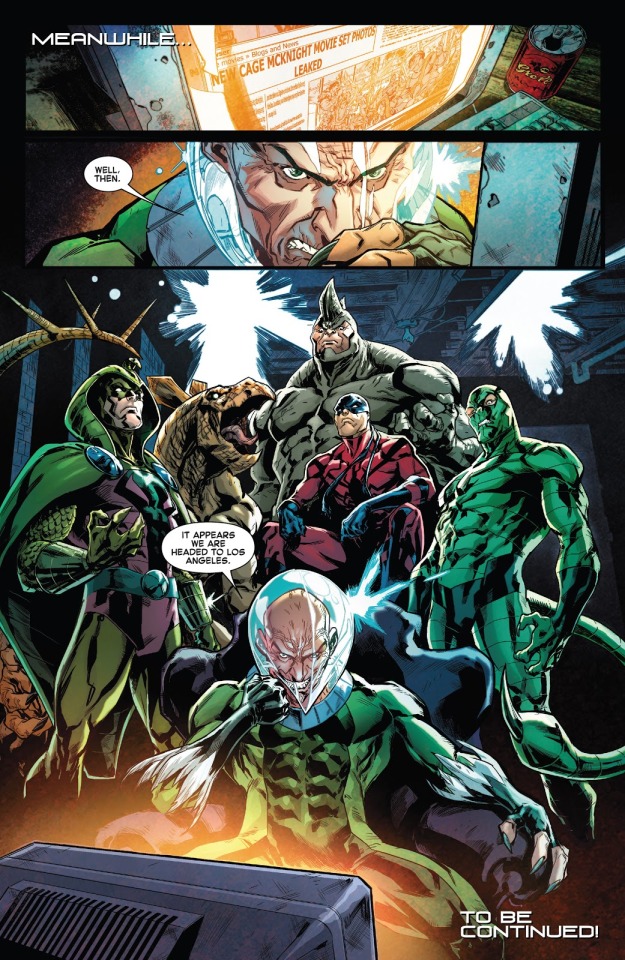
This is only really relevant for two reasons.
The first is the set up it supplies for future issues.
The second is that the article specifically talks about leaked set photos.
This further plays into the confusing nature of Mysterio’s scheme. He wants the media interest to act as a form of publicity (arguably this leak is an example of that) but he also has current villains on his staff. Wouldn’t the press be likely to find out about that and thereby jeopardize the project?
Reputation for authenticity or not, that’s extremely illegal.
With aaaaaaaall that said it’s time to move onto dissecting the status quo set up by this issue.
It’s all subject to change of course. Williams might address each and every problem eloquently at some point. But taking it at face value I am going to dedicate one (or more…) instalment(s) of this essay series to exploring the problems presented by this premise.
*We will talk much more extensively about this in a future instalment I promise you.
**By the way I don’t quite understand what MJ is asking her character to be rewritten into. She asks why she’s fighting without super powers but then says she should already be doing that in the story and that this is how she falls in love with the hero?????????????????????? Maybe I’m being dense but that just wasn’t clearly communicated to the readers).
Previous Part
Next Part
Master Post
#Amazing Mary Jane#Leah Williams#mjwatsonedit#mary jane watson#Mary Jane Watson Parker#MJ Watson#Spider-Man#Carlos Gomez#Mysterio#quentin beck#Peter Parker#Savage Six#Adrian Toomes#X-Men#vulture#The Vulture
11 notes
·
View notes
Text
Were we Gay-Baited? The Issue of Will and Byler/Byeler, a Discussion of Apophenia, Identification, and Empathy
I’ve been struggling with my own feelings since finishing Stranger Things 3. Curiously, I find myself being overcome with rage and disappointment, which isn’t how one is usually meant to feel about a TV show. It wasn’t a bad season by any means, though I do think it was the weakest of the three so far. The one biggest point I find myself stuck on is the treatment of Will Byers, not just as a character, but as a reflection of my own experiences and feelings. Identification happens all the time when we engage with fiction. Sometimes we are meant to do so, while other times it is due to how we interpret otherwise ambiguous aspects of a character or story. It’s an aspect of empathy, as we’re feeling the emotions (or at least what we believe to be the emotions) of a character. I identified with Will back in Season 1. It looked like they were building, slowly, but surely, towards Will being gay, and I let myself build this idea that his struggles with the Upside Down and the Mindflayer were a metaphor for him coming to terms with these feelings he had for his best friend. I saw the Upside Down as an allegory for being in the closet. A dark, lonely, scary version of the real world. I don’t know if Barb was meant to be seen as a lesbian, but I latched onto that as support for my theory. It was after being left alone by Nancy that she is captured and killed by the Demogorgon. She felt alone and rejected, and subsequently was consumed by the despair that comes with hiding. Will, however, was able to get out due to the overwhelming love and support of his friends and family. Was I wrong to make this assumption? Possibly. Then Season 2 happened, and I don’t know what else we were meant to think.
For reasons we never really find out, at least in the show itself, Will finds himself being stalked by the Mindflayer roughly a year after escaping the Upside Down. This creature wants Will, and apparently only Will. The simple explanation, I suppose, is that it wants what it sees to be his. Will got away, the Mindflayer isn’t ok with that, and this all ensures that our main cast are at the center of the story. I read into it deeper though, which was probably a mistake. This happens during an election year, and Reagan signs are prominently displayed. The AIDS crisis was in full swing, and still mainly seen as a gay disease. Will still doesn’t feel safe, and doesn’t even fully understand how he feels. He flashes back into the Upside Down, feeling targeted and watched. Mike is generally able to pull him back out, and Will seems to seek out the safety of his best friend. Mike is the only one he trusts. Mike is safety, comfort, and unconditional love. He’s special, at least to Will.
It is again love that saves Will. Joyce, Johnathan, and Mike get through to Will by sharing stories meant to express how they feel about Will. Joyce loves her son, and is proud of his rainbow ship. This was unnecessarily specific if it wasn’t meant to be gay coding. Johnathan shares the building of Castle Byers, Will’s safe haven, after their dad left, The same dad who would call Will a fag. We see Will start to waver, ever so slightly, as they start to reach him, but the kicker is when Mike starts. Mike shares the story of when they first met. He remembers it in surprising detail, and it’s the oldest memory out of the three so far mentioned. Mike is barely keeping himself together as he relates walking up to Will on the first day of kindergarten. He’s so overwhelmed by the memory himself, repeating that Will said yes to being his friend, as if he cherished it immeasurably, and goes on to say it was the best thing he’s ever done. Despite the Mindflayer’s control, Will himself is barely holding back tears at this moment and we see emotion on his face for the first time since being fully possessed. He’s able to start with the morse code. Mike is the one who ultimately broke through. I read this as him being the single most important person in Will’s life, but was it that, or was it simply that he was the last to speak? It’s hard to tell the intent here, especially as Mike’s attention leaves Will as soon as Eleven returns shortly thereafter. All we’re left with is a look at Mike when Will is asked to dance, and his fake smile faltering as he glances at Mike dancing with Eleven. More curious decisions that could be something, or may be nothing.
This brings us to Season 3, where my confusion, annoyance, and anger boil over more with each episode. We start with scenes that I felt did a good job showing an emotional conflict set up by the end of Season 2: how does Mike find room for both Will and Eleven? Mike is shown obsessively attached to Eleven, which is reasonable given his age and his fear of losing her again, and we also see him going to the movies with Will, Lucas, and Max. The latter scene is oddly double-date like, to the point where they don’t sit together, putting Mike and Will separate from Lucas and Max as if to highlight the two separate couples. Lucas and Max get some playful banter in (pretty much the last we see of their relationship this season), and Mike is shown still harboring concern for Will. I found it odd when Mike asked if Will was ok, as Will hadn’t really done anything unusual. The suggestion, at least to me, was that Mike is still paying close attention to Will, and this made sense, as he would have a fear of losing Will the same as he does with Eleven. After this we see Will mope over the amount of time Mike spends with Eleven, but he has no complaints about his other friends. His obsession over D&D is over the top and jarring, and very much out of character. He’s a fully fleshed out character with multiple interests, but all he wants to do is D&D, why? I don’t really have a great answer for that beyond it being bad writing just to set up a later scene. That brings us to their fight, which fully ignited my hopes that they’d continue this build-up.
Will loses it when Mike and Lucas seem to mock his campaign. They don’t really dislike it, they just aren’t engaged due to girl troubles. His anger, though, seems focused on Mike. Will feels betrayed, and laments his loss of the Party due to girls, but he never blames anyone but Mike, even though Lucas and Dustin are similarly focused on girls. He calls El a “stupid girl”, and that wouldn’t be unusual given the situation had we been shown any interactions between El and Will or given exposition to inform us that the two of them get along. Indeed, I got the impression that Will still hasn’t had any meaningful interactions with her, since it’s implied she’s constantly with Mike and only Mike. The only time we see her out with the Party, before the crisis begins anyway, Mike bails with her very quickly. Will resents El. She’s stealing Mike away from him. That’s how I saw it anyway, and I remember feeling that way many a time at that age. At this point, you might still be able to argue it was just Will mad he’s losing his best friend, but then that one line comes. “It’s not my fault you don’t like girls!”
This line could have been done in any number of other ways if the implication was anything other than Will is gay and has feelings for Mike (any maybe thought Mike might like him as well). Mike could have told Will he needs to grow up or that it’s not his fault Will doesn’t have a girlfriend. But, no, Will simply doesn’t like girls. Will’s reaction speaks volumes, despite him not being able to talk. Up to that point, Will had been jabbing Mike with accusations, but as soon as Mike says this he’s stone silent. Lips quivering and eyes watering, he stares at Mike in disbelief and fear. To his credit, Mike immediately realizes he crossed a line and softens his approach, something we never see him do when he fights with anyone else. The damage is done, however, and Will’s final words “I guess I did. I really did.” screamed of a breakup to me. Will thought it’d be him and Mike forever. He destroys Castle Byers in a rage, berating himself for being stupid. It’s no longer a safe haven for him, as it is filled with memories of his childhood. A childhood spent with Mike.
This whole scene is never addressed again by the two of them. Lucas is shut down in an attempted apology, and I saw this as Will not wanting an apology from him and not willing to discuss the situation. It still felt very aborted, as if that quick scene with Will and Lucas was meant to tell the audience that, nope, we’re not getting into that. He and Mike have no real significant interactions throughout the rest of the season, though Will is shown reacting negatively anytime Mike expresses his feelings for Eleven. Our attention is never really drawn to it, but it’s there. This takes us to the finale, where Mike’s goodbye to Will is oddly quick for friends as close as they were supposed to be. Mike expresses worry that Will would move on and replace him, and Will reassures him that such a thing would never happen. I like how they had Mike smile perhaps his most genuine smile of the season here, but it still felt odd. When they hug outside right before the end, it’s again quick and not indicative of the emotion that should be there. Will seems to linger in the hug a bit, but Mike staggers away to Eleven. Mike’s attention seems to be solely on Eleven as the Byers leave, though he glances back at the house that he shouldn’t really associate with her. The final scene is a near perfect mirror of Season 1 when he thought Will was dead. It was confusing, possibly intentionally so, but why?
Mr. Clark brings up apophenia when speaking with Joyce. It’s the tendency for humans to spot patterns where there are none. As humans, we like for there to be explanations for everything. There are no coincidences, we just haven’t figured out how things fit together. Part of me wonders if this whole line of conversation was targeted at fans, such as myself, who read too deeply into Mike and Will’s relationship, and possibly Will’s possibly homosexuality. I could understand how it could be used to cast doubt on Joyce’s fears. However, it ends up having no real bearing on the plot, as Joyce is relatively quickly shown to be correct in her suspicions.
In the end, I’m left to wonder if this whole idea of Will being gay, and possibly Mike and Will being subtextually written as a couple, was simply a case of apophenia. My empathy for Will and identification with him could have caused me to misinterpret things to fit my own personal experiences and unfulfilled adolescent wishes. The dissonance caused by what I thought and what I’m now seeing is what is causing my anger and disappointment. It’s having me relive what I felt so long ago where all I wanted was to see a boy like me happy on TV or in movies. I thought this was going to be what I never had, but, though we still have Season 4 yet to come, it looks like it was simply a case of seeing what we wanted to see. Still, the way they did it reeks of gay-baiting, and I feel used.
207 notes
·
View notes
Text
The Story of How Hannigram Became Canon to Those Who Are in Doubt
This post is mostly meant for the casual viewers who I noticed have joined Hannibal Subreddit after the news about the S4 negotiations. It is great that we are growing in numbers, but there seems to be a misunderstanding in regard to Hannigram (the romantic relationship between Will and Hannibal) and people who ship this pairing.
Hannigram is not a fanon pairing. It is not ‘just in the heads’ of silly girls or overly-romantic viewers. It is a canonically acknowledged couple that is supported massively by the cast and Bryan Fuller. Furthermore, this romance is the essence of the show, because Will and Hannibal find everything in each other. No, their relationship is not based merely on romance or sexual attraction. But also no, a more explicit romance in S4, which seems very likely and has been hinted at many times, will not destroy the complexity of the relationship. It will add to it.
The first part is canon evidence of Hannigram season by season. The second part of this huge post is tweets, quotes, and photos with Bryan and cast in regard to Hannigram. (Sorry, I can't seem to break the post in parts for easier reading, the formatting links don't work here for some reason.)
THE SHOW ITSELF
Season 1 is obviously the most ambiguous one in this regard because the relationship only starts to develop. And yes, the majority of scenes can be interpreted as the blossoming friendship, because it is a friendship first and foremost. Even several rather romantic moments can be technically classified as such — but only if you ignore the looks that Will and Hannibal give each other and the later narrative. Still, this is all ambiguous at this stage.
When Hannibal offers Will to take care of Abigail, he repeatedly calls them her “fathers”. Not “uncles” or “caretakers” or any other option — fathers, and while this word by itself might not mean much, it is clearly supposed to hint at what kind of relationship is going to unite Will and Hannibal in the future. In 1.07, Will doesn’t come to the appointment and Hannibal is pining. It is a very powerful and explicit scene, with Hannibal slowly walking to his chair, checking his calendar to make sure Will had to come, touching the phone longingly, then abruptly making a decision and going to look for him. All of this is accompanied by the corresponding music. Is this scene romantic? Some may see it this way, some may disagree. But I think most will agree that such obvious pining is a common romantic trope that's often shown in media. The focus and the way the scene is presented are everything: they didn't just show that Will didn't come and that Hannibal decided to find him. No, we had a slow focus on all his hesitant actions and his longing for contact. In any way, at this stage, it is no longer a mere friendship. It goes deeper, to the point where Hannibal can’t stand not knowing where Will is and craving contact enough to drive for hours in the search for him.
Once again in 1.07, Will brings Hannibal a bottle of wine out of blue and acts awkwardly and shyly when declining the invitation to join the dinner party. We don’t know why Will did it and it is never addressed again, but I think everyone will agree that bringing a bottle of wine to another person for no reason and just for him has a rather romantic shade.
Then, in that same scene, Will claims he can’t stay because he has ‘a date with a Chesapeake Ripper’. It is a joke, of course, but once again, it’s fiction. The word choice is very deliberate, and Bryan loves to foreshadow the upcoming events.
In 1.08, Will drives an hour in the snow to tell Hannibal about the kiss with Alana and Hannibal exhibits a very controlled jealousy, making a snarky comment about the long drive and telling Will that he had been motivated not by attraction, but by the need to find a balance.
In 1.09, Hannibal calls him and Will Abigail’s fathers again and touches his shoulder. Yes, it is ambiguous, but when (especially) you know what’s coming, you can’t help but notice how this touch is too hesitant and fragile for a mere gesture of friendship and unity. I’ll just say, even my father caught up on it right away, which is saying something.
These are the most explicit things I recall from season 1. Now, season 2 is way more direct.
Many scenes of Hannibal pining, sitting with a glass of wine and staring at Will’s chair at his time of appointments is a common romantic trope. Yes, it can be interpreted in different ways — for example, Will has already become a part of Hannibal and Hannibal misses him as the person who has the power to understand him. However, I feel like I have to emphasize the fact that it cannot be the only reason. Hannibal has already met people with extreme empathy before, such as Pazzi. He has also met people who were happy to join him and who had similar mindset, as Tobias Budge. Hannibal wasn’t interested in them, but he’s interested in Will. Will is special because he is himself, and like Hannibal will say later, love either pays you a visit or it does not. It clearly did with Will.
Soon after Will is released from prison, he goes to Hannibal to start the implementation of his and Jack’s plan. What does he choose to do? He dresses up and polishes himself up, presenting himself to Hannibal in the way that we have never seen him before. The first thought that comes to mind is ‘seduction’. Consciously or unconsciously, Will makes himself look as attractive as possible.
In 2.08, Hannibal touches Will’s face and holds it, staring into his eyes. This is romantic. It is one of the most popular romantic tropes that ever existed. ‘Transcendent’ love doesn’t require this kind of very intimate touch to be displayed. More than that, things become very dangerous here because if there had been no explicit follow-up, Bryan would have been accused of queerbaiting. Fortunately, it wasn’t the case.
In 2.09, Will has a dream where Hannibal directly calls him his ‘beloved’ several times. In 2.10, Hannibal treats Will’s hands very gently and we get camera focusing on it thoroughly. It is a deliberate depiction of eroticism that's often used in romances to create and underline romantic and/or sexual tension. In the same episode, we have a beautiful sex scene, seemingly between Hannibal and Alana and Will and Margot. However, it is there to show a very intimate and all-encompassing connection that is developing between Will and Hannibal, and it is structured this way specifically. Will reaches orgasm when he sees the Wendigo, a reflection of Hannibal. The words used before, like Hannibal's words about "never touching", are said to Alana but put on the image of Will.
Alana notices the shift in this relationship and asks Will and Hannibal about it. They talk about “crossing boundaries” and the fact that they “know where we are with each other”, and Alana clearly remains suspicious. In the end of the episode, Will and Hannibal have an intimate dinner full of lingering glances.
In 2.11, the episode starts with the eating of ortolans, which has being pointed out as an allusion to blowjob by the creator) If you have missed it, just re-watch this scene again with this in mind. It is very explicit, to the point of being uncomfortable. Hannibal’s reaction to learning that Margot is pregnant from Will is to hint Mason about it, thus endangering her and her child. Granted, he seems to genuinely regret it, but the deed is done. It is a jealous and possessive reaction, which has been further confirmed by Mads. During the con, he said: "If Margot had Will’s baby, it would be very hard for Hannibal to get over it. He’d be jealous and very grumpy." In this same episode, Alana looks at the burnt ‘Shiva’ that Hannibal has left for Will and calls it a ‘courtship’. So, we get the explicit confirmation that Hannibal is courting Will. And no, he isn’t courting an emerging killer in Will because at this point, he thinks that Will has already embraced his potential by killing Randall and Freddie and eating her. To Hannibal’s mind, Will is almost ready, but he is too lovesick to stop. Can you imagine him digging up the corpse of ‘Freddie’, decorating it, and displaying like that? It’s hilariously romantic — in a dark way.
In 2.12, Will chooses Hannibal by freeing him from the trap and then not giving him up to Jack after he mutilates Mason. Hannibal draws a fanart (!) of himself and Will as Achilles and Patroclus. For those who don’t know, these two are popular examples of lovers. This isn't just friendship. The reference to Achilles and Patroclus is often used to hint at a romance, it's a popular trope as well.
In 2.13, Hannibal talks about ‘imago’, an image of a loved one, and then says that he and Will have an image of each other and offers him to run away. Two men running away together to reunite with their daughter is romantic. Will chooses Hannibal once again by calling him, but it is too late. We get a heartbreakingly tender and intimate touch between them before the stabbing. As Mads said, "Will is the light of Hannibal's life and Hannibal killed Abigail to break Will's heart the way he broke his." Just as he said that "Hannibal was blinded by love."
Season 3 is where all subtext is taken into text. Hannibal has chosen Bedelia as a substitute to Will, and note how many people believe they become lovers. So, why Will and Hannibal running away is platonic, but Hannibal doing the same with Bedelia is not? Even though when the only person he does love is Will. We see that he is dissatisfied with Bedelia and is growing restless.
In 3.01, we get a flashback to Gideon who teases/mocks Hannibal by saying, ‘If only that company could be Will Graham’. So, in the very limited interactions, even he managed to glimpse the attraction, because let’s be honest, he didn’t have time to understand all deep layers of this relationship, but his phrase has been included deliberately.
In this episode, Hannibal meets Anthony, practically a Will mirror. He looks similarly, is smart, sassy, and he is even enthusiastic about Hannibal’s crimes. Ideally, he is everything Hannibal has wanted. But what does he do? He kills Anthony and turns him into a Valentine heart for Will. Before that, he makes an example of the heart from Da Vinci’s ‘perfect man’. In 3.02, Will recognizes it as such and calls it a Valentine and a ‘broken heart’. He asks himself, “Do I still want to go with him?”, and answers, “Yes”.
In 3.03, we get the first ‘in love’ confirmation. Hannibal is shaken after seeing Will and hearing his words of forgiveness. When talking about him with Bedelia, Bedelia says, “Betrayal and forgiveness are best seen as something akin to falling in love”, and Hannibal replies, “You can’t control with respect to whom you fall in love”. The longing for Will has made Hannibal reckless, and Bedelia notices it by mentioning that he is going to get caught with this kind of behavior. In the end of the episode, Hannibal once again says that Will makes him feel love. He adds, “Love. He pays you a visit or he doesn’t.” Which love can either come to a person or not? Technically, these words could be interpreted as platonic love, but in the beginning of this very episode, we got a confirmation that the nature of this love is romantic. Will, in turn, is still reverent about Hannibal and even travels to his home to find out more about him. His attitude changes when he sees Chiyoh, who he sees as another toy abandoned by Hannibal, and it brings back the insecurities. We see it through how often Will compares himself and Chiyoh and how he is filled with anger and bitterness again (which were absent before this meeting). Chiyoh sees right through him and repeatedly states that Will is wrong to compare them, but Will persists.
In 3.04, we see that Will spends a lot of time sitting in Hannibal’s house, which is yet another romantic trope. Even Alana knows where to find him. Will admits to Jack that he “wanted to run away with Hannibal”, which also has a romantic connotation. Before that, Will was making the boat that he later uses to come and find Hannibal. This scene is intercut with his Mizumono memories, namely, with Hannibal's face that emerges every time he moves yet another part of the engine. This is a vivid demonstration of Will trying to repair what is now broken. He also literally sails after Hannibal, which is considered extremely romantic by many tropes at once. Chilton calls Will and Hannibal’s interactions a “flirtation” in this episode.
In 3.05, when discussing what to do with Hannibal, Chiyoh says, “I told you, there are means of influence other than violence” and kisses Will, thus showing him what others means exist. It is yet another direct allusion to the romantic part of Will and Hannibal’s relationship because Chiyoh basically offers him to kiss Hannibal instead of trying to kill him.
In 3.06, Hannibal says the famous, ”If I saw you every day, forever, Will, I would remember this time”. He said the same words to Clarice in the books shortly before having sex with her. It is an utterly romantic phrase that just cannot have any other meaning, especially when you count the narrative and the source material. Will adds some more romantic phrases, like “We are conjoined, I wonder if either of us can survive separation.” Such level of love is incredible, but you don’t say things like that to a person who you feel can just understand you. Nor to a simple friend or a spiritual mentor. It’s everything at once, especially when coming from Will. Things go badly after that and we get a knife and a drill. Scenes in Mason’s house are great and show that Will and Hannibal could be a great team. Hannibal saves Will and carries him home bridal-style. He changes his clothes, puts him into bed, and waits for him to wake up while writing down formulas that could change the time and erase some of the events. When Will wakes up, Hannibal admits that he has discovered Will in his Mind Palace, victorious, thus giving the power into his hands. When Will rejects him (by saying he’s not going to miss him), Hannibal gives himself up, knowing that chances are, he will never get back to freedom and he will never see Will again. Prison is the ultimate act of love because Hannibal is helpless there, completely on Will’s mercy. As Mads said during the con, "Will forgetting him was the last thing Hannibal wanted to hear, so that’s why he surrendered. The only way Will would see him again is if he’s in jail, and he would eventually visit. He was afraid he’d never see Will again otherwise."
3 years pass and we see that Will has a family. But — surprise! He is unhappy. He doesn’t even go fishing with them to have some time for himself. He hides the letter from Hannibal and goes to read it in the middle of the night. He never returns Molly’s ‘I love you’, never attempts to touch her, can’t even keep up a conversation with her, and literally sees himself falling to pieces. At the earliest opportunity, he jumps at the chance to see Hannibal. He didn’t have to do it. We are shown that he has recreated the crime scene perfectly, better than ever before, but Will lies to Jack about it and asks to see Hannibal.
In 3.09, we have a very powerful scene of Hannibal and Will reuniting, exchanging long sorrowful and heartbroken gazes. Hannibal says, “I gave you a child”, which puts him and Will in a category of parents again. He says that Will has chosen a ready-made family and Will doesn’t argue. We get a “Murder Husbands” reference from Freddie.
In 3.10, Will seeks Bedelia out. He acts catty and jealous. Bedelia calls him “Hannibal’s bride”, and calls Will out on visiting Hannibal just because he missed him, which Will doesn’t deny. He is confident and snarky at those scenes, using every opportunity to cut into Bedelia for having a relationship with Hannibal and surviving it in even better shape than he did. Bedelia says, “My relationship with Hannibal is not as passionate as yours”, and then adds: “You are here visiting old flame. Is your wife aware of how intimately you and Hannibal know each other?” They literally place Hannibal on the same level as Will’s wife. Then we have, “Your experience of Hannibal’s attention is so profoundly harmful yet so irresistible, it undermines your ability to think rationally.”
In 3.11, Hannibal sends Francis after Molly and Walter. Will doesn’t really comfort them, we see clearer than ever what a wedge exists between them. Hannibal asks, “How is the wife?”, which is another display of blatant jealousy. Will gets it, and he can’t deny the truth any longer.
In 3.12, we have the exchange that should have settled the debates about romantic part of relationship once and for all. Bedelia compares herself and Will to Hannibal/Bluebeard’s wives, and mentions how she would have preferred to be the last — the one that Will is. Will asks, “Is Hannibal in love with me?”, and Bedelia replies, “Could he daily feel a stab of hunger for you, and find nourishment at the very sight of you? Yes. But do you ache for him?” Will’s look and his silence speak volumes as everything fades to black slowly. This is it, the textually explicit confirmation. Fans didn’t come up with the idea that Will and Hannibal are in love, it was stated directly on screen, several times.
Shortly before the confession, Bedelia says, "It excites him, knowing that you marked in this particular way." Personally, I always felt some sexual subtext in this phrase, and it is confirmed when we regard the similar scene in the book. Clarice gets sperm on her face and these same words sound. Granted, the situations are very different, but it proves that the phrase does indeed have sexual connotations, and it was deliberately planned like this.
Will devises a complicated and deadly plan after this. He sets up Chilton, which can be seen as courting gift to Hannibal, and in 3.13, he lies to everyone to break Hannibal out of prison. Bedelia calls him out on it once again, saying, "Can't live with him. Can't live without him." Will doesn't deny it - he confirms it. When Hannibal says he'll agree to the plan if Will says 'please', Will does it - in an obviously flirting way. Hannibal calls him a 'cunning boy', which is once again obvious flirting, especially considering the way he says it. His plan results in the deaths of numerous officers, but Hannibal is free. We have another romantic trope where Hannibal pretends that Will is a hitchhiker and asks if he’s going his way. In the house, they have another loaded conversation where Will admits that he doesn’t think he can save itself, and that it’s fine.
Predictably, Will can’t handle seeing Hannibal killed, so he reaches for his gun. We know the rest. At the cliff, Will finally accepts the truth, and he gives the fate a chance to stop both of them or to set them free. They fall into the ocean under the Love Crime song, and since the water symbolizes reborn, we can guess what happens after that.
Post-credits scene indicates that Will and Hannibal have paid a visit to Bedelia and are in the process of eating her while she’s hiding the fork to stab one of them as he approaches. The deleted epilogue to the series shows that they are in perfect harmony now.")
Who's too lazy to read all of that, you can just check the quotes below and watch some fan videos where direct lines from canon are presented. My two favorites:
Reciprocity
Crazy in love
QUOTES
Initially, during S1, Bryan said he wanted to explore the idea of “heterosexual male friendship”. However, he later admitted that he was worried about negative homosexual stereotypes surrounding the imbalance in power in the relationship between Will and Hannibal, and in the podcast due to the beginning of American Gods, he confessed that he “wanted to approach “Hannibal” from the angle that no one has explored before — the angle of romance”.
During the airing of S2-S3, and beyond, Bryan was the one who pointed out romantic and even sexual subtext, and promoted Hannigram further. The cliff scene is officially labeled as "Kiss_alts".
Their love is queer
A collection
Canon. Original tweet is deleted, so only Bryan's is left. The person asked him to say whether Hannigram is canon.
Falling
Last wife
They Flip
Always
Will and Hannibal survived the Fall
Mere teasing, but it shows that Bryan does acknowledge sexual tension between Will and Hannibal: They did change clothes as well as Their lips were busy (to the question of what Will and Hannibal were doing in the car in TWOTL).
Bryan's favorite quote from the show: Is Hannibal in love with me?
Finally, the shirt Bryan wore at one of the latest meetings
Hugh on why it took Will so long to realize Hannibal is in love with him
Hugh on Will's reaction to Bedelia's answer about Hannibal being in love with him: ‘Oh crap, maybe this thing I’m feeling is love’
Hugh: Relief from loneliness
Hugh: It's romance
Mads: It was love at the first sight
You know better than to breed
Will Graham is covered in Hannibal’s body fluids
Bryan: I feel one is omnisexual and one is heterosexual and there's a lot of influence going back and forth, who knows with a six pack of beer what would happen: http://uproxx.com/sepinwall/hannibal-creator-i-wanted-to-be-sure-we-had-an-ending-for-the-story/
To the question of whether explicit Hannigram was a part of the initial plan, Bryan Fuller stated: "No, it naturally evolved because I guess I was absorbing so much of Mads and Hugh's performance, which felt like it was growing in intimacy, and it would have been inauthentic not to address it. Because all of these characters, and particularly Bedelia, was able to call out what she had witnessed [between Hannibal and Will], it seemed like a natural conclusion. I remember when I turned in the rewrite pages where Will asks Bedelia if Hannibal is in love with him, I got a note from Don Mancini, one of our writers who was always pushing for more homosexual text – not just context or subtext but text, text, text – and he was like, "I'm so glad you put that in there! They said it! They said it!" http://www.digitalspy.com/tv/hannibal/interviews/a667077/hannibal-bryan-fuller-talks-season-4-sexual-fluidity-and-how-will-became-clarice-starling/
Discussing what motivated him to verbally acknowledge the romance between Will and Hannibal, Fuller mentioned: "It felt like we had to s–t or get off the pot, ultimately, because there had been so much going on between these two men that when Will asks, "Is Hannibal Lecter in love with me?" it is very much about death and the romance between these two men. There is a quality to connections that go above and beyond sexuality. You can have this intimate connection with somebody that then causes you to wonder where the lines of your own sexuality are. And we didn't quite broach the sexuality. It was certainly suggested, but the love is absolutely on the table." http://tvline.com/2015/08/29/hannibal-series-finale-will-lecter-cliff-bryan-fuller-interview-season-4/
Remembering how the song for the finale of the series was created, Fuller said: "It was interesting. She [Siouxsie Sioux] was like, "I want to write this song, and what are the things I should really be thinking about?" And I was like, "this is a love story. A love story between a full-fledged psychopath and someone who has nascent psychopathic abilities." Actually, Hannibal Lecter is not a psychopath; he's something else entirely. But it's a love relationship between two men: one of them is a cannibal, and one of them understands those cannibalistic instincts all too well." http://uproxx.com/sepinwall/hannibal-creator-i-wanted-to-be-sure-we-had-an-ending-for-the-story/
Bryan Fuller: "Clarice never, until the end of Hannibal, submitted to that romance, whereas Will seemed to be on a slippery slope right from the beginning, so there's a contrast to be drawn between them." http://www.digitalspy.com/tv/hannibal/interviews/a667077/hannibal-bryan-fuller-talks-season-4-sexual-fluidity-and-how-will-became-clarice-starling/
Bryan in the commentary: "“After killing Francis Dolarhyde with Hannibal Lecter, he realizes this is exactly what Hannibal Lecter has wanted all along. He has wanted a partner in crime - a murder husband, as it were - and the sad truth of it all is that Hannibal was right. Will did enjoy it. Will thought it was a beautiful, powerful thing." https://omnisexualhanniballecter.tumblr.com/post/134099645797/after-killing-francis-dolarhyde-with-hannibal
Hugh during PaleyFest 2014 (prior to S3): "They are in love or they love each other, that's unquestionable. I think it's a platonic love... but it's rich in... (audience and cast laughs) Ok, we've done two seasons so far... so platonic love and they recognize each other as unique in the world, they reflect each other in a way, it's like profound recognition and relief that comes with it. And they are good looking guys." Mads agrees: "Exactly. Losing him or what Hannibal did with him in the two seasons is probably the closest he has ever been to loving anyone. And what love means in his universe we have to see later on. But it's heartbreaking everything that happens to poor Will is also heartbreaking for Hannibal."
Hugh: You could say that during the second half [of season three]-I mean, obviously we’re jumping ahead here, but Will comes back to Hannibal. He’s now got this family, and Will, independently and pretty quickly, starts coming to the conclusion that it’s not sustainable for him to have that family. Like, he’s not the guy. He’s not the right person to be able to look after them, to live with them. It’s not compatible with who he really is. And you could argue that Hannibal is just driving him more quickly to come to that realization. So in that sense, it is kind of brutal, tough love. His love is saying, “Know thyself.” Mads: As Hugh is saying, it’s unavoidable. It’s going to happen sooner or later. Might as well happen sooner, before he’s stuck. [Interview http://oh-dr-lecter.tumblr.com/post/129331180920/theyll-say-were-in-love-fangoria-august-2015]
Mads Mikkelsen on ‘Which scene has been the defining moment?'
"Probably one of the moments early on, maybe mid first season, where I spend some quality time in therapy session with Hugh and he’s flying away thinking about something and I have the chance, Hannibal has the chance, to watch him. And he becomes very warm watching him. He sees not only this brilliant person but he sees something he loves. I think that is the definition of Hannibal." [https://twitter.com/noforts/status/1071952333221888000]
Bryan and Hugh discussing Will's motivation in TWOTL at the cliff and beyond (in the commentary to S3):
Hugh: The point was that it wasn't the horror that drove Will to do this, the horror was secondary, it was a horror in reaction to how much he loved what happened between him and Hannibal. We have seen so many moments of Will is covered in blood and shaking and horrified and this moment he suddenly realizes it is his true self.
Bryan: I remember the day you shot the closeups, you both came running to me and I remember Mads was particularly giddy, giddy as a schoolgirl, he said we really went for it, we really went for the love story, we almost kissed and it's all there and you can use it.
Hugh: We had to push in that direction so that there is no point pretending otherwise.
About Bedelia's leg:
Bryan: The false interpretation is she cut her leg which is a crazier version of Bedelia than I understand. Of course the intention is they survived and there are three place settings."
Hugh, answering the question what is happening to Will and Hannibal now: "Let's just say they're on a beach somewhere. [Interviewer] Just chilling on a beach? [Dancy] Yeah, just chilling on a beach. Drinking something out of a coconut."
Also, the reports from people who visited one of the cons mentioned the following."Today at Red Dragon Con it was announced by Mads that Hannibal and Will are now married, have dogs which he calls “the ugly carpets” of the relationship, and live in seclusion for 4 years before hunting together." Regardless of whether it is going to come to fruition or not, this is how Mads imagines Will and Hannibal's life Post Fall.
Mads in May 2018:
"“I think that Hannibal and Will… they’re not really alive without each other. They are a piece of the puzzle for the other one’s soul.”
A great video where Mads talks about Hannibal and his feelings in S2 final.
Question: Was Hannibal suspicious of Will before he smelled Freddie Lounds or was he completely clueless about it at that point?
Mads: Hannibal doesn't have a masterplan. He's living from day to day and he's seeing possibilities and opportunities, and one of them is Will Graham, who he is obviously in love with, in a certain way - that way. But I think at that time, Hannibal has been blinded by Will Graham. He believes truly that he will walk down the path with the light, hand in hand, with Will - and Abigail. That's his dream, that's what he wants, and I think it does surprise him and it does break his heart. It is a turning point for Hannibal when he becomes the cleaning man instead of the man who loves. Until then, he'd been a man full of love, and after that, I think he is... slightly angry. It was a surprise for him. He was tricked.He got blinded by love.
Interesting interview bit:
IGN: Reba’s final scene was another where you got to really pull direct quotes from the book. But here, I was reading it as Will can also be projecting about himself, as he talks about what it might be like to have a serial killer in love with you. Was that in your mind too, given you had these great quotes from the book but that it could definitely be maybe be a bit more of an echo here, given the situation.?
Fuller: Oh, absolutely. It was a great synchronicity of events where everything that Will was saying to Reba in the novel actually applies to Will Graham in the television series. So there was the want of seeing that scene because I haven’t seen it in any of the adaptations where we get to see Reba, post all of this, and have a quiet moment between the two people who were in love with serial killers.
Bryan: "My ship is canon" (https://twitter.com/BryanFuller/status/1072599788581998593)
Bryan about Will and Hannibal's relationship: "Will accepts who Hannibal is. It’s also narcissistic, in the way that we fall in love with people who make us feel better about ourselves and who make us feel like we’re a better version of ourselves. That makes us feel more secure in our bodies, in the dysmorphia of who you are on the inside versus who you project on the outside. That disconnect narrows dramatically when somebody sees you, understands you, accepts you and loves you. It’s transcendent." (http://collider.com/bryan-fuller-hannibal-silence-of-the-lambs-interview/)
Bryan about Will's reasons for jumping, surviving, and attacking Bedelia with Hannibal: "I think one of the reasons it seemed so organic for Will to go over the cliff with Hannibal at the end was that, in his mind, as he understood the universe in his world, he had peaked. It’s also stopping a monster and stopping himself from becoming a monster, but I think part of him was thinking, “That was beautiful. I don’t think I can do that again and feel as high as I do now.” Everything overwhelmed him and he went over that cliff because there was an apex to his experience, in a way that was poetic and dramatic. ... The kind of suicide where somebody jumps off a bridge, part of them hopes they survive and part of them wants to be over. I think a lot of people are hoping for some percentage of survival that may change them because they’re looking for change within themselves. So, I think there was some bit of that. For the ending with Gillian [Anderson], there are two place settings for a reason." (http://collider.com/bryan-fuller-hannibal-silence-of-the-lambs-interview/)
Bryan about Will and Hannibal's relationship in S1: The relationship between Will and Hannibal in this first season is the seduction. It is Hannibal Lecter recognizing in Will Graham for the first time in anyone that he has ever encountered in his life the opportunity for a friendship, a real friendship, because he sees something in Will Graham that he also sees in himself. They are both unique in their crazy. https://www.youtube.com/watch?v=TzU7O7Q0R5U)
Hugh about the start of Will and Hannibal's relationship: "It’s an instant love between them, it is as if Will met not the best chess player in the world, but the only absolute, the only person he can play with, that enters in the room - or rather, in his life - with a chessboard in hand, and this provokes in him a pleasure and an incredible relief. When we find Will at the beginning of the second season, he was betrayed and thrown in jail, so he is not in a really enviable situation, but the connection he had with Hannibal has remained unchanged, it is something which he can not get rid of. This time, however, he manipulates their connection because Hannibal still needs him and their friendship, but beyond the practical utility must be said that the bond with Hannibal is, even for Will, a source of uncontrolled, involuntary pleasure.”
Mads about the start of relationship: "Hannibal sees an opportunity in this young man. And so he can hopefully, one day, walk hand in hand down the road of life." https://k-s-morgan.tumblr.com/post/187266698258/hannibal-sees-an-opportunity-in-this-young-man
Mads during S1: "When he sees Will, he recognizes himself to a degree. [Hannibal] has empathy, but [he] uses it as a tool; Will has empathy, but he doesn’t know what to do with it. Lecter sees an opportunity to open this man’s eyes and see his full potential realized. And he also sees the opportunity for a friend, which is probably not what he’s had too many of. Even though Hannibal is the puppeteer, he really loves Will." https://screencrush.com/hannibal-lunch-preview/?utm_source=tsmclip&utm_medium=referral
Bryan: "The tricky thing with this show is that it is a story about two men and their relationship. But if it were just about male point of views, it wouldn’t be interesting. I feel like we haven’t done as good of a job, in Season 2, of representing the female characters and their point of view of the world. I think there’s a greater opportunity in Season 3 to do that, and do more of that. In Season 2, we knew the story was about these two guys, and everybody else around them were pawns. Jack Crawford was a pawn. Alana Bloom was a pawn. It was all about what was between Hannibal and Will Graham." https://collider.com/hannibal-season-3-details-filming-europe/
Bryan about S4: I'm still hoping for more Murder Husband adventures!
source: https://www.reddit.com/r/HannibalTV/comments/72bk89/the_story_of_how_hannigram_became_canon_to_those/
13 notes
·
View notes
Text
The 100 6x07 Nevermind
Season 6 of The 100 has been fantastic so far, and 6x07 is not just the best episode of the season so far, but also one of my favorite ever episodes of the show. Nevermind is, in many ways, a dream come true for me: this is exactly what I was hoping for at least since the promos for the show started promising the theme of characters “facing their demons”. At the time, I couldn’t have guessed that it would be about Clarke battling a centuries old woman who has taken over her body after her parents had decided to bodysnatch Clarke in order to bring their daughter back, but I was hoping for trippy, mind-bending, character-based storylines. Most of all, one focused on Clarke Griffin, the main character and hero of the show (oddly enough, this needs to be pointed out, since there are fans who keep forgetting it), her psyche, her traumas and emotional issues and character development.
After the wonderful last scene of 6x06 and the promos for this episode, my expectations were really high, and they were met. There was a little bit of fear that the whole “which characters will make a cameo”, “who will be mentioned how many times” thing would distract from Clarke’s character exploration, but that was not the case. This episode was almost entirely (except for the last scene) set in Clarke’s and Josephine’s mind space rather than the real world. The walk down the memory lane that the drawings we saw on Clarke’s mind-wall was there, but it was, above all, a great character study of the show’s protagonist, a battle of wills between the hero and the villain, and it had some big revelations – for the audience or for the characters. It had brilliant dialogue and acting, and was emotional, dark, intense and even funny at times (mostly thanks to Josephine, who is evil and detestable but also incredibly funny and charismatic).
And what particularly made me happy is that it addressed some long-standing questions of morality that the show had been ambiguous about. The show’s moral complexity/greyness has long bordered on moral relativism, and allowed (mis)interpretations in the fandom, to the effect that “There are no good guys, the protagonists are as bad as the villains, therefore it’s all the same and it doesn’t matter if someone does bad things, since everyone does it”. The unfortunate motto “for my people” has been overused and abused by many morally ambiguous or straight-up villainous characters on the show, to justify their own actions (the classic “who are you to talk, when you killed all the Mountain Men! Therefore I get to do whatever I want ‘for my people’’ – as if doing the only thing that could have stopped the evil society of technological vampires/overlords from killing and cannibalizing all your loved ones, is the same as killing people with no remorse to get power). By season 5, Clarke herself seemed to start buying into that view. Josephine Lightbourne again try to use that against Clarke in this episode, and nearly made her give up. This time, however, Clarke and the show both finally said “f*ck you” to that worldview.
One of the reasons why Josephine is such a great villain is that she is both a parallel and a striking contrast to Clarke. On the surface, they seem similar – their looks, background, family. When we first saw her in the flashback in 6x02, the similarities were obvious – another intelligent, capable, beautiful blonde girl with loving parents (Russell, in both versions, even matches the same physical type as Jake), a princess from a privileged background. But Josephine is everything that Clarke-haters (in and out of the show) claim Clarke to be, but that Clarke most definitely is not: selfish, narcissistic, with a god complex, remorseless, sociopathic, completely ruthless, pampered, classist, treating people as disposable. A start contrast to Clarke’s compassionate, caring, self-sacrificing nature.
Various thoughts about this episode in bullet points under the cut.
One of the many contrasts between Clarke and Josephine is the disorganized, beautiful way that different memories fill Clarke’s mind space, as drawings all over the walls of her room, unlike Josephine’s highly structured, organized mind. Just like “Monty”, I also like Clarke’s better.
I’m overall very happy with how this episode included references to various people and events from Clarke’s past, through a combination of drawings, flashbacks, mentions and objects. Most important people in Clarke’s life were referenced – both dead ones like Jake, Finn, Lexa, Jasper, Monty, and living ones like Bellamy and Madi (not so many mentions of Abby, but that’s because she’s both alive and, unlike so many others, not a source of guilt for Clarke).
The only exception is arguably Wells, and it’s really unlucky that the planned appearance by Eli Goree didn’t work out. We still got a confirmation of his importance in Clarke’s life (which should be big – he was her best friend since childhood and died tragically, even if he didn’t last long on the show) through several drawings (and the Chinese version of the idiom “A friend in need is a friend indeed” under one of them), and, more importantly, a close-up of one of them. Let’s be honest, the drawings are generally little more than a cool Easter egg for the fans, if the show doesn’t focus on them through close-ups and flashbacks or mentions – something that the general audience would notice.
I love the way that Clarke’s outfit and hairstyle kept changing depending on which memory or part of her mind space she was in at any given moment. For instance, she started as Ark Clarke from the Pilot, then turned into Eden Clarke when she visited her safe space of the life there with Madi for those 6 years – which was far from perfect (what with being isolated from everyone else, without any adult with her, without other friends or any chance of love or sex life, and waiting for Bellamy to come back and talking to him without answer to keep sane), but was still the most peaceful time she’s known. Except maybe for her childhood, which she did spend in a not-happy space (life on the Ark was difficult, if not for her, then for so many others who were less privileged, and we know Clarke was aware of that), but she had a happy family life, so it makes sense that her father is the first person she would see in her mind-space. Jake and Eden stood for safety and family life and peace, which Clarke thought she got when she briefly believed she had really died – before Jake (aka her own mind) told her it wasn’t true. It���s the sign of her being upset – the rain and storm outside that happened due to her mood – that alerted her to the fact she was still alive.
Every character, other than Josephine, who appeared in Clarke’s mind space was, of course, an embodiment of a part of her.
Although I’m not sure about ALIE, whose code may have remained there, and who delivered information that Clarke may not have already known. It was the one cameo in this episode that really surprised me (since the rest had been revealed or guessed on social media). She was there for the big revelation that the neural mesh from the time Clarke was in the City of Light is what ended up saving her. This made this episode’s link to 3x13 Nevermore even stronger. (Funny that the erased memory of ALIE!Raven is what gave rise to that awful amnesia theory. Glad that this has been shut down now.) I guess this means that I was wrong about other hosts being savable, and that Delilah is gone forever? A big part of why I wanted it to be true, apart from liking Delilah, was to give the Earthkru more incentive to fight the Primes. But we have been given a lot of other reasons why they should make the decision to so that.
ALIE also had a conversation with Clarke about the nature of life and humanity, which, however, could be just Clarke talking to herself. Clarke has been tempted to run away from pain, she’s even tempted to run from it by accepting death in this episode, but she’s still insisting that pain is a necessary part of life and that there’s no joy without it. At the core, Clarke is not someone who gives up.
The revelation that the darkest and most painful memories are those that aren’t even on the wall and that Clarke keeps hidden, explained some things, such as why there were no drawings on the mind-wall of such huge moments as Jake’s death or Finn’s death (Clarke’s trauma from this was a subject of an entire episode – one of my favorites, 2x09, Remember Me)... However, while I don’t want to criticize the prop department, who did an incredible job drawing those pictures from scenes, they did make an error - one of the drawings of Lexa is actually from the scene of her right after being shot, which doesn’t really fit (her death is one of the “darkest place” hidden memories) – though you wouldn’t know that by just looking at the picture and not knowing the scene.
I’m glad that Josephine called out Clarke on child abuse, and that the drawing of Madi in pain in the shock collar was so prominent on the wall. Season 5 had Clarke at her lowest point, and that was certainly, IMO, one of the worst things she’s done.
We know (from 6x04) that Clarke’s biggest regret is leaving Bellamy in Polis in season 5, and this episode confirmed that this weighs so heavy on Clarke’s heart that she can’t even face Bellamy in her mind space (which fits with the fact that the darkest and most traumatic moments are those she did not put on the wall). She is afraid that he hasn’t really forgiven her in his heart, and that he can’t, because she can’t forgive herself. Even if Bellamy is alive and well, Clarke’s feelings for him make her betrayal of him unforgivable in her own eyes (even though, at the time she did it, she had been heartbroken and furious because she felt he had betrayed her). Octavia, or rather Blodreina, was the right embodiment of her guilt in a weird way, since she was the danger that Clarke left Bellamy to, the one who threw him into the pit in the first place (kind of like Jaha was the embodiment of Bellamy’s guilt over the culling in 1x08). She reminded Clarke of some of her other sins, those that involved Clarke being ready to sacrifice Octavia (while trying to protect Bellamy) – letting the bomb drop on the people in Tondc, stealing the bunker in season 4, but she was there mostly to talk about Bellamy, because the relationship between Clarke and Octavia has always mostly revolved around their respective relationships with him. Even in her own mind, Clarke is still deflecting when confronted with her feelings for Bellamy (“I care about both of you”, just like she said “I care about all of them” when called out on her feelings for Bellamy by Lexa in 2x14). Octavia is also the embodiment of the unwillingness to forgive, so her refusal to fight for Clarke makes sense.
Not that Clarke needed any help to kick Josephine’s arse. It was satisfying to see, but expected. Josephine is an actual pampered princess who’s never had to fight for anything, while Clarke has been fighting and surviving in adverse circumstances for 7 years.
Maya’s appearance made perfect sense, but she was the most OOC character of all the “mind space” characters – maybe because Clarke didn’t get to know her that well, but mostly because she was the embodiment of Clarke’s guilt over the innocent deaths she’s caused. Maya was a good person, someone who helped them against her own people because it was the right thing to do, and because she knew what the Mountain Men were doing was wrong. She is also linked in Clarke’s mind with her feelings of guilt over Jasper – Clarke didn’t know Maya well, but Jasper was one of her closest friends, and Clarke feels deeply guilty for indirectly causing his downward spiral that ended with his suicid4. I was happy to see him referenced so much in this episode – through “Maya”, the case Clarke found in 5x01, and his goggles that she found there, which all played a big role in this episode. The accusations that “Maya” (Clarke herself) made sounded a lot like the repertoire of Clarke-haters: that she likes being a savior, has a god complex, has killed more people than she’s saved, is no better than the Primes… This is a confirmation that Clarke herself has agonized over all of these things. But it’s not what the real Maya would have said – the real Maya died acknowledging the responsibility all of the Mountain Men had for the evil things their society was doing, saying “None of us is innocent”. When Clarke made her “Maya” character be helpful against Josephine, it was the closest thing to what the real Maya had been like.
Clarke’s darkest place, the most painful and traumatic memories she has, are the deaths of Finn and Lexa, the only two people she has had romantic relationships with – relationships that were both extremely brief and tragic, and ended with deaths that traumatized Clarke a lot and made her feel guilty – even though she doesn’t really have, IMO, objective reasons to feel responsible for either of them, it’s not hard to see why she would feel, on the emotional, irrational level, that she is the one causing people to die. (The show and especially the fandom have tended to ignore one of these relationships post-season 2 and to over-focus on the other, so I was pleasantly surprised that they were both acknowledged in a similar way for their role in Clarke’s development and emotional traumas – with the visual references with Lexa’s throne and the pole Finn was tied to and the knife Clarke used to mercy kill him, combined with the flashback of Finn’s death, a different flashback of Lexa seen before, and Josephine’s indirect mention of her death – which was probably the most elegant solution, since I don’t think the show would ever dare replay the footage of her death for fear of more backlash.)
It’s certainly no coincidence that this dark place that’s about Clarke’s traumas of her tragic romantic life is the place where Josephine breaks Clarke by convincing her that Bellamy has given up on her and that he and everyone are better off with her dead. Josephine didn’t technically lie – she told her he took her death hard but in the end made the rational choice of agreeing to the deal with her murderers. But, by showing her an out-of-context memory of Bellamy taking the deal, she showed her a skewed version of the truth. Clarke didn’t see Bellamy’s grieving, despair and anger, and didn’t realize that Bellamy saying that she would do the same was out of admiration for her, as a leader who’s not just smart but also selfless and caring. She probably took it as another sign he sees her as a monster, doesn’t care that much about her and is better off without her, because it fed into her own insecurities.
Josephine: “Have you considered sacrificing yourself?” Bitch, watch the season 4 finale. She didn’t just consider it, she did it.
I loved the fact that the case Clarke used to hide the important memory was Jasper’s case, that it contained Jasper’s goggles alongside Jake’s video, and that the lock password was “102”. More confirmation of the importance of the initial Delinquents community from season 1 in Clarke’s life and the show. “You forgot Bellamy and Raven” may be my favorite line from this episode.
Monty’s return (which the show tried to hide by not putting Chris Larkin’s name in the credits until the end credits, but it revealed it through not cutting enough of one of the promo pics) was not a complete surprise, thanks to the detective work of some of the fans, but was still my favorite part of the episode. Monty was most in-character, because Clarke knew him so well, and it makes perfect sense that he was the voice of Clarker’s reason and moral compass, which is what made her change her mind after having given up and given Josephine the victory. (You want a great platonic friendships between a man and a woman on The 100? Here it is!)
The ‘Monty” part of Clarke’s mind fought back, against all the BS – the “bear it so they don’t have to”, “for my people” mottos and moral relativism and Josephine’s half-truths) and reaffirmed Clarke’s resilience and will to live, and reminded her that what it all comes down to is not just saving your people, but doing the right thing. After Monty told them to be good guys and be happy. Both of these messages are what Clarke had to remember. As I’ve been pointing out, doing better is not just standing by and not killing people. It’s also actively fighting against evil. They are not being good guys if they let the Primes murder, bodysnatch, oppress, brainwash and sacrifice the people from their community, just because it doesn’t affect them. As “Monty” (Clarke) pointed out, it’s not doing better if you let the Primes murder people to live forever.
Clarke’s trip through Josephine’s memories (of being killed by Kaylee, and of killing Isaac and sacrificing a baby) helped her fully realize that Josephine is truly evil and needs to be stopped. Really, if killing babies is not enough to make you classify someone as true evil on a whole different level, what can?
Josephine tried to pull the “for my people” motto with Issac, but she was full of s*hit. She only does things for herself and maybe a few other people (not even all the Primes, since she murdered four of them). We learned that Children of Gabriel are literally the children that the Primes tried to sacrifice to the trees and that Isaac saved and brought to Gabriel. We also got another confirmation of the cruel caste system of Sanctum, where “nulls” (people who are not Nightblood gene carriers) are treated as lower life forms, and routinely sacrificed, and that Josephine would rather kill them all, if she was allowed to by her father. Not that having the NB gene is so good, as it means your child may end up as a host, and obviously, the “honor” of being a Nightblood means you get bodysnatched at the age of 21.
When Isaac said “if only we were allowed to be more than your janitors and guards”, it felt like it was the writers’ way of reminding us of the class system on the Ark, where Bellamy was a janitor and a guard-in-training. It’s also another reminder of how different Clarke and Josephine are – Josephine would have considered someone like Bellamy expendable and useless, whereas Clarke quickly showed in season 1 she valued people based on their personal qualities rather than their origin or class.
It was cool to see a flashback to the time before the apocalypse, complete with references to Diyoza and Becca, but this memory was my least favorite part of the episode. I guess I just wasn’t that interested in Josephine’s traumatic memories, since I don’t think they’re enough to explain her sociopathic nature. On second thought, you could say that this guy was her Finn, and that her response to that trauma was completely different from Clarke’s – genuinely shutting herself down to any compassion or remorse.
I love the fact that what saved the day was the fact that Clarke and Bellamy were both good students of Earth skills (taught by Pike!) and that they are, once again, so well attuned to each other that they can communicate this way. Or the fact that Bellamy was watching JC so carefully, even though it must have hurt him emotionally to look at her, that he noticed her movements and read them correctly.
Nice to see Miller back, but did he have to be so… not-bright? In any case, it’s great to see Bellamy as determined to save Clarke, as he was despondent in the last episode. This is maybe the first time that Clarke really needs saving, but a huge and crucial part of that rescue was Clarke deciding that she wants to live.
Rating: 10/10
#the 100#the 100 season 6#the 100 6x07#nevermind#clarke griffin#josephine lightbourne#bellamy blake#monty green#jasper jordan#maya vie#jake griffin#wells jaha#octavia blake#madi griffin
102 notes
·
View notes
Text
GoT S8E1 Ramble/Analysis
It’s endlessly fascinating to me how a bunch of people can watch the same scene and interpret it in totally different ways, and this is something that seems to have happened a lot this episode.
One of the most interesting examples of this IMO is the differing readings of Sansa, Dany and Jon and their behaviour in this episode. I’m mostly gonna be focusing on different readings of Sansa in this post but I might touch on the others. First of all there’s the scene where Sansa (very reasonably) questions how they’re going to feed all these new allies given that Winter is upon them and food is scarce. While most people generally read the scene the same way “Sansa undermines Dany in front of the Northern bannermen” what differs is people’s interpretations of why.
Quite a few people seem to view this as a reflection of Sansa’s personal dislike of Dany but I honestly couldn’t disagree more. In fact the whole thing seems very impersonal to me and in my opinion this scene is actually a great example of Sansa’s ability to keep personal feelings out of political decisions in favour of a approaching problems from a more objective standpoint.
Sansa doesn’t address her question to Dany, but to Tyrion who is acting as Dany’s representative. This could be seen as a passive aggressive move to subtly undermine Dany and to be fair that wouldn’t necessarily be out of character for Sansa. But in my opinion this isn’t just Sansa trying to publicly humiliate Dany. It’s her expressing genuine concern about a problem that needs to be addressed.
Considering that Tyrion is not only someone who Sansa knows and trusts but someone she knows to be politically and strategically minded like herself, it makes sense to me that she would direct the question to him. As Dany’s advisor he is the most likely person to be able to answer her.
And this decision isn’t just sensible, it’s consistent with Sansa’s character. She’s acting as she has been since season 7, in the best interest of Winterfell and the North. This scene mirrors her challenging Jon in front of the Northern bannermen last season when she was concerned about his military strategy. She wasn’t acting out of dislike for Jon or a desire to usurp his place as ruler of the North (as many people theorised at the time). She was simply looking out for her people.
The second and most divisive scene from the episode that I want to talk about is the conversation between Jon and Sansa where she asks him if he’s in love with Dany. On initial viewing I didn’t see any ambiguity in my reading of this scene. Sansa is concerned that Jon’s feelings for Dany are blinding him to what’s best for The North and their people. But looking online I was genuinely surprised to see so many people interpreting this scene as confirmation that Sansa has romantic feelings for Jon.
The scene starts with Sansa relaying the news to Jon that they have lost allies due to Jon’s decision to bend the knee to Dany and for me this sets up the main conflict of the scene - not the fact that Jon has chosen to ally with Daenerys but the fact that doing so has caused them to lose support from their Northern bannermen. Of course this doesn’t disprove any theories that she might have feelings for Jon but it does emphasise Sansa’s priorities; keeping the Northern bannermen on side. Like in season 7, she wants to retain the loyalty and connections that the Starks have had with the other Northern families for generations.
She explains that the Northerners feel understandably betrayed that they democratically elected a leader only for him to immediately transfer that power to a complete stranger with no apparent connections to the North or its people.
Jon repeats his mantra that they can’t defeat the white walkers without Dany’s dragons but in comparison to Sansa’s hard logic, Jon’s vague argument that “we need her” isn’t exactly convincing. He insists that “who holds what titles doesn’t matter” but Sansa knows that it *does* matter. Because she values the loyalty and support of the North and while Jon is only thinking about the battle ahead Sansa is thinking about what happens next.
Jon tells Sansa that Dany will be a good queen but he doesn’t offer any evidence to support this. He expects that the faith Sansa has in him is strong enough for her to take him at his word. But when you consider everything that Sansa has been through it’s not surprising that she’s skeptical. As she touched on last season, Robb died because he made stupid decisions. More specifically he died because his love for a woman caused him to go against his word and lose valuable allies. From Sansa’s perspective history is repeating itself right in front of her eyes. “She’s not her father” Jon says and Sansa replies “No, she’s much prettier”.
I have seen sooo many people interpret this line as jealousy over Dany’s beauty and/or Jon’s love for her but given the context of the scene I really don’t think it’s that at all.
The whole reason this line is significant is because Sansa’s arc from the beginning has been about learning not to trust appearances.
Joffrey and Cersei were beautiful but cruel. She considered The Hound and Tyrion to be ugly but they were kinder to her than anyone else at King’s Landing. Brienne and Arya look nothing like the traditionally beautiful women she grew up idolising but they are unfailingly loyal to her and would protect her with their lives.
She phrases it as a joke but on a deeper level she’s implying that maybe Dany IS like her father, but that Jon can’t see past her appearance to what she’s really like underneath.
In my opinion, the sadness in her face in that moment is not because she’s jealous of Dany’s beauty or of Jon’s feelings for her. It’s because she knows that looks can be deceiving and she fears that Dany’s beauty is causing Jon to overlook the danger she poses to him and to the North. It’s because she knows that loving Dany could get him hurt.
Finally she says what I suspect she’s been thinking ever since Daenerys arrived in Winterfell; “Did you really bend the knee to save the North, or because you love her?” I know that a lot of people interpret this as Sansa wanting to know if Jon loves Dany because she has feelings for him herself. But reading the scene and taking into account Sansa’s actions and motivations over the past two seasons I really don’t think that’s it. Sansa wants to know if Jon loves Dany because she’s worried about him and about what it could mean for their people. She’s worried that Jon’s bias could cost them their lives and cost them the home they’ve fought so hard to get back to. She’s also understandably concerned that Jon is making major decisions on behalf of the North based on personal feelings rather than a genuine desire to do what’s best for their people. Ultimately, in Sansa’s eyes, Dany is dangerous and she wants to know exactly what power she holds over Jon (and by extension the North).
*EDIT* Some things I forgot to mention:
Dany’s utterly unhelpful response when asked by Sansa what dragons eat. “Whatever they want”. Really Dany? I don’t know what response she was hoping for here but I really don’t think she thought through the implications of this comment. She’s essentially saying to a room full of Northerners who already dislike her that if her dragons want to eat them, their livestock or their children she’s gonna do fuck all to stop them. Unlike Sansa and Jon Dany doesn’t care what happens to the Northerners. Her dragons and her desire to rule are always gonna take priority over everything else.
The fact that reading Sansa’s distrust of Daenerys as jealousy or cattiness does a huge disservice to her character. As someone whose main concern is protecting The North and its people, it’s no wonder she’s not going to immediately warm to Queen ‘Imma let my dragons eat your people’.
#got#got spoilers#got meta#long post#game of thrones#sansa stark#jon snow#daenerys targaryen#game of thrones meta#game of thrones spoilers
62 notes
·
View notes
Text
Vee El Dee: The Good The Bad and The Ugly
If you’ve ever been on this hellsite, you’ve probably heard of Voltron: Legendary Defender. You’ll find the characters and the ships (and the discourse. Dear God the discourse) in tag after tag and on blog after blog. Now that the show has officially come to an end, I’m reviewing the whole damn thing. Talking about what I think worked, what didn’t, and what exactly the show did to make even the fans look at it so harshly now. (Just a warning “The Ugly” section discusses racism, and homophobia so if any of that triggers you I’d suggest you skip it)
Review under the cut
The Good
The Character Potential:
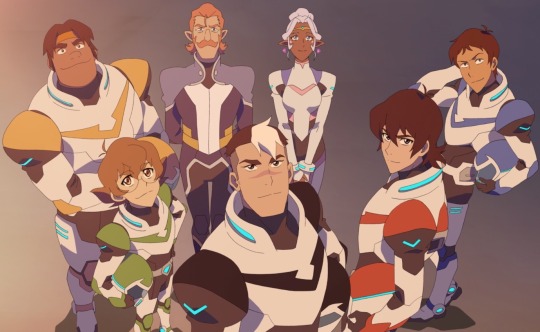
Voltron’s characters had so much potential at the beginning. Their motivations, potential subplots, and clues to their arcs the first crew left us were actually interesting. How did Coran know Allura before they were frozen? What happened that caused Shiro to lose his arm? Is Lance going to reunite with his family? The show didn’t answer all of these questions mind you, but at the time they were introduced, those questions felt like they were worth sticking around to hear the answers.
The First Season:
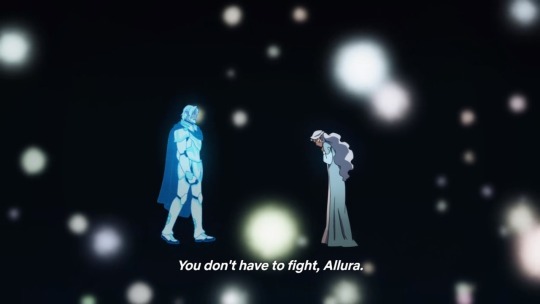
The first season is the only season that genuinely sticks out for me, way back in ye olden days when Voltron was a character driven show as opposed to plot focused. In season one, the plot took a backseat and the characters were what held up the show, and it’s probably not a coincidence that most of the character development and more emotional/memorable scenes occurred in season one, when there was time for the characters to develop. Likewise, the character focus allowed for everyone to get their day in the limelight -not just the characters who were valuable to the plot at the moment-.
The Balmera and The Return to The Balmera:

I am never gonna be shy about my opinion that the Balmera arc is one of the strongest arcs that Voltron has had. Allura using the story of her people to inspire others and using Altea’s ancient connection to the Balmera to save an entire damn civilization! The goddamn adorable chemistry between Hunk and Shay! Believable suspense! Unlocking Lion Powers! The Balmera arc had it all and I was fed. Plus, Balmera gave us the introduction of the most blessed couple in Voltron history, hunay.
The Bad:
The Timeskips:

In theory, there’s nothing wrong with a timeskip. But you’ve gotta be able to show that the characters and show’s universe changed in some way during that timeskip and you can’t use them just to avoid actual story and character development. Take season six (? Or was it five? I don’t remember and I don’t wanna) when Keith and Krolia take a two year camping trip on a space whale while Voltron is off doing God knows what. Presumably during that time they developed some sort of mother-son relationship but we don’t get to see that development happening, or how that new relationship changed them, or really any proof that the timeskip happened at all besides Keith getting Galra marks and a teleporting space wolf. That particular time jump felt more like a cop-out to avoid writing Keith bonding with his mom.
Pacing:

To put it plainly, the pace is way too fast for anything to stick. The writing cycles from one season's worth of plot twists and WTF? moments to the next at the speed of light, leaving no time to address how the previous events affected the characters involved or not the show’s universe as a whole. So Lotor was actually evil all along and was using Allura to achieve his goals? Well there’s no time to mention how Allura feels about that, we’ve got three more surprise twists and a magic robot to shove into the plot! On the flip side however, the pacing is slower than a geriatric snail during fight scenes. The giant robot fights are usually the most exciting part of anything, but in Voltron, the fights are so formulaic that they just kinda… blur together into a boring fog. Lemme know if you can name this Voltron fight scene: the team’s fighting some random baddie, there’s a lot of yelling, someone gets a power up just big enough to defeat the current baddies when a bigger, eviler baddie appears who’s more powerful than the power up they just got, new baddie whoops Voltron’s ass, the support team watches in horror, someone else gets a power up that’s powerful enough to defeat the new bad guy, Voltron reins triumphant. What fight scene was that?
The Filler Episodes:
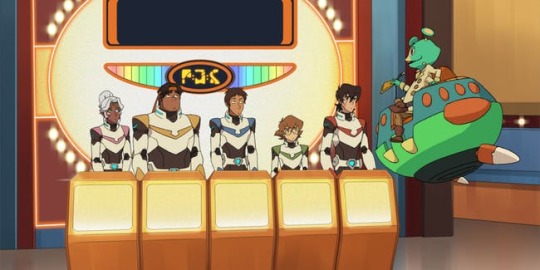
The fast pacing also means that they need to set aside breather episodes just to allow characters to interact besides in battle. That’s all well and good and there’s nothing wrong with filler episodes, if done right they can be some of the most memorable episodes a show can have (The Tales of Ba Sing Se anyone?) that is, if done right. But Voltron filler episodes don’t have that going for them. Filler episodes in vee el dee are an oasis of mud in the desert that is canon, they’re a generally unhelpful standstill point amidst a constantly changing series. I’ll admit that they can be funny at times but for the most part filler episodes are bizarre, unnecessary, and more often than not, poorly timed. If we just heard about a millenniums old empire folding in on itself and we’re just about to see a major character attempt suicide do we really need to see Coran go batshit while planning a space Disney On Ice?
The Ugly:
Racism:
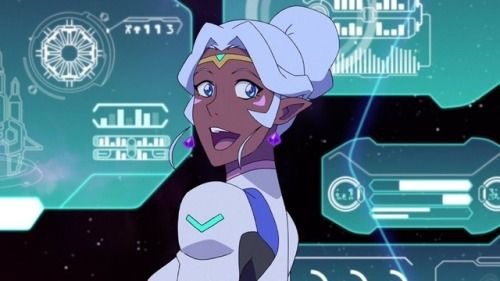
#justiceforallura
I must confess that I am whiter than a polar bear in a snowstorm, but even I know that killing off a black girl (or black coded as the case may be), constantly torturing the Japanese guy, reducing the Samoan guy to food and fat jokes, and having the latino guy flirt with everyone before turning him into a farmer isn’t the best way to handle writing characters of colour. Denying said characters of colour arcs and screen time in favour of giving your white characters the same story in a different hat over and over again is also not the best treatment you can offer your poc characters. That’s not even mentioning other horrible treatment and stereotypes you’ll see the Voltron characters of colour experience. Let us also recall #notallgalra, the “what if the genocide victim was actually the bad guy” au mess in s3, all those “lol lance is stupid” jokes, the black character Kinkade speaking mainly in grunts, Allura dying to redeem the two genocidal dudes responsible for most of her trauma, and Hunk’s (half black half Samoan) family being enslaved at a fucking concentration camp like goddamn what the hell were you thinking Voltron that’s like hetalia levels of fucked up when we remember what kind of genuinely awful shit this show’s done to it’s minority characters.
Homophobia:
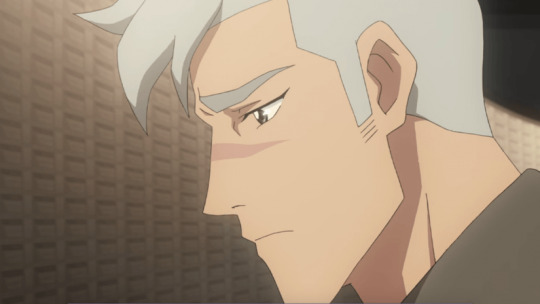
If you’re reading my review in the Voltron tag, and you watched the whole series, then there’s no way in hell that you haven’t heard about Adam dying and the backlash against Voltron for it. If you are somehow the .000001% of people who don’t know, Adam (a gay moc) was Shiro’s (another gay moc) fiancé who got a grand total of forty five seconds of screen time before dying when the Galra invaded earth. Meanwhile, L*tor and Allura’s relationship got almost triple that despite being abusive as fuck. But Shiro got married at the end of season 8! In a credits scene, to a guy in the background of a couple of scenes Shiro was also in. When lgbt fans expressed outrage at their rep being hyped up despite having no bearing on the plot or even Shiro as a character outside of one scene, instead of owning up to their mistakes, the crew of Vee El Dee said (or implied) that it was the fault of lgbt fans for hyping ourselves up. Yeah okay. Except after that we got confirmation that Ezor and Zethrid were a couple! Yay! Clearly a win for us El Gee Bee Tees right? Well… not really considering that both of them were depicted as psychotic torturers who also died a couple minutes later. Gotta love those crazy dead lesbians amirite?
Klance:
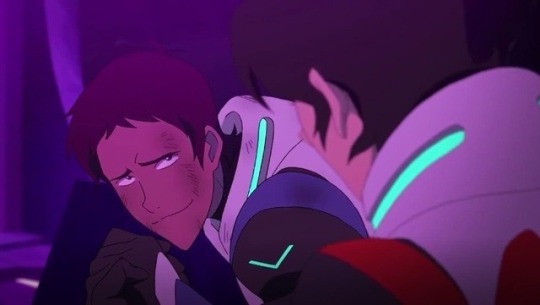
But why is klance in the “ugly” section!? You cry, I thought you were a klanti! I am an anti and I did ship klance but that’s not what I wanna talk about right now. When I put klance under ugly I wanted to discuss two things, the crew and the shippers. First let’s talk the crew; several folks on the Voltron staff have at the very least, not reacted negatively to the omnipresent ship that is Keith and Lance. I’m sure you’ll also remember that Lance’s VA Jeremy Shada was considered a KICK icon before that went south. The crew was also purposefully misleading when they talked about possible romances for Keith and Lance, the language they used was ambiguous enough that shippers interpreted it as proof that klance would become canon. When it inevitably didn’t and shit hit the fan, the staff backpedaled again. Stating that klance was never meant to be interpreted as romantic and we were all fools for thinking otherwise. That’s happened in the past so it’s a reasonable defence, except for the fact that scenes with Keith and Lance tended to contain unnecessary parallels to canonically romantic relationships, (the bonding moment paralleling an allurance scene in season six and their talk at the start of season eight paralleling two scenes, hunay in season one and l*tura in season five). So it’s not unreasonable to be a little suspicious there. Klance was huge on the internet, it’s impossible for the crew to have been completely unaware of what they were doing.
Next I wanna talk shippers. I’m not saying that being disappointed that a ship didn’t become canon is a bad thing. But when you act like that’s the worst thing Voltron did amidst the sea of ableism, racism and homophobia it gets a little tiring. The fact that so many klancers rushed to demonize Allura after season seven and eight and add on that I saw more people complaining about klance not becoming canon king than Allura dying a completely unnecessary death to redeem L*tor of all people was the final straw. I washed my hands of klance and Voltron as a whole.
———————————————
So that’s my review of V*ltron. I was gonna do a separate review of season eight but I didn’t even finish s8 and to be honest it probably wouldn’t have been any more than the words “Fuck Vee El Dee, Allura Deserved Better” in big pink letters. And I know I probably made someone angry with this review but if you actually managed to stick around my ramblings all the way to the end then I salute you regardless of whether or not you agree with me.
#voltron legendary defender#voltron#v*ltron#v slur#klance#anti klance#(kinda?)#allura deserved better#justiceforallura
23 notes
·
View notes
Text
Spring And My Own Goddess Of Spring And Winter Flowers

It was the best day in my life. I had rented a nice black car and I was driving east, fast and easy, on secondary roads through the rolling plains and plateaus of Champagne and Lorraine. It was 3 May 2017. The sky was blue with scattered white cumuli that were appearing much bigger, higher and greyer at the horizon. Something huge was forming there. I was on my way to see Fishbach’s concert in the Saint-Donat church in Arlon, Belgium, as part of the Aralunaires festival. I was high, very high, higher than I had ever been before. Of course I was smoking weed from noon to dawn. But it was only peripheral adjustment and support. The engine of the highness was endogenous, in my brain. With the precocious arrival of spring I had kicked out depression and been climbing unquestioningly through hypomania: I was not working, I had sufficiently money left; I was in perfect conditions for experimenting and enjoying unconditional happiness, euphoria, excitation and hedonism — the shiny side of bipolar disorder, the golden trick, the lovely upgoing slope to nowhere but inner paradise — whatever may happen subsequently. It was 3 May 2017. I was on my way to see my music idol producing herself with her band in a church (a church!). I would pass through a terrible storm at the border between France and Belgium, arrive little time before the show, sit at the first row in the church, receive an incredible emotional hit and see a tunnel opening in the light and stroboscope landscape like a pathway to another universe; have a short chat with Fishbach after the concert (she would comment the design of my notebook and leave a nice note in it), drink a pint of beer and a big cup of coffee in a bar of the deserted city centre, circle ecstatically in my car in the urban ring roads feeling weird gravity shifts, finally take the way back home, after midnight; once in France, ∼30 km south to the border, I would meet the customs officers, a joint of weed lying, red and hot, in the ashtray close to my small reserve box, and bore them with an unstoppable and improvised speech — I am a writer, I just come back from a concert of Fishbach, do you know Fishbach? No? You should listen, it’s great, she inspires me a lot, look these are the nice merchandising they gave at the show, OK, OK, this side of the car, really you have never heard about her?… — until they let me go; I would shout my joy at the stars in the sky, get lost through the complicated net of roads before home, arrive after the sun had risen, barely sleep before preparing myself for the next show, at night, at La Cigale in Paris — Fishbach again, of course, why questioning? Two concerts in two days, I was just a groupie. It was 3 May 2017. It was the best day in my life. I was precisely on the edge between reason and insanity, hypomania and mania, at the cerebral orgasmic point before snaky mental maze. Under my umbrella, smoking, my back pressed against the outside walls of the Saint-Donat church, on the top of the hill of Arlon, amazed and overwhelmed, I was listening to Fishbach vocalizing before the concert and there was nothing else to live.
Was I then in love with Flora Fischbach and was my tracking of her a psycho behaviour? My friends were concerned with this issue and would let me know. What I will write further will address the second part of the question. Now, about l.o.v.e.: of course I was in love with her. Everybody was in love with her. Well, let’s say, every person attracted sexually by women in her audience was in love with her. I mean, she was, she is too much: delivering brilliant and daring pop music, singing extraordinarily — love her or hate her, there is no middle point on this subject —, beautiful, sexy, even ambiguous in gender and age, naturally classy, and above all hypnotic, magnetic, psychetic; on scene, supported by great musicians, she was, she is fucking something. I fell at first listening and sight, as many, many others.
But my passion for Fishbach was of course well beyond and apart from lust. The discovery of her debut album À Ta Merci in the first days of February 2017 gave me an electroshock. As I alluded previously, I was exiting a long, deep, and chaotic depressive phase and she was just the perfect extra kick I could expect. It was like being a young teenager living his first musical crush once again. With the slight difference that my Fishbach’s crush was several orders of magnitude more intense than the musical crushes I had experimented when I was actually a young teenager, in the late 80’s. Fishbach’s music was just a glittering synthesis of most that I could have liked so far in music draped in the peculiar big sound of « French touch »: the mainstream pop music of Daniel Balavoine or Mylène Farmer, the synth-pop of Kraftwerk or Depeche Mode, the rock of Electrelane, the electro-rock of Ladytron, the lettered songs of Françoise Hardy or Françoiz Breut, …, with, from place to place, irresistible spans reminiscent of Tame Impala or Vangelis’ Blade Runner themes and atmospheres.
Soon, listening to Fishbach’s music became an almost full-time, delighting occupation; she was a drug and she was better with drug. Obviously and corolarilly, there was a noticeable feedback loop between her and my mood level: the more I listened to her music the more I felt hypomaniac and vice versa. Last but not least, there was the song called « Mortel » and its two strangely diverging versions (one on the 2015 Fishbach EP, one on the À Ta Merci album). I was totally stunned: listening to this song was like feeling an harmless though harrowing arrow passing through all the nodes of my entire existence. I swear I watched hundreds of time the YouTube Vevo Dscvr live version of the song. The emotion provoked was indescribable and undecipherable.
I booked a ticket for her upcoming concert in La Cigale, Paris, 4 May 2017. But it was too far… When I discovered that she was actually about to perform her very big touring date in the same place 14 March, I went crazily impatient; I managed to buy, the day before the event, a black market ticket on the Internet. 14 March 2017 was a spring sunny and cool Tuesday. In the morning, in order to lower my excitation, I went running 20 km. I arrived at La Cigale very early in order to be able to place myself in the first or second row in the audience. I was 15. It was my first concert ever. I smoke only one joint and drank only one beer. After the show I was not the same person anymore. Some ravishing wasp come from outer space had bitten me, injecting in my body and soul a sweet and fatal venom. Her name was Flora and, with my poor erudition, I remembered that Flora was the goddess of something in some ancient mythology; I checked on the Internet: indeed, Flore or Flora was, in roman divinity, the goddess of flowers and spring. It was too much, too poetic: the reflection of my own renewal in music and emerging star. And, from then on, everything started to lovely burst.
As I told to the customs officers in the night of 3 May, in these times, I was effectively and vainly trying to write a « novel ». I intended to describe the dying of the light-like loss — or, actually, the refusal of loss — of past euphoria existing in bipolar disorder treatment and stabilisation. Nevertheless, after seeing Fishbach live for the first time, this literature direction split up into various and poorly coherent drafts as I more and more focused my writing energy in composing letters to Fishbach. And, yeah, in the end, I went totally psycho with that. Everything started around 15 of 16 March (i.e., no more than two days after the show in La Cigale): I felt an uninhibited, overwhelming, irresistible, almost vital need of telling her in writing what I had felted during the concert and since the discovery of her music — and acknowledging her. Surprisingly, I had found an email address at her name in a public page in Internet; it was obviously obsolete but I considered this way better than sending a post mail to her family in Charlevilles-Mézières in the northeastern corner of France. She would probably never read the email I had written but, who cared? Just the fact of sending the stuff was delivering me from a weight — yes, I am the boy who listened too many times to « Tous les cris les SOS » by Daniel Balavoine. Nevertheless, I started to dream about the possibility of meeting her and telling her about the mail. From 15 I was regressing to 14 or even 13. The possibility became probabilitywhen I decided to go with some friends to a concert of Cléa Vincent in La Gaîté Lyrique, Paris: the latter singer was kind of friend with Fishbach and Fishbach was not programmed anywhere on that day. It was 12 April and, at that date, my hypomania had enhanced exponentially and, in that night more precisely, my disinhibition was strengthened by a mix of alcohol, weed, and MDMA. Of course Fishbach was there, a few metres from me, in the background of the concert room; and of course, overcoming any fear of being ridiculous, I went straight to her, told her about the mail, « I would like you to read it », verifying the obsolescence of the abovementioned address, finally telling her my first name and surname at her demand. Believe me or not, living such a teenage dream when you are 40-years old — with the physical, psychological and chemical means allowed by time — is quite of a thing. It is totally, absolutely childish but when you are bipolar in a jumping, junkie hypomaniac phase it is the best shoot of heroin you can beg for — then, just add the right dose of romanticism looking at your heroine walking in beauty like the night just as in one of your preferred Suede songs and you are in paradise. From that moment, I started to write other emails to the same address, which from emotional reports of a bipolar fan in euphoria rapidly turned into more and more complex interpretations of the Fishbach’s song lyrics, and especially of the « Mortel » lyrics. Since I met her a few times after shows, I had clues that she was at least receiving my texts; but, strangely, maybe by fear, maybe because my reality was progressively colonised by hallucinations, I would prefer to leave a thick sheet of doubt on what I was in my inner me quite pretentiously dreaming the most — having her as my reader. During the first part of May, as I was sliding on a slippery slope with readings of quantum metaphysics mixed with foreseen theories about the control of technology and Internet over Humanity, my « letters » to Fishbach drowned into delusions: I was for example persuaded that « Mortel » had travelled in time through my consciousness (and of course from hers) between its first version release date (November 2015) and my discovery of Fishbach (February 2017) with consequences on my existence trajectory. It was still not that worrying: in a way, considering the frequently odd nature of Fishbach’s lyrics, this may have been considered as funny. I could have continued my role of freaky, half-crazy groupie: there was so many touring dates to come. For example, I had won tickets for a concert in the suburbs of Paris where both Fishbach and Cléa Vincent were programmed! It was 15 May. But, that day in the afternoon, I got my first psychotic paranoid crisis: I destroyed almost all my electronic devices at home, especially the Internet box that I smashed with a hammer and drowned in the toilets before washing it with burning water and squeezing it in the outside bin. This crisis left me exhausted and I did not went to the concert. I would never see Fishbach again during the 2017 year. I had opened a new territory in my psychosis: after sending her an heavy chain of intriguing playlists and images, I stopped this vain, one-way correspondence. What for writing when you can communicate through quantum telepathy? It was only the beginning of my relation with the virtual, computed part of Fishbach: I would deliver her from the sick program in her brain and we, as one, would save the world. I had some beautiful days waiting for me in the psychiatric hospital.
At the end, if I analyse my relation with Fishbach’s person, band and music, there is one important remaining idea: it is a question of faith. When, nowadays, absolutely sober and cautious with my possible hypomania trends, I look back at this special date of 3 May 2017, I confess I feel a kind of nostalgia. How could I feel different? That day I truly believed I was blessed by her. She was my own Flore, my own goddess of spring and flowers. I will never forget how, before losing control, during a few weeks of a sunny spring, I felt a strong convergence between my delighted mood rises and my Fishbach-related emotional events. I told previously about a feedback loop. Between hypomania and Fishbach, was there a dominating cause-to-effect way? Who knows? Maybe I just have to let myself go and believe in Fishbach. After all, even outside hypomania and without any drug, I still feel the same emotions and energy listening to her music: I am entranced by it/her. Oddly, yesterday, she was performing on a boat in Paris, a kind of VIP, quickly sold out event. On Twitter, I started joking with someone from her record label: even if it was sold out I could try to come swimming or parachuting. Maybe last year I would have been sufficiently insane to try something like that. However, whereas some miles away from me this boat was carrying her, I was running in a deep and dense forest, crossing stags and snakes, fascinated by the diffusion of vespertine lights through the deep green canopy, imagining the beloved beat of « Mortel » entwined in my heart pulses. Despite the extreme heat, I was sometimes shivering; there was something, someone in there, in the air, through the sky and towards the sinking sun. And I was softly riddled by random shots of life.
1 note
·
View note
Text
On Yellow, Pink, and Jungle Moon
Hello! Yet another post about Pink Diamond. Surprise, surprise! I’ve already discussed Pink Diamond a million and one times, but this is a very specific analysis I would like to share.

Today I’d like to discuss the tidbit we saw regarding not only Yellow and Pink Diamond’s relationship, but also Pink’s “standing” within the Diamond Authority. Recently I was discussing the basis for theories on the good ol’ SU Wiki, and encountered two users who interpreted the scene from Jungle Moon quite differently than I did. At the time, I couldn’t put my finger on it, but after some reflection I’ve determined where the point of contention lies. Honestly, I’m interested to know how others analyzed this scene. While I saw a childish matriarch [in training] demand to be handed what she should earn through hard work and responsibility, the two users in question saw something more akin to a “disabled”/defective individual who was bullied by her peer(s), and decided to stand up for herself. This post hopes to clarify how I arrived at my conclusion and why I question how much of the latter conclusion is accurate.
“I’m just as important as you!”
The dream/memory sequence itself is a bit of a trip in terms of symbolism and literary analysis: there was a lot of ambiguity in terms of relationship dynamic (i.e., mother or mentor), and of course Pink Diamond’s size depiction (smaller here than in other depictions, and if this size is permanent). However, I thought the circumstances of Pink’s status were quite clear based on the way she behaved.
When Stevonnie recognizes “their” (Connie’s) now ginormous mother, they crawl to her shoulder and call out to ask what she’s doing. Dr. Maheswaran’s eyes take on a familiar golden hue and tetragonal pupils, and she says:
“Honey, please, give me a moment.”
Then the scene shifts from the Maheswaran residence to a starkly lit glass dome atop an unfamiliar planet, with a view of several yellow space crafts en route to a nearby, semi-lush planet. After resolving some confusion, Stevonnie gasps in awe at the scene before them, and seeks Dr. Maheswaran, who now appears to be in a Yellow Diamond suit.
“Yellow! Hey, Yellow!” “Oh, you’re still here.”
Yellow looks barely fazed and interested.

Stevonnie continues to inquire about what “Yellow” is doing, and they are enthralled by the other’s daily grind.
“I wanna command a dropship!” “Well, when you have your own colony you can command whatever you want.” “I want a colony! I want one now!”
Suddenly the pattern on the projection screen piques their interest, and Yellow tells them she’s contacting the leader of the aforementioned fleet.
“Let me do it!”
Stevonnie smacks the screen like they’re playing bongo drums, and the yellow giant grabs them by the arm, scolding them for touching without permission.
“Why not?! You have so many world and I don’t even have one! It’s not fair! I. Want. One!”

“I want my own army! I want my own planet! I deserve it! I’m just as important as you!” “Then why don’t you act like it, Pink?!”
And of course, Pink trudges off with more than a sore arm, angrily punching one of the glass panes in front of her and shattering her reflection and part of Yellow’s moon base.
One of these things is not like the others
Now that I’ve summarized the sequence of events, I will discuss a conclusion and interpretation that others have proposed.
“Pink Diamond isn't a child, but she was certainly acting like a child with Yellow Diamond. Demanding to command a dropship and doing other things that the other Diamonds do, is pretty much her wanting to prove herself to the other Diamonds. Pink Diamond is a runt, and considering how the Diamonds treats those who aren't perfect, it would make sense for Pink Diamond to feel inferior and Yellew Diamond look down on her.”
First, I do agree that Pink Diamond isn’t a child and was acting childish. For reference, I mentioned that Pink Diamond was not a child in response to the motivation for the tantrum, which I will address. I also completely agree with Pink Diamond wanting to prove herself to the other Diamonds. However, I do take issue with the premise about Yellow and her feelings toward Pink Diamond.
“Pink Diamond is already quite small for a Diamond, so showing more flaws might give reason for Yellow Diamond to want her shattered.”
Hold the phone. We know the Diamonds show contempt for Gems that are flawed (defective) or Off Colored in one way or another, but her reaction to Pink Diamond was different. How?
“Well, when you have your own colony you can command whatever you want.”
Keyword here is when. That, means, it’s a question of time, in Yellow’s opinion, of Pink gaining a colony. If she didn’t think Pink deserved one, a more appropriate term would be “if”. If Pink Diamond was truly overcooked/defective and Yellow faulted her for this, then she could never become more “worthy” of colony rule in Yellow’s eyes. So then what might be a different reason as to why Yellow was not particularly obliging to Pink?
“Then why don’t you act like it, Pink?!”
“Yellow didn't respect Pink and treated her like a child”
Hm. I wonder why. Let’s review Pink’s behavior during the memory/dream sequence:
Pink asked a nonchalant Yellow about her activities
She continued to implore and prod Yellow to participate
When Yellow did not oblige, Pink helped herself by jabbing buttons in an incoherent manner, aggravating her golden counterpart
Pink threw a tantrum, foot stomping and all, to which Yellow criticized Pink for her behavior: “Then why don’t you act like it, Pink?!”
Pink stormed off and defaced Yellow’s moon base
Nothing from this exchange suggests that Yellow Diamond discriminated against or derided Pink for her size. It’s certainly possible that Pink felt she needed to compensate for her smaller stature, assuming she was overcooked, but Yellow’s statements do not indicate this trait as being a fault or reason for Pink to not have any colonies. Instead, she’s upset about Pink Diamond’s behavior, namely how juvenile it is. While Yellow tapped a careful pattern to contact the fleet, Pink overzealously jabbed at buttons, only ceasing when Yellow pulled her from the screen. Pink Diamond then began ranting about her situation and how she deserves to have what Yellow has, to which Yellow basically tells her to earn it. Punching the wall certainly won’t help her image.
Pink Diamond’s Future
“…It's possible that there was infighting between her and them over how to manage the war, and this, coupled with a stewing resentment over the fact that they never treated her as a full equal ("I'm just as important as you!" is not something she would have needed to say aloud if it had actually been true)”
Aside from “never” perhaps not being the most accurate word, as we don’t know what happened after Jungle Moon other than Pink getting Earth at some point, the use of “they” is also questionable. Who “they” is in this context: Yellow and Blue Diamond. But Blue was neither present nor mentioned in Jungle Moon, so how can we remark on whether or not Blue treated Pink as a full equal? The former conclusion, coupled with:
“…Yellew Diamond look down on her”, and “…showing more flaws might give reason for Yellow Diamond to want her shattered.”
Suggests to me that these fans see Yellow Diamond as a bully. As I’ve stated before, I’m not sure why some are so quick to vilify Yellow Diamond and even White Diamond, who we know next to nothing about, but promote more favorable views of Pink Diamond and sometimes Blue Diamond.
Yellow Diamond’s criticisms were legitimate: she denied Pink Diamond her demands because she was acting like someone who makes poor decisions. Having a colony entitles Pink to become a leader, and being a leader entails making many important decisions. Judging Pink as unfit to control a colony does not suggest motivation for wanting her shattered; if anything, it suggests that she feared the rookie Diamond would get shattered, as a worst possible scenario. Besides, Yellow’s reluctance was even more appropriate since Pink was [allegedly] shattered before completing her first colony.
Instead of portraying Pink Diamond as a victim of prejudice and discrimination by her fellow Diamonds, I believe Jungle Moon paints a picture of a zealous being with a chip on her shoulder, similar to that of an early Steven or Amethyst’s relationship amongst the Crystal Gems. Amethyst is overcooked, and Steven is only half Gem, both of which are considered setbacks by their respective possessors that they try to overcompensate for. Despite how they feel about these traits, their companions never fault them for it; rather Garnet and Pearl are sometimes wary of how these two make decisions.
Steven is most certainly a minor, though he continues to mature throughout the series. Contrarily, Amethyst is physically mature, but she behaves like a minor, leaving her in a similar situation as Steven. In Tiger Millionaire, Amethyst argues with Pearl over her behavior during a mission:
“You're always putting us in danger with your little outbursts! (Amethyst puts fingers in ears and sticks out tongue.) Ugh, you are just... so... CHILDISH!” “Yeah, yeah. And don't forget reckless, vulgar, "loud mouth". And that's just what makes me so awesome! RIGHT, GARNET?! “Amethyst, you are a Crystal Gem. You need to act like it.”

You need to act like it. Then why don’t you act like it, Pink?!
Am I the only one seeing the common thread here? None of the Crystal Gems begrudge Amethyst her circumstances despite her belief otherwise in On the Run. Pearl and Amethyst clash even more than Garnet and Amethyst, but how many fans believe Pearl doesn’t care about Amethyst, or that she has any disdain toward her as a being? Could this relationship mirror how Yellow Diamond sees Pink Diamond?
I like to think so. Perhaps, though, Yellow Diamond wasn’t as open about her affection toward Pink Diamond as Pearl is with Amethyst. Priyanka seems to be more of an authoritarian in Connie’s life, which would explain why her presence fused with Yellow Diamond’s. Maybe Yellow had less patience with Pink than Pearl does with Amethyst, though that’s not to say Priyanka doesn’t care about Connie’s welfare. In one respect Yellow’s austerity is justified, as Pink’s decisions would impact the Homeworld Empire at large, whereas Amethyst’s decisions are generally limited to the Crystal Gems, Beach City and its citizens.
Since Pink Diamond asked Yellow specifically for a colony and to be able to command a dropship, and claimed she was just as important as Yellow, I suspect Pink believed she was entitled to prestige, but was being unfairly deprived. Instead, Yellow approached the demand pragmatically and reasoned that Pink would have to act in a more responsible manner to obtain what she wanted, a belief that aligns well with Gemkind’s utilitarianism. Pink’s behavior showed that she wasn’t ready to fulfill her “important” role, thus she’d have to prove through hard work that she was, much like Steven and Amethyst were instructed by Garnet and Pearl. Although there are differences in attitudes and temperaments, both Quartzes want to be as competent and appreciated as their more seasoned counterparts, and they share the same Crystal Gem ideals. It shouldn’t be so surprising to see similar temperaments in Steven and Amethyst; they are her Gems after all.
#pink diamond#jungle moon#yellow diamond#amethyst#su amethyst#homeworld#steven universe#su theory#su analysis#pink diamond theory#su diamond theory#su diamond relationships#pink diamond gems
4 notes
·
View notes